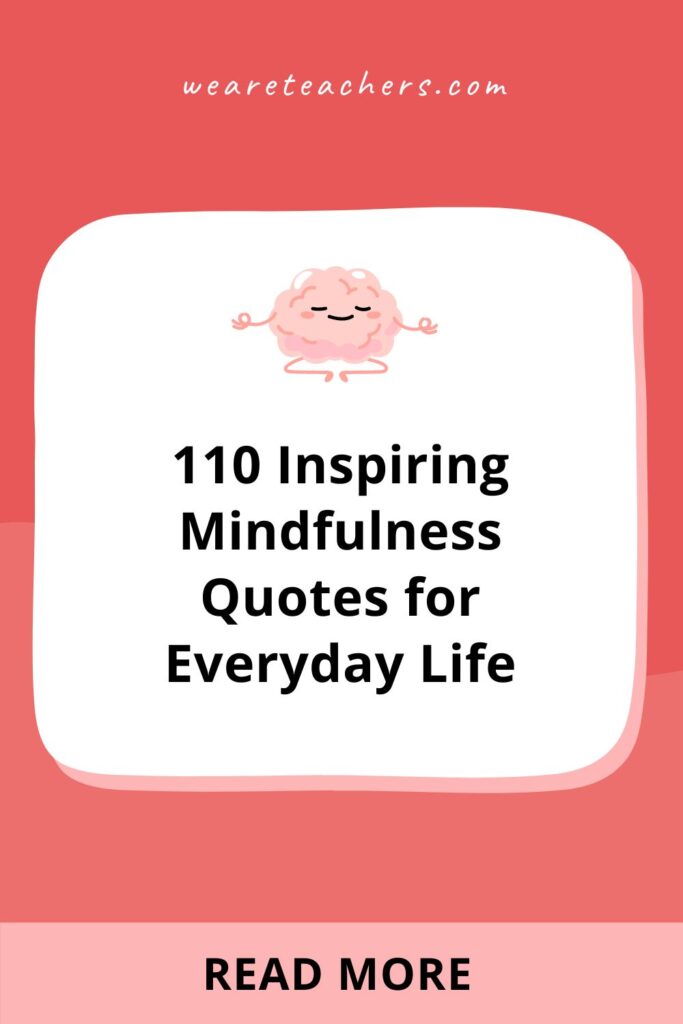Mindfulness is more than a buzzword. It’s a valuable practice we can use to live more fully in the present moment, without dwelling on the past or worrying about the future. It definitely takes work to become more mindful, but putting in the effort can change our lives for the better. Want to give it a try with your students or yourself? We’ve put together this list of mindfulness quotes to inspire you to focus on what really matters.
The Science of Mindfulness and Mindfulness Quotes
What exactly is mindfulness and does it actually work? According to Mindful, “Mindfulness is the basic human ability to be fully present, aware of where we are and what we’re doing, and not overly reactive or overwhelmed by what’s going on around us.” Of course, focusing on what’s happening in the here and now can be challenge. With practice, however, we can reap serious benefits using mindfulness.
Over more than 40 years, studies have shown that mindfulness can reduce anxiety and depression, improve immune function, protect our brains from decline, boost mental clarity, promote heart health, and even slow cellular aging. Mindfulness meditation may even improve self-regulation of chronic pain and decrease pain sensitivity.
And this is just the tip of the iceberg. The research is clear about the positive impact that mindfulness and mindfulness quotes can have on our daily lives. For a deeper dive into this topic, check out resources such as the UMass Memorial Health Center for Mindfulness, the American Psychological Association, and Dr. Richard Davidson’s incredible breakthroughs at the Center for Healthy Minds.
In addition to reading these mindfulness quotes, you can also use apps such as Insight Timer and Calm to bring more mindfulness to your day!
Mindfulness Quotes for Everyday Life
1. Mindfulness means paying attention in a particular way: on purpose, in the present moment, and non-judgmentally. — Jon Kabat-Zinn

2. With mindfulness, we are learning to observe in a new way, with balance and a powerful disidentification. — Jack Kornfield
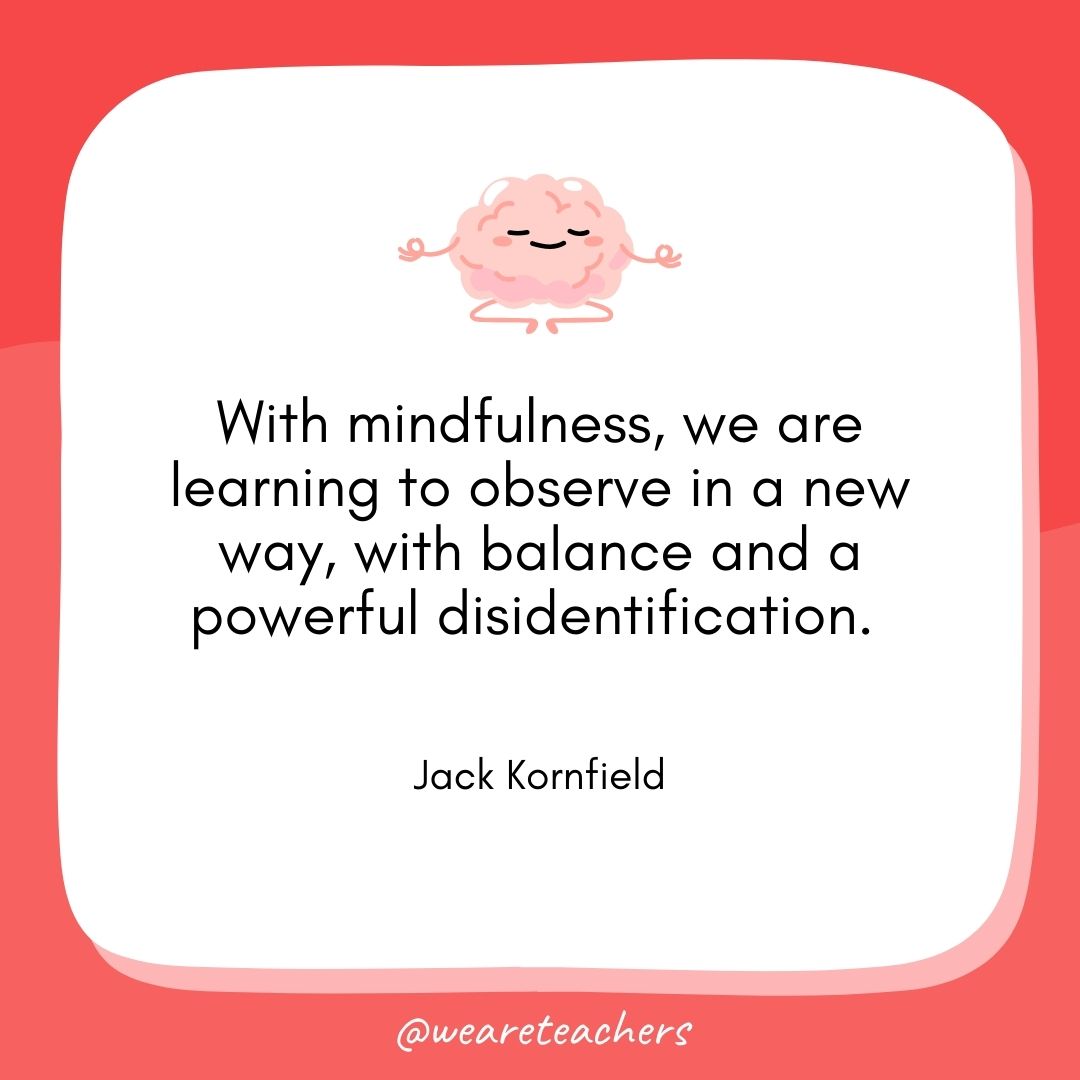
3. You can turn just about any simple act into a practice of mindfulness, and it will nurture and nourish you; it will start your day off in a positive way. — Mariel Hemingway
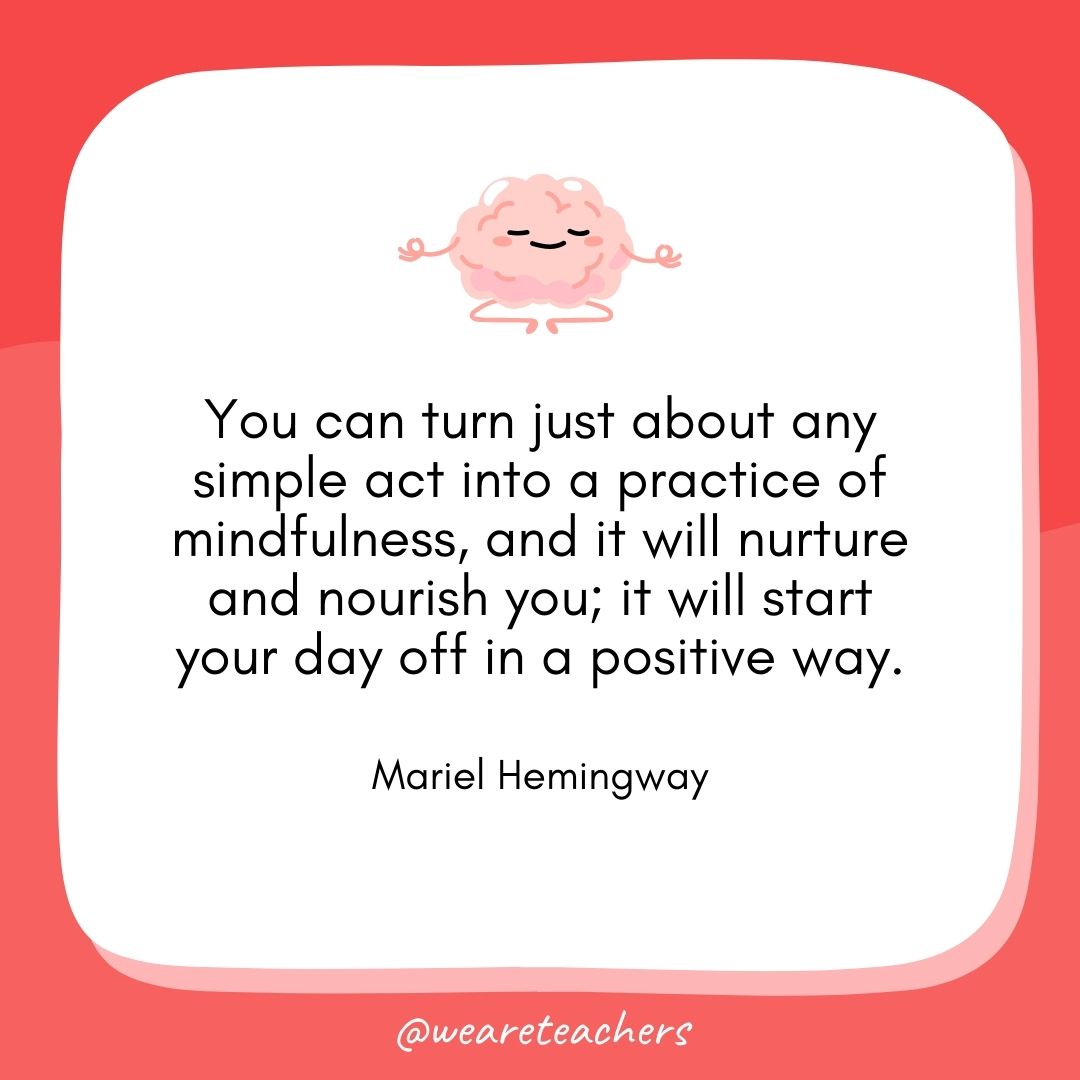
4. When we hug, our hearts connect and we know that we are not separate beings. Hugging with mindfulness and concentration can bring reconciliation, healing, understanding, and much happiness. — Nhat Hanh
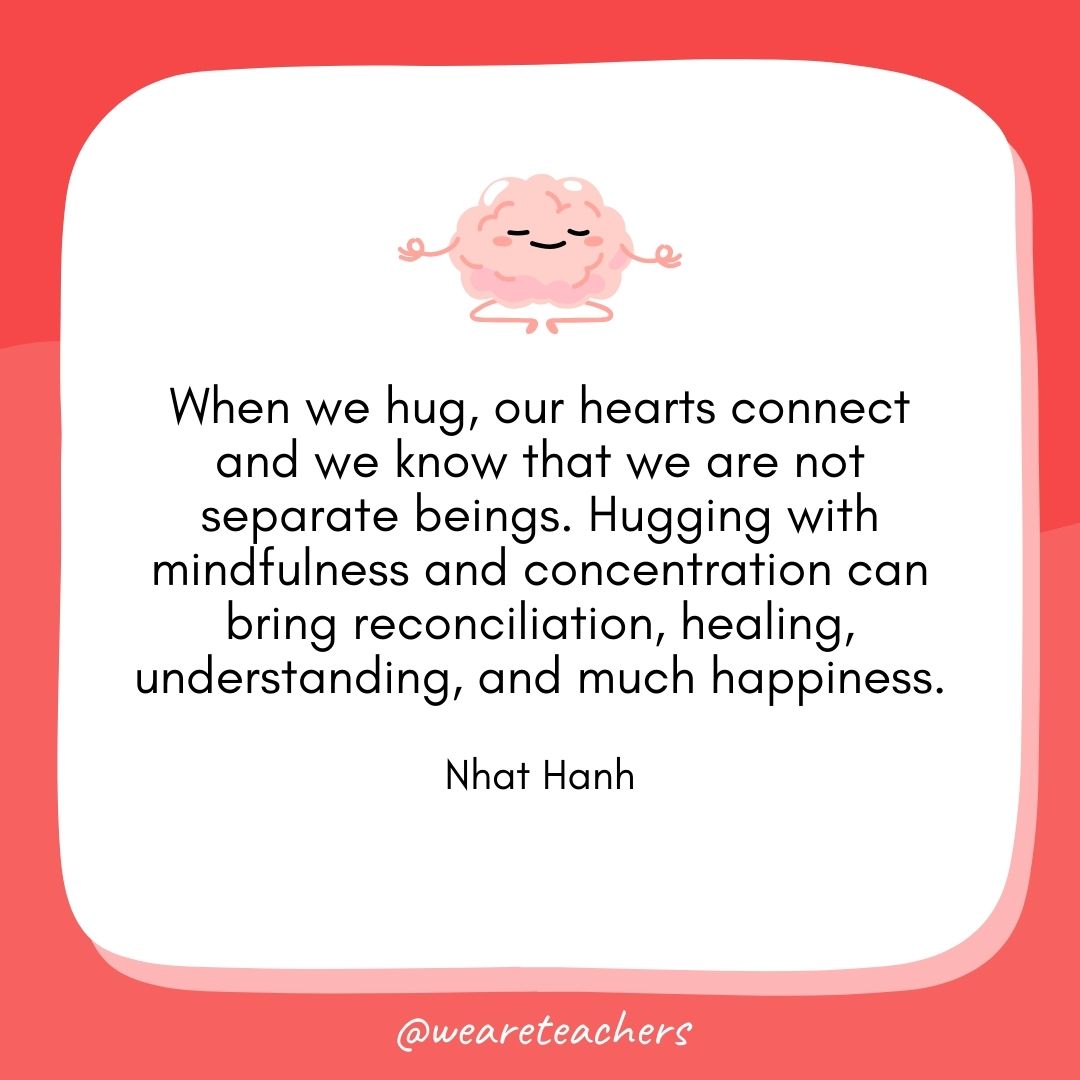
5. Concentration is a cornerstone of mindfulness practice. Your mindfulness will only be as robust as the capacity of your mind to be calm and stable. Without calmness, the mirror of mindfulness will have an agitated and choppy surface and will not be able to reflect things with any accuracy. — Jon Kabat-Zinn

6. Mindfulness, though so highly praised and capable of such great achievements, is not at all a mystical state, beyond the ken and reach of the average person. It is, on the contrary, something quite simple and common, and very familiar to us. — Nyanaponika Thera

7. Mindfulness does not mean pushing oneself toward something or hanging on to something. It means allowing oneself to be there in the very moment of what is happening in the living process—and then letting go. — Chögyam Trungpa
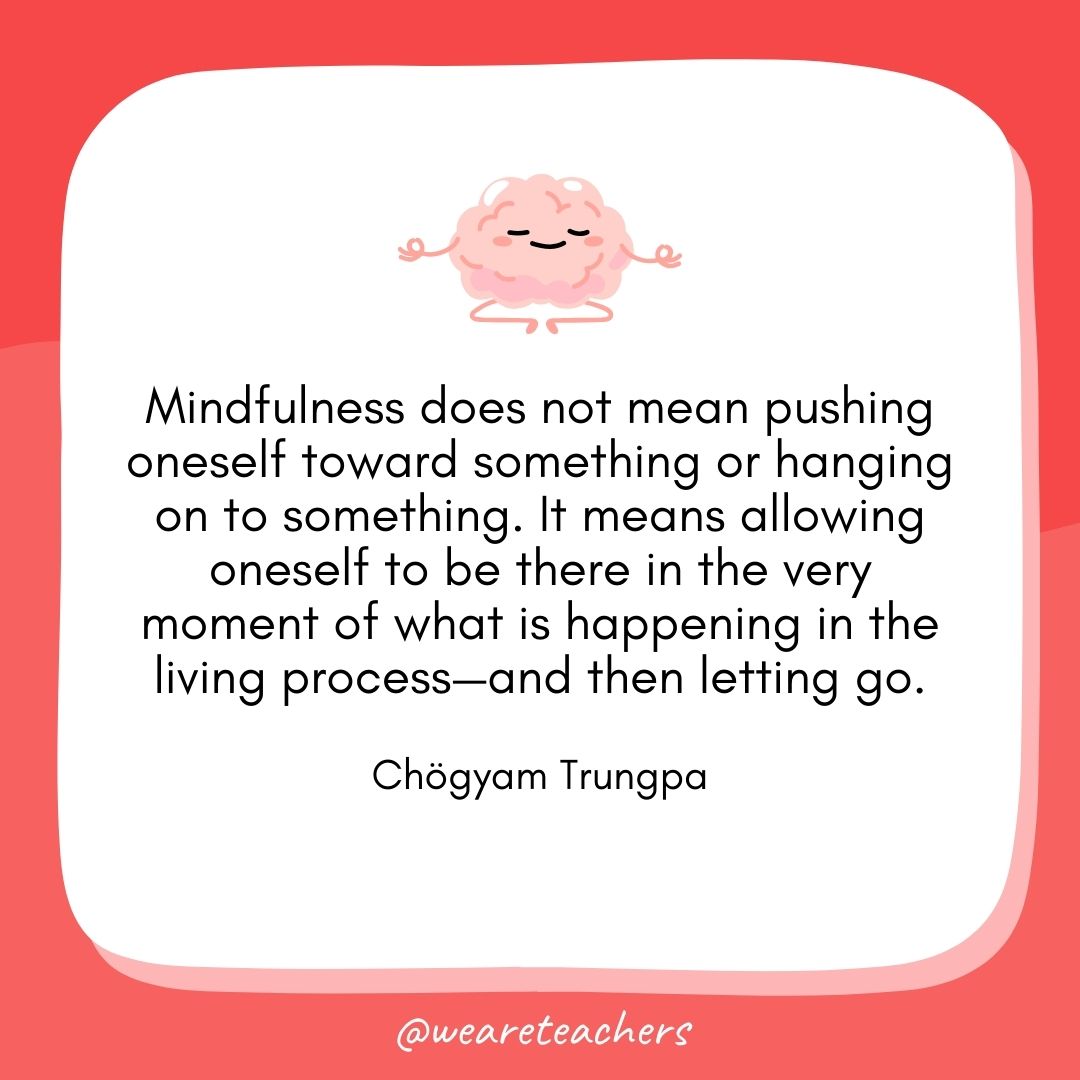
8. Mindfulness is the aware, balanced acceptance of present experience. It isn’t more complicated than that. — Sylvia Boorstein
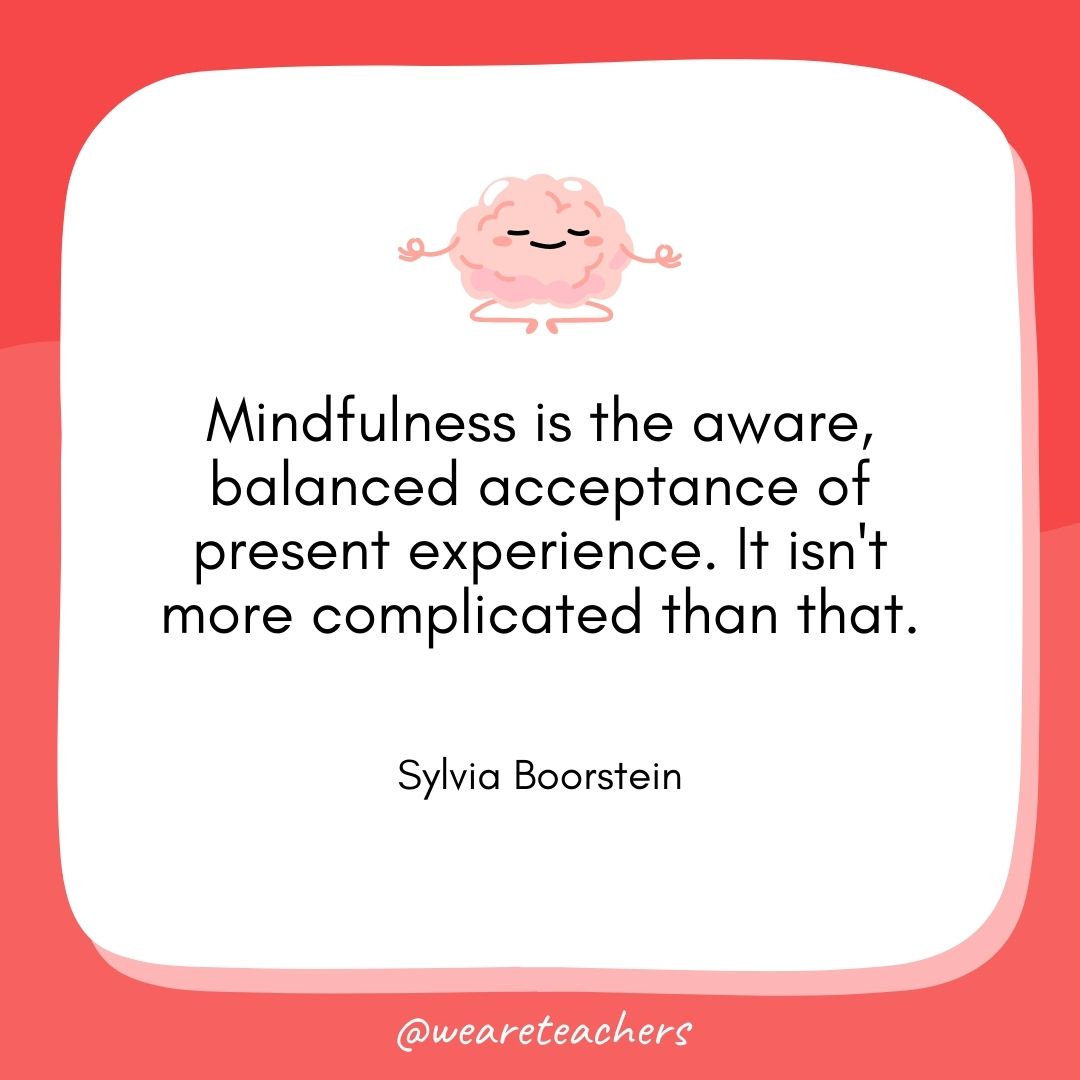
9. In mindfulness one is not only restful and happy, but alert and awake. Meditation is not evasion; it is a serene encounter with reality. — Nhat Hanh

10. Listening continuously and taking notes for an hour is an unusual cognitive experience for most young people. Professors should embrace—and even advertise—lecture courses as an exercise in mindfulness and attention building, a mental workout that counteracts the junk food of nonstop social media. — Molly Worthen
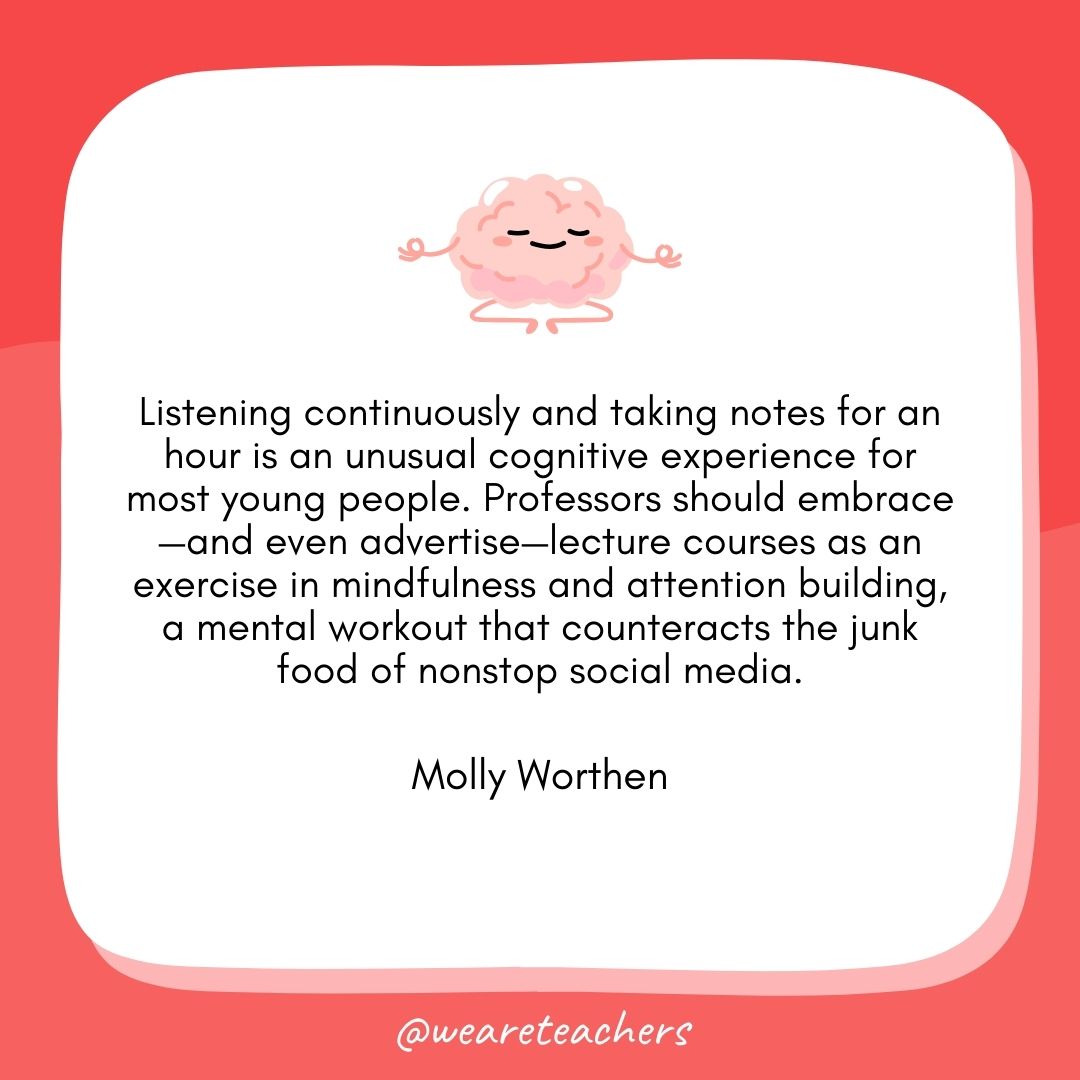
11. Mindfulness helps us freeze the frame so that we can become aware of our sensations and experiences as they are, without the distorting coloration of socially conditioned responses or habitual reactions. — Henepola Gunaratana
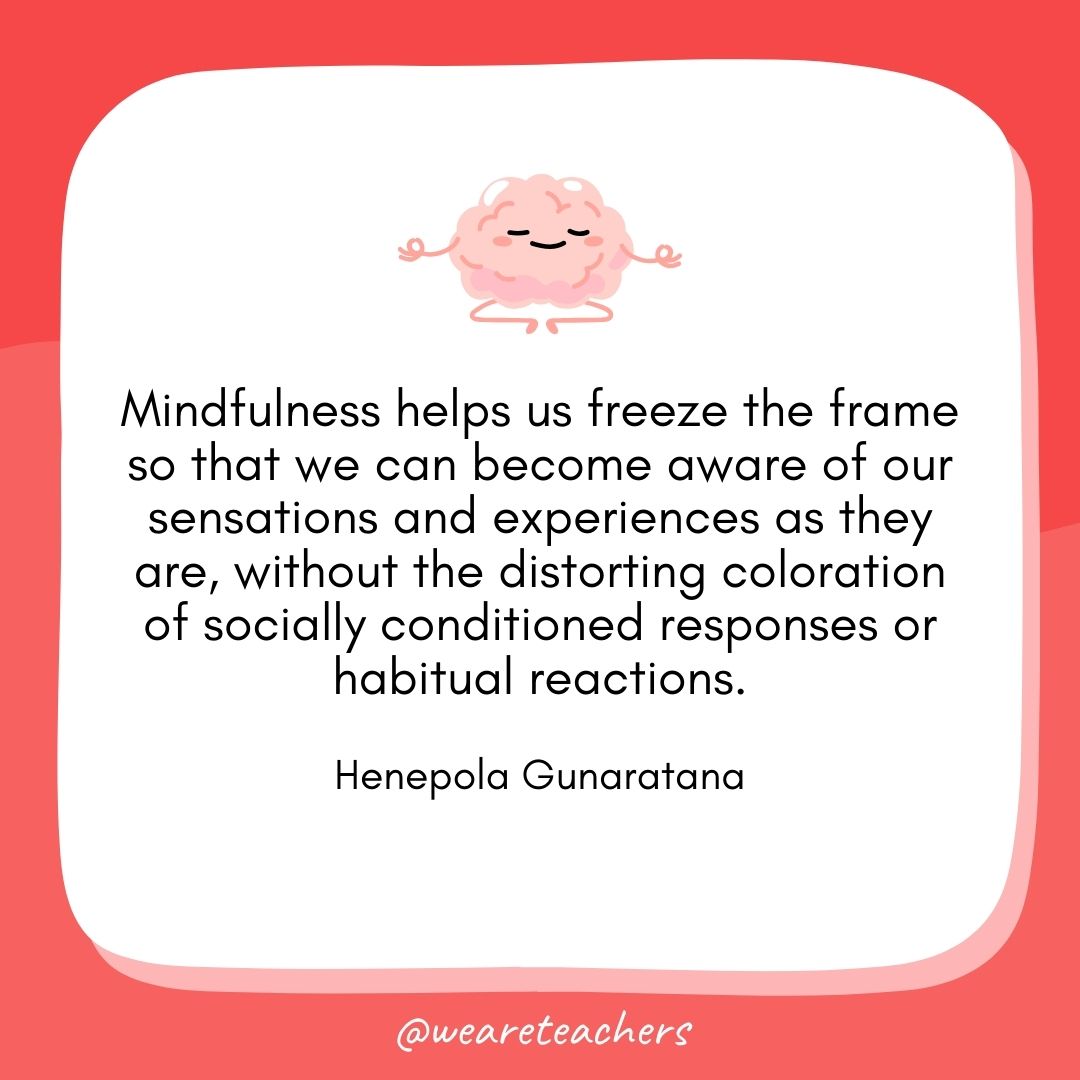
12. Mindfulness means moment-to-moment, non-judgmental awareness. It is cultivated by refining our capacity to pay attention, intentionally, in the present moment, and then sustaining that attention over time as best we can. In the process, we become more in touch with our life as it is unfolding. — Jon Kabat-Zinn
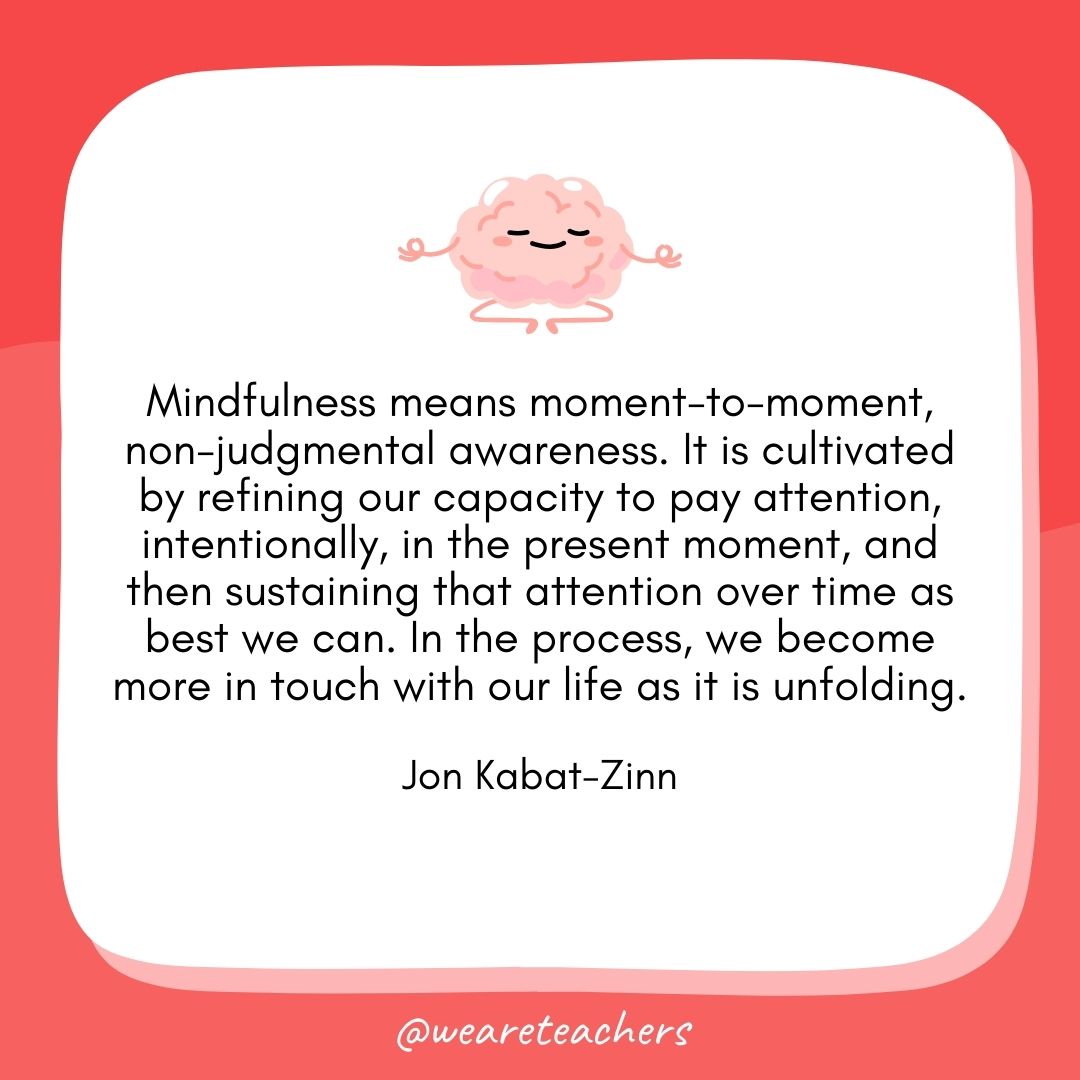
13. With mindfulness—the practice of peace—we can begin by working to transform the wars in ourselves. Conscious breathing helps us do this. — Nhat Hanh
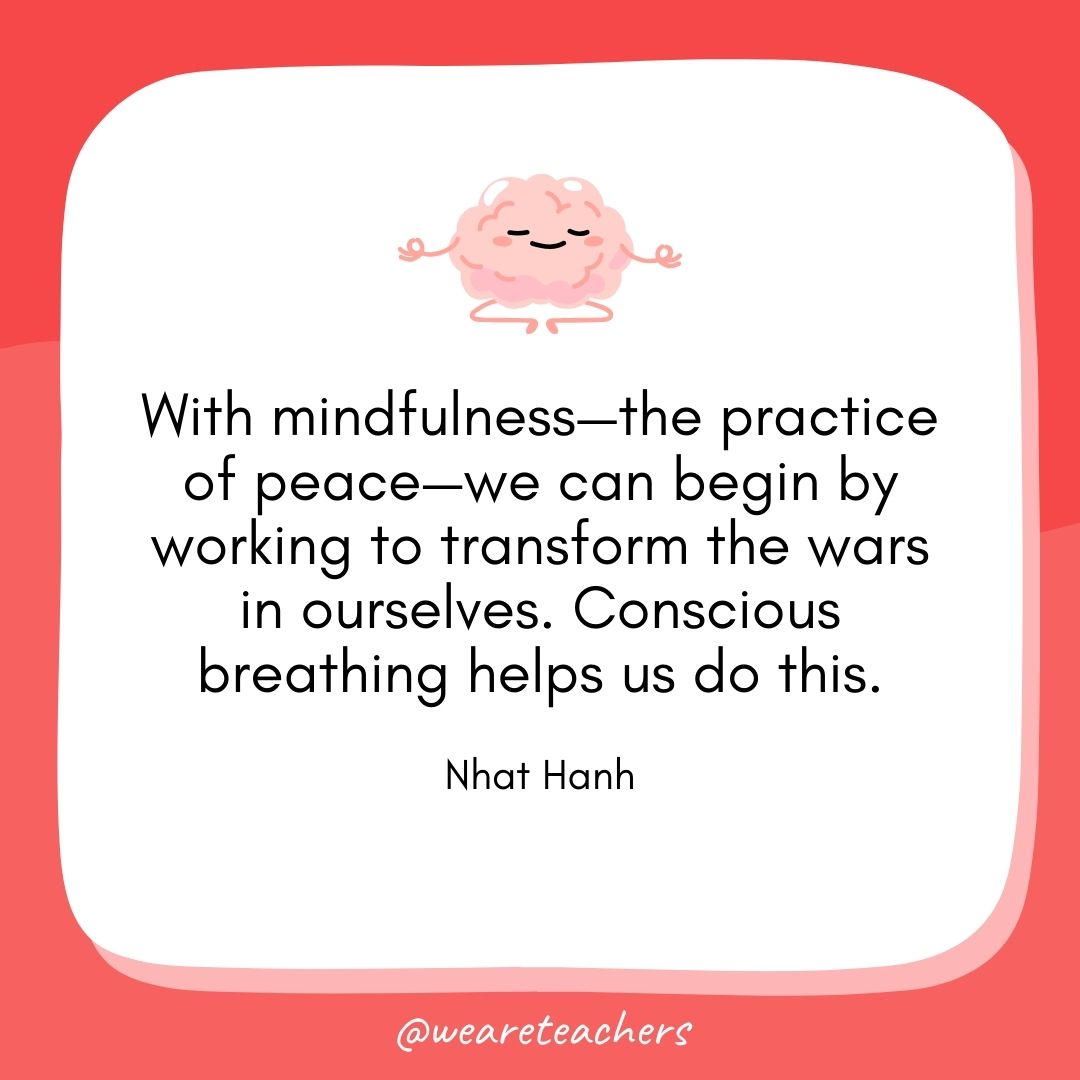
14. Mindfulness is an ancient meditation mode in which we let go of our fears, our attachments to control and being right, our expectations and entitlements, and our judgments of others. Instead of these popular strategies, we learn to simply stay present opening in the moment—with nothing in the way—so we can experience life as it occurs. — David Richo
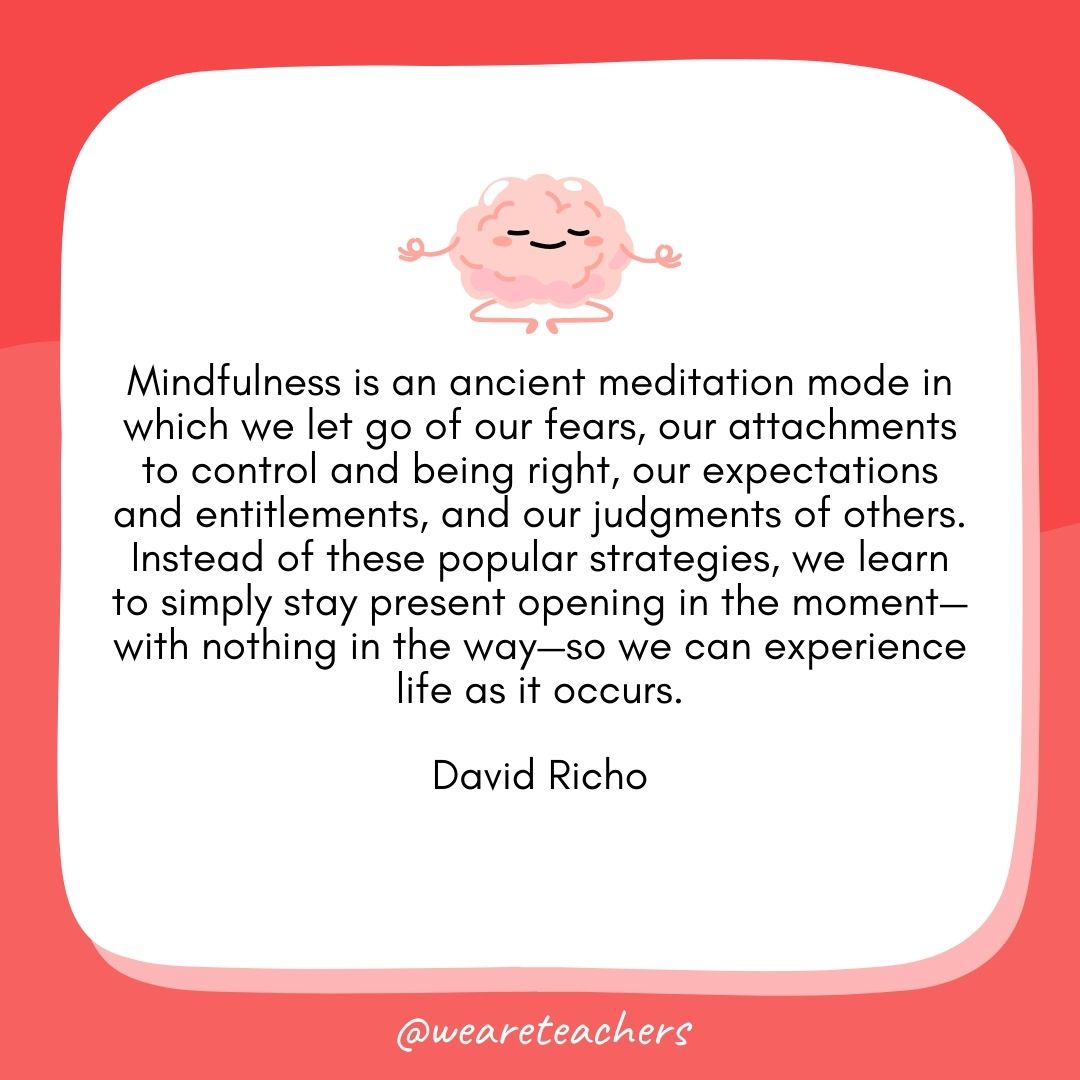
15. There are many good forms of meditation practice. A good meditation practice is any one that develops awareness or mindfulness of our body and our sense, of our mind and heart. — Jack Kornfield
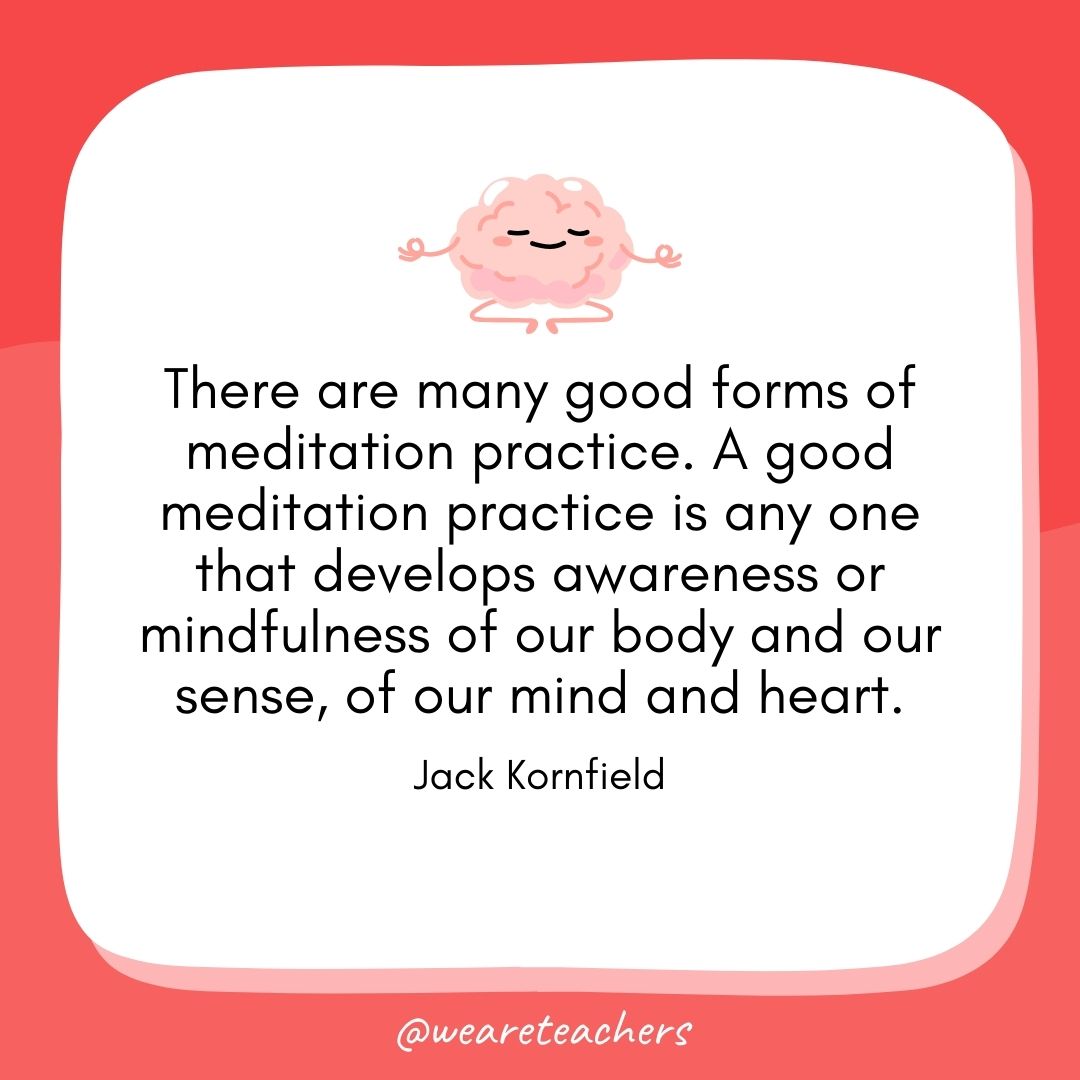
16. Mindfulness gives you time. Time gives you choices. Choices, skillfully made, lead to freedom. You don’t have to be swept away by your feeling. You can respond with wisdom and kindness rather than habit and reactivity. — Henepola Gunaratana
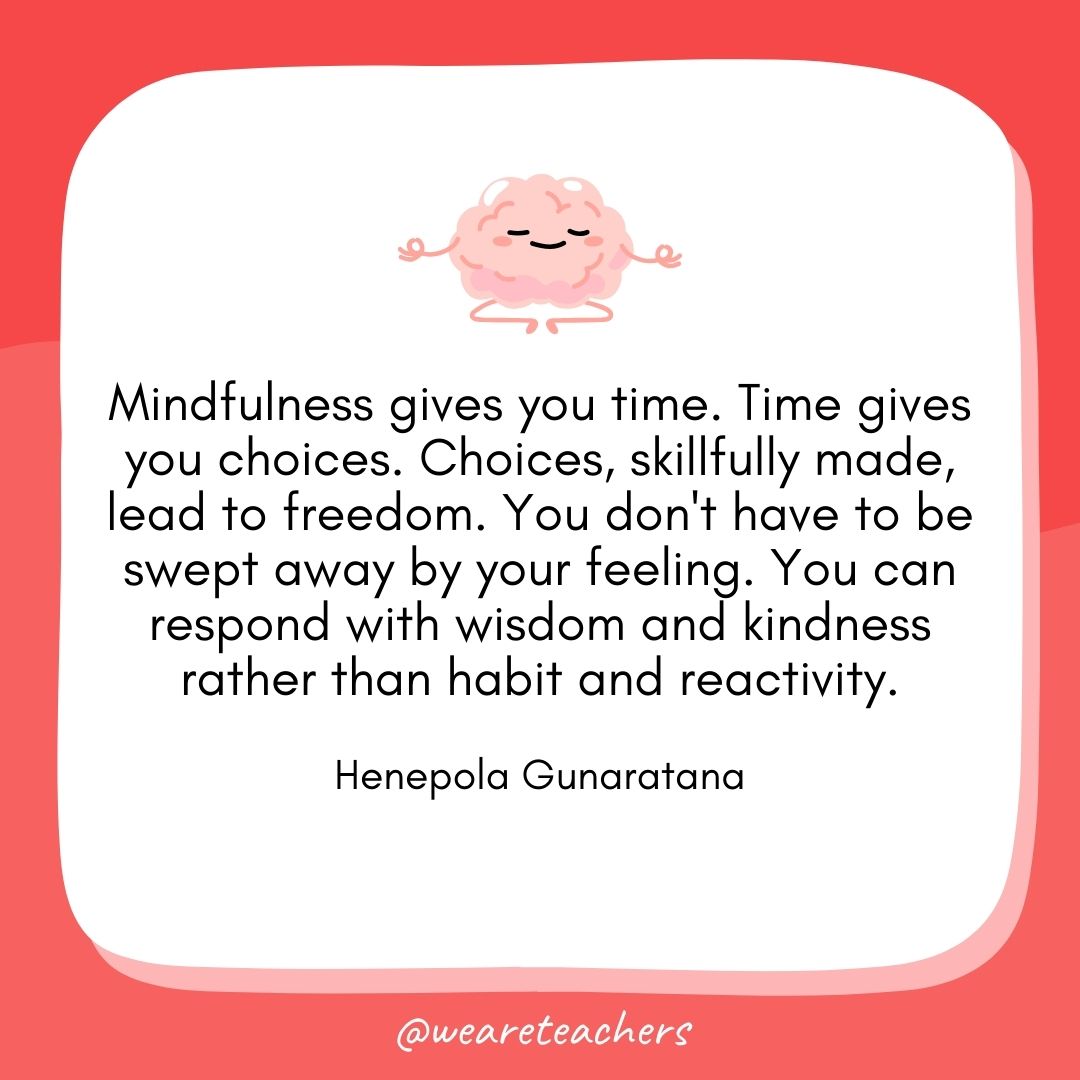
17. Every step taken in mindfulness brings us one step closer to healing ourselves and the planet. — Nhat Hanh

18. Whatever forms of meditation you practice, the most important point is to apply mindfulness continuously, and make a sustained effort. It is unrealistic to expect results from meditation within a short period of time. What is required is continuous sustained effort. — Tenzin Gyatso, 14th Dalai Lama

19. In any given moment we are either practicing mindfulness, or defacto, we are practicing mindlessness. — Jon Kabat-Zinn

20. Machine thinking is the opposite of mindfulness. If we’re really engaged in mindfulness when walking along the path to the village, then we will consider the act of each step we take as an infinite wonder, and a joy will open our hearts like a flower, enabling us to enter the world of reality. — Nhat Hanh
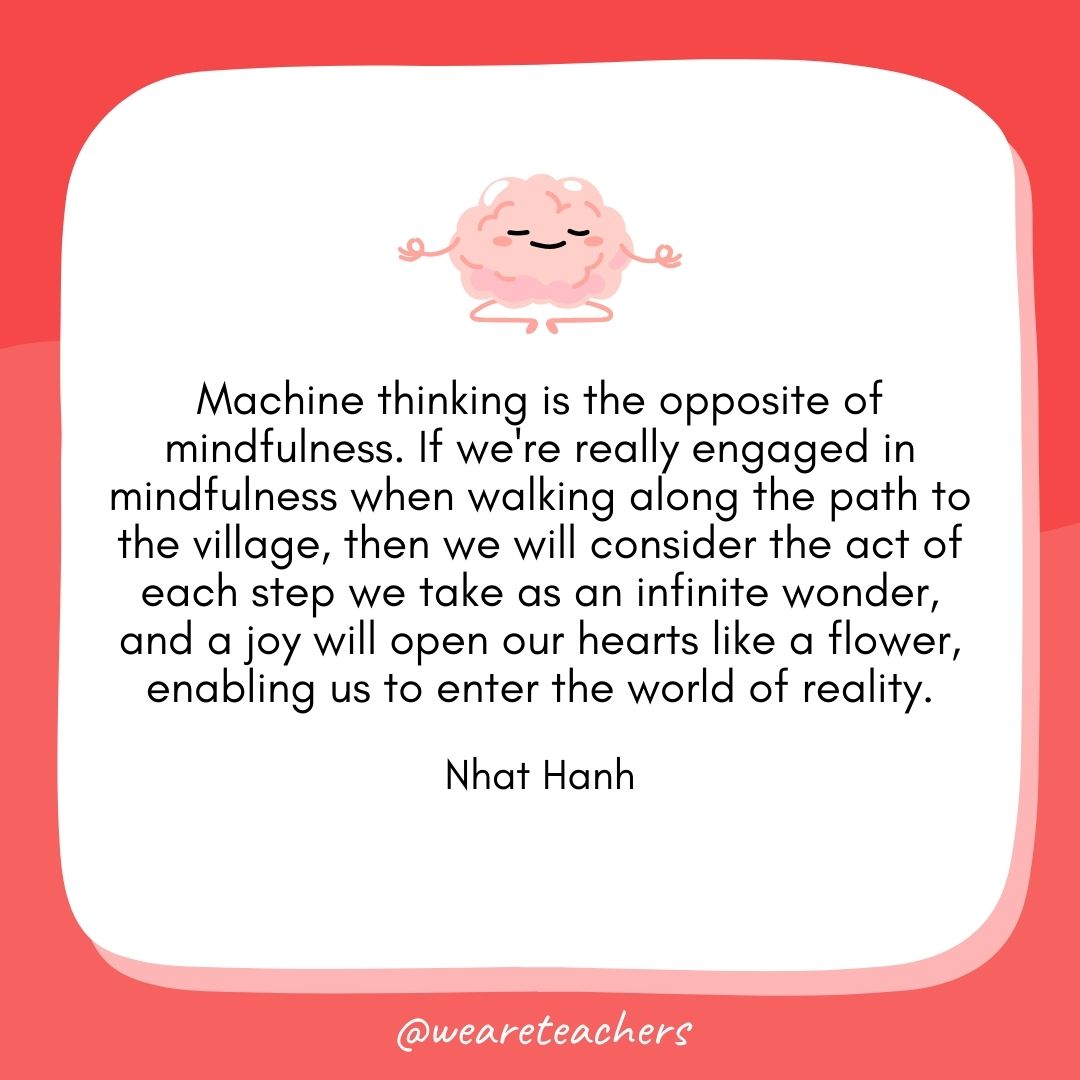
21. Concentration and mindfulness are the internal ways in which the mind restores itself from being out of balance and lost in confusion to a condition of ease, clarity, and wisdom. No external action needs to happen. — Sylvia Boorstein

22. Mindfulness is loving all the details of our lives, and awareness is the natural thing that happens: life begins to open up, and you realize that you’re always standing at the center of the world. — Pema Chödrön
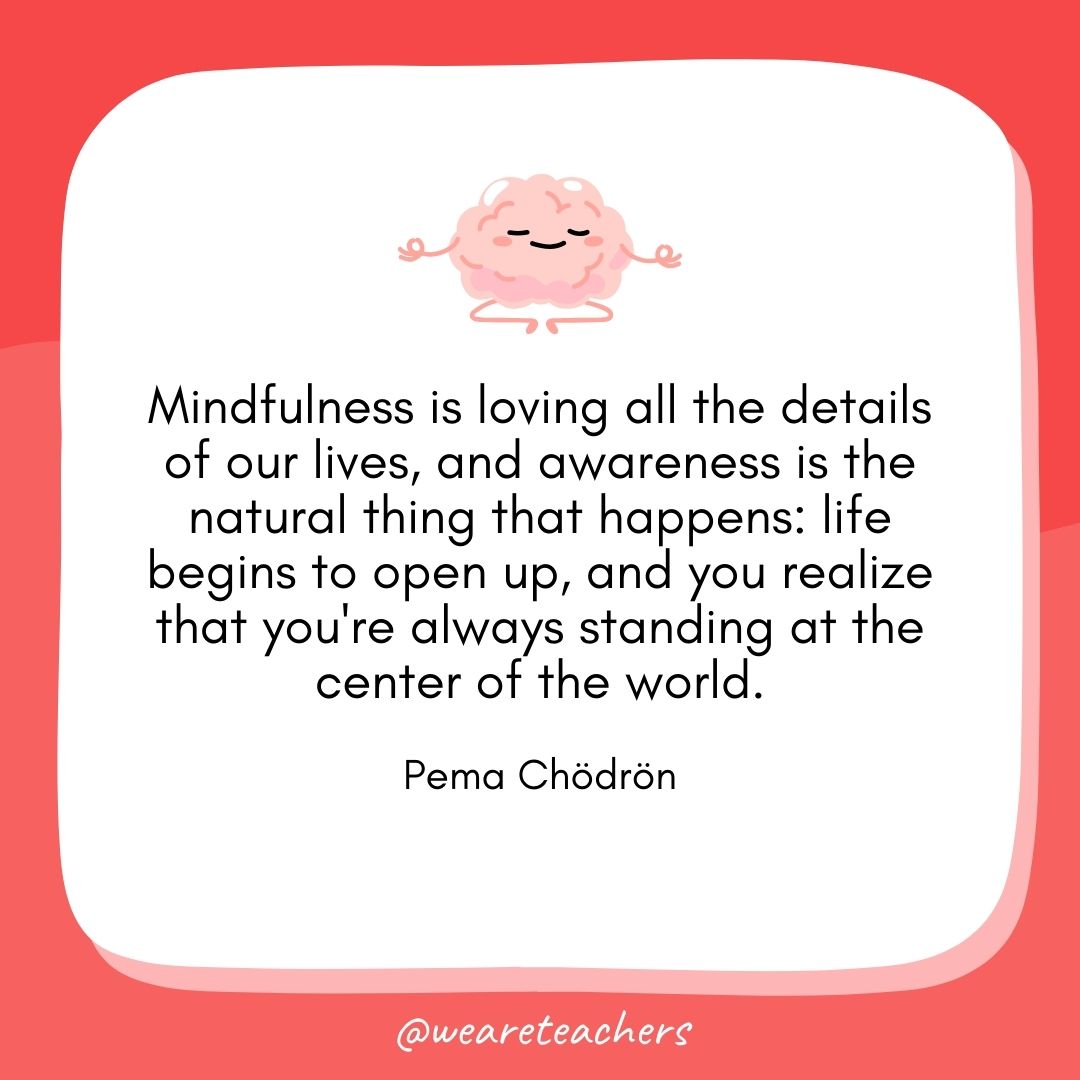
23. See if you can approach your own practice with a healthy combination of mindfulness, playfulness, precision, and curiosity. — Cyndi Lee
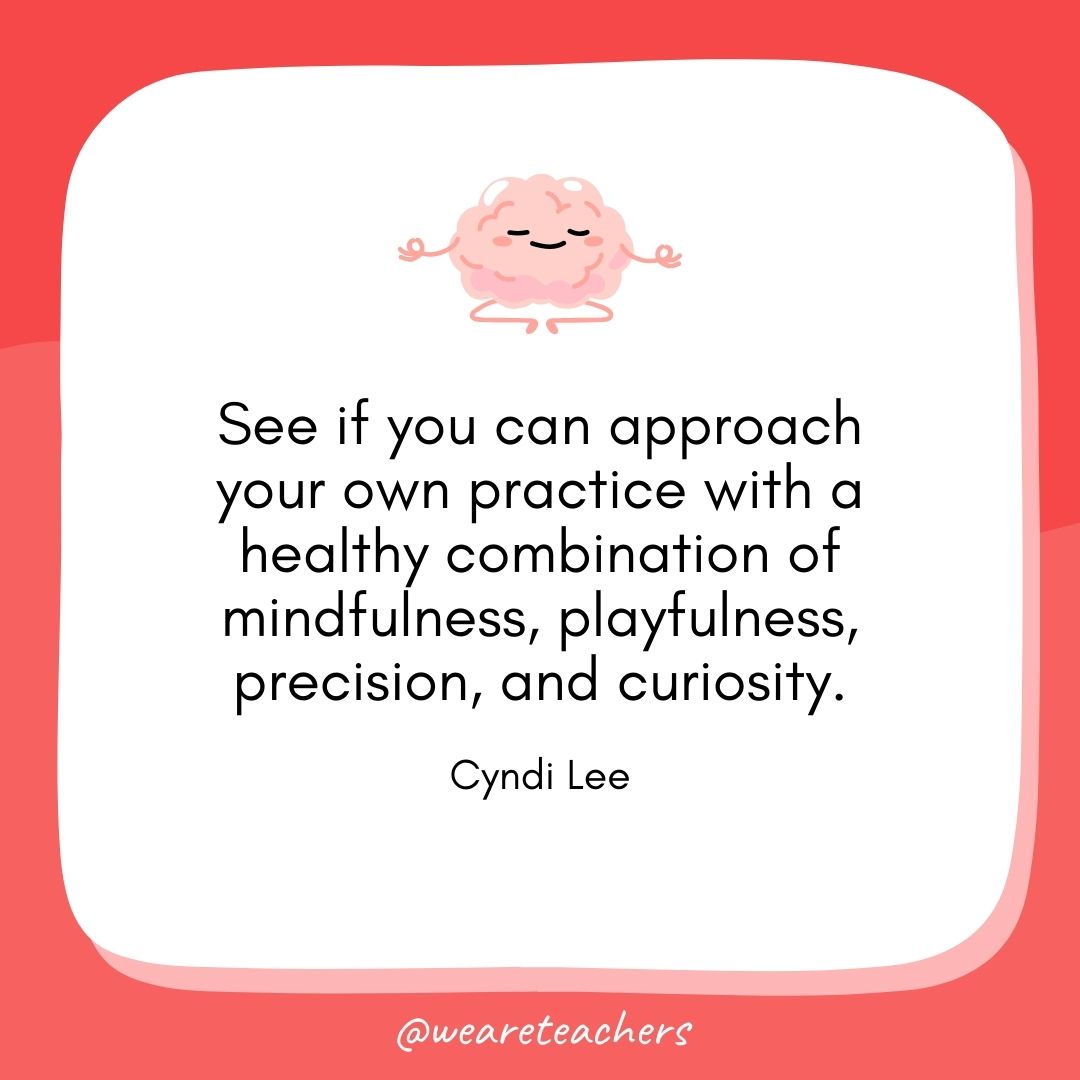
24. Mindfulness, by helping us notice our impulses before we act, gives us the opportunity to decide whether to act and how to act. — Gil Fronsdal
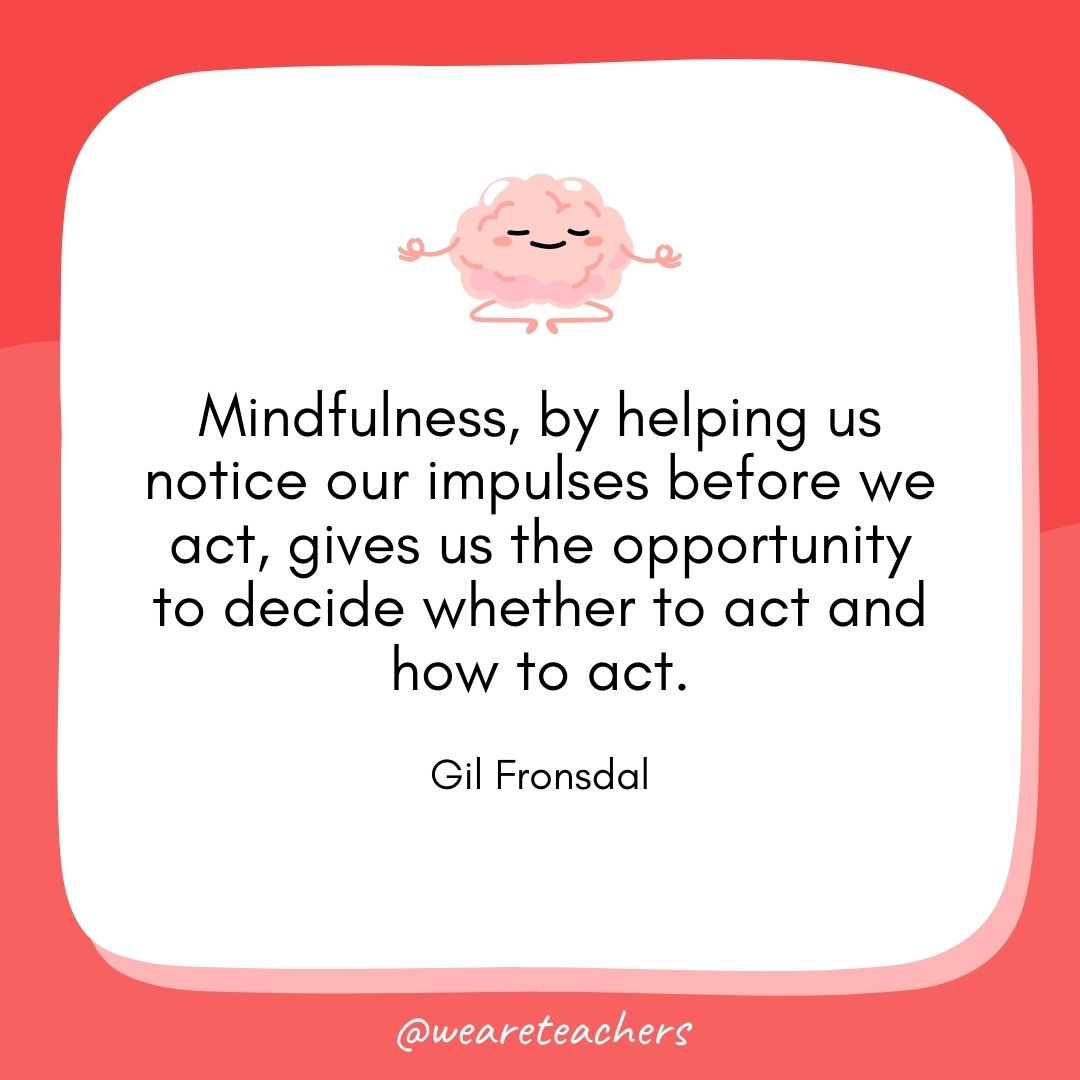
25. Due to attachment, anger, and foolishness, I have committed numberless mistakes in speech, deed and thought. I bow my head and repent. I vow from today to begin anew, to live day and night in mindfulness, and not to repeat my previous mistakes. —Nhat Hanh

26. Motherhood has taught me mindfulness. If you just parent on instinct, you’ll screw your kid up for life. You have to be so mindful. — Gwyneth Paltrow

27. Right mindfulness does not simply mean being aware; it is like creating a work of art. You can therefore trust what you are doing; you are not threatened by anything. You have room to dance in the space, and this makes it a creative situation. The space is open to you. — Chögyam Trungpa
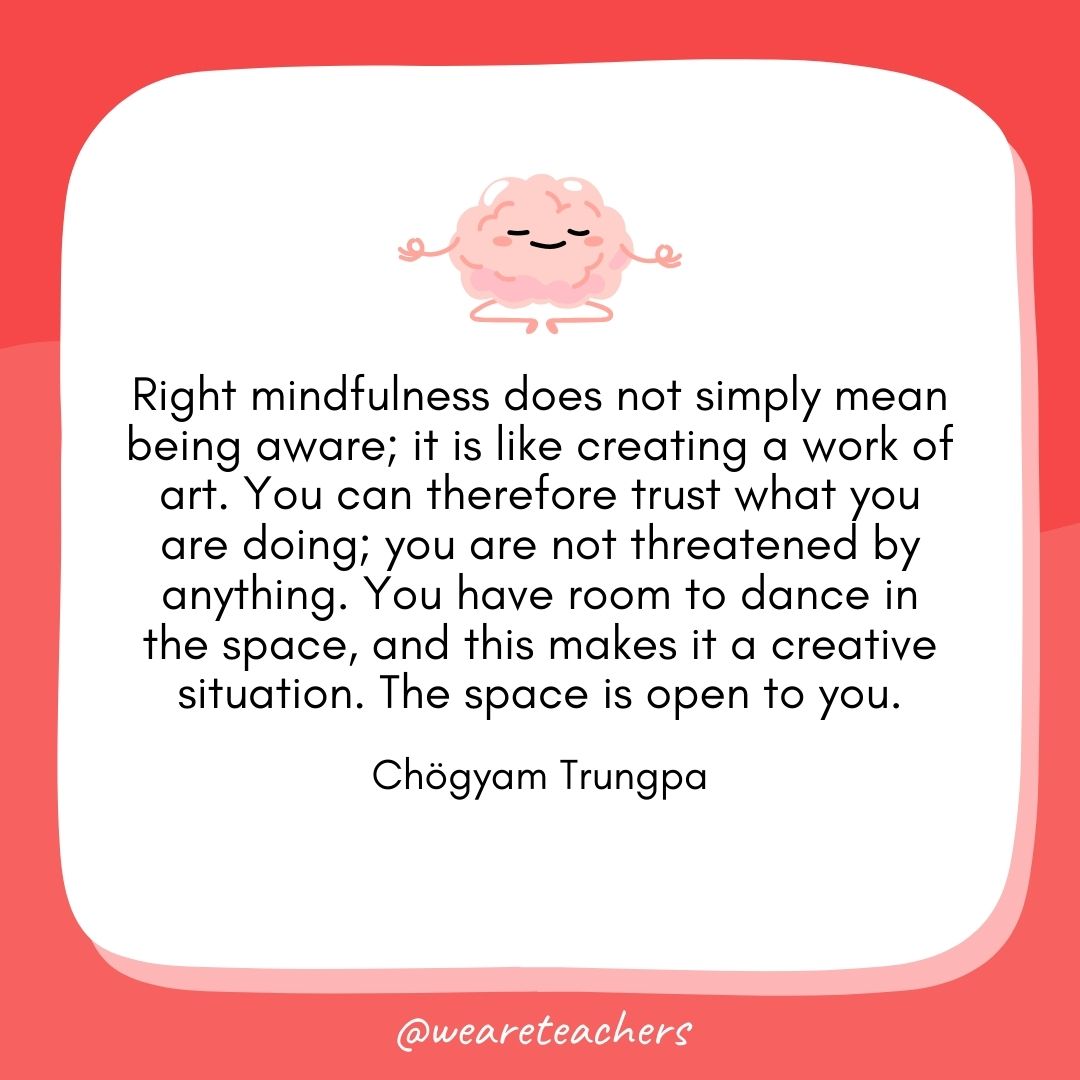
28. The purpose of meditation practice is not enlightenment; it is to pay attention even at extraordinary times, to be of the present, nothing-but-in-the-present, to bear this mindfulness of now into each event of ordinary life. — Peter Matthiessen

29. I like mindful people. Fear prevents mindfulness, and then greed marches in because you are fearful, so you feel like you have to shore everything up. —Ursula Goodenough
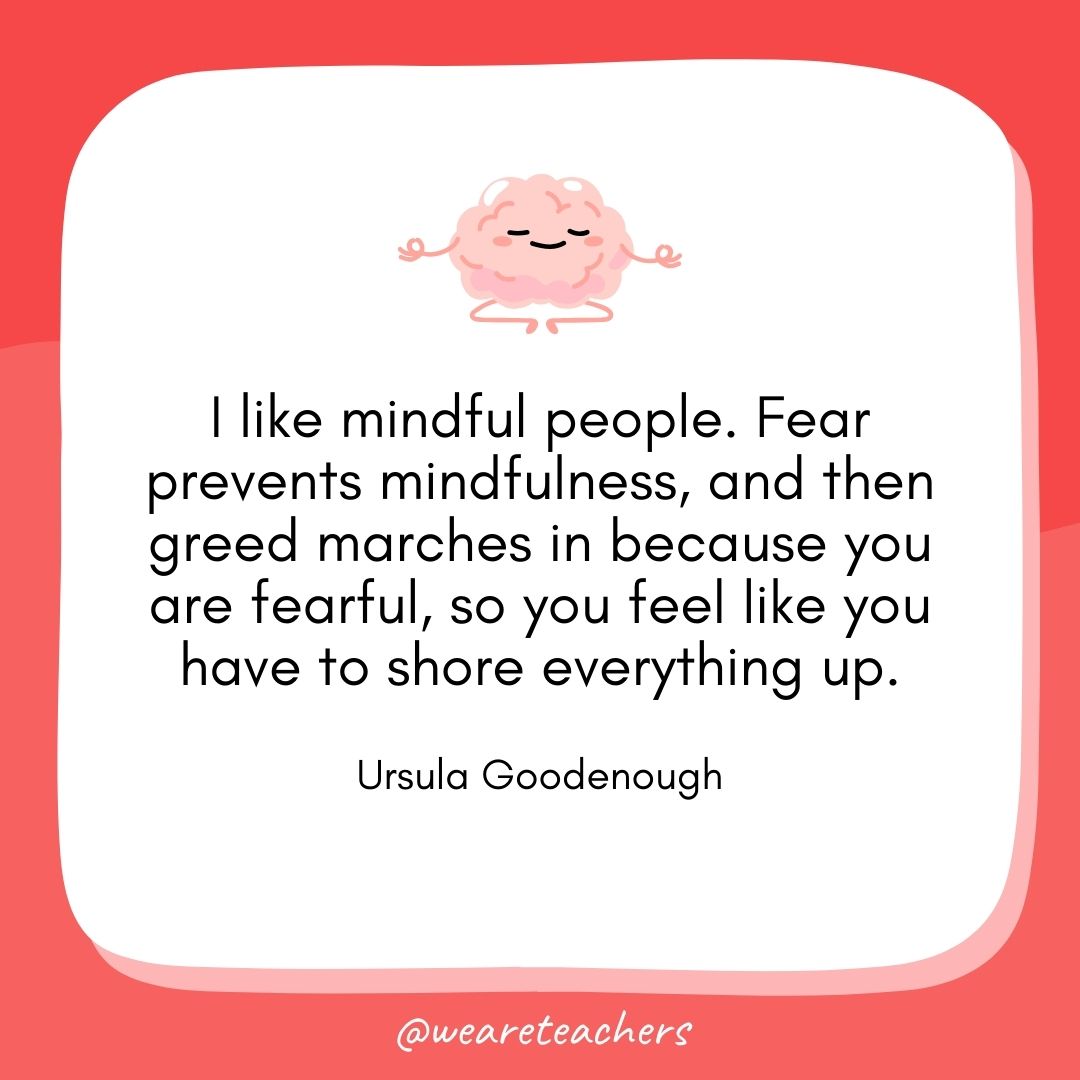
30. The best way to capture moments is to pay attention. This is how we cultivate mindfulness. Mindfulness means being awake. It means knowing what you are doing. — Jon Kabat-Zinn
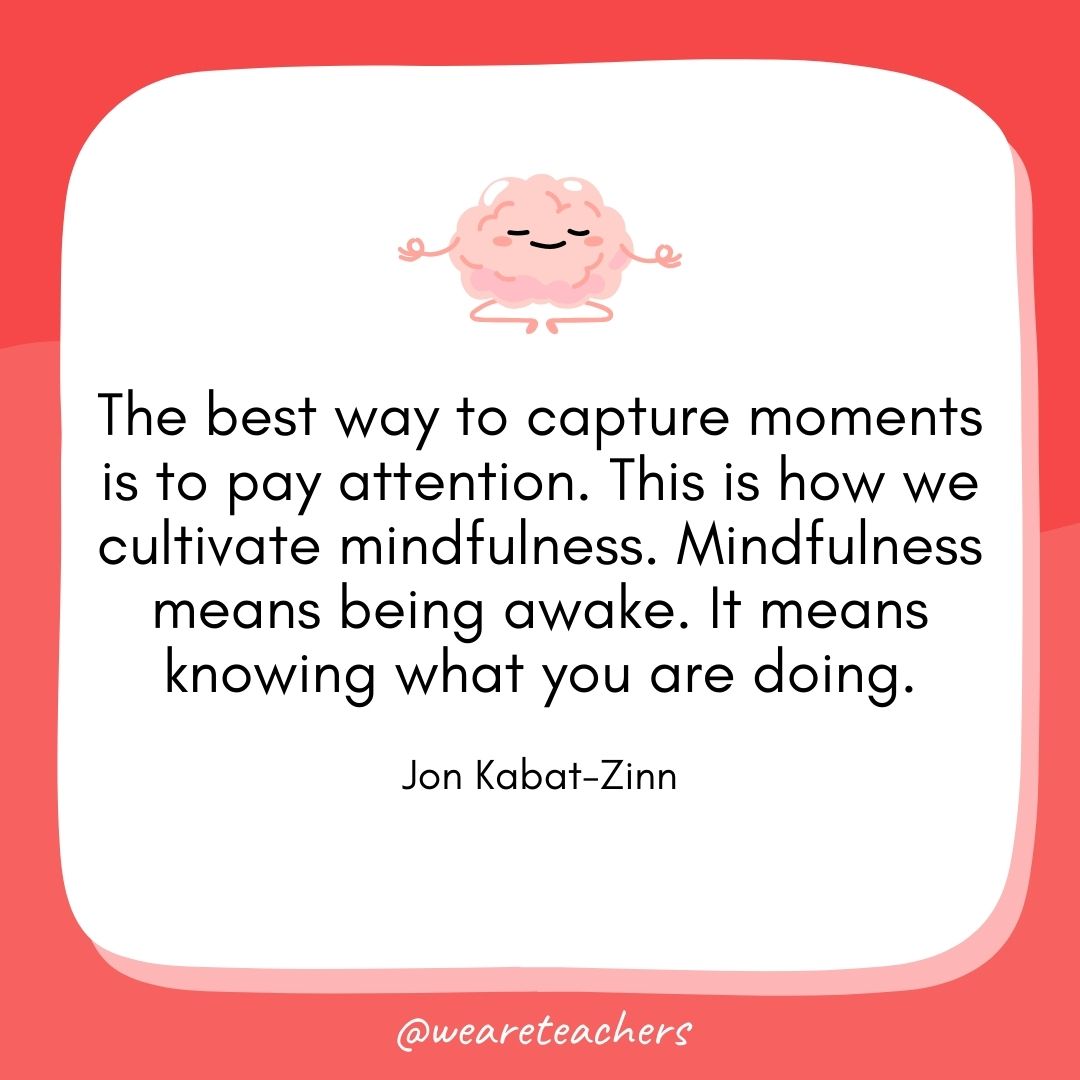
31. The practice of Zen is to eat, breathe, cook, carry water, and scrub the toilet—to infuse every act of body, speech, and mind—with mindfulness, to illuminate every leaf and pebble, every heap of garbage, every path that leads to our mind’s return home. — Nhat Hanh
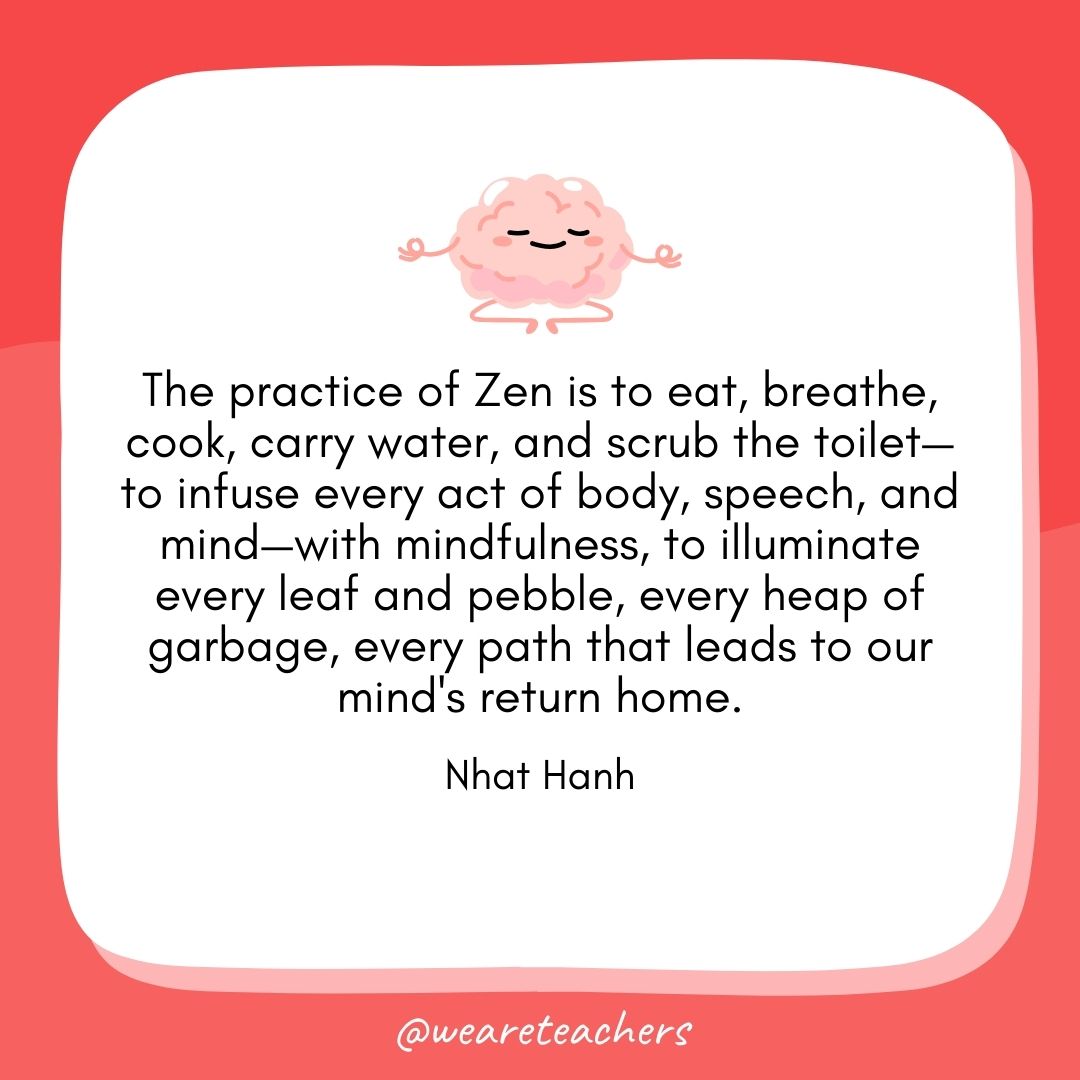
32. As a kitten does what all other kittens do, so a child wants to do what other children do, with a wanting that is as powerful as it is mindless. Since we human beings have to learn what we do, we have to start out that way, but human mindfulness begins where that wish to be the same leaves off. — Ursula K. Le Guin
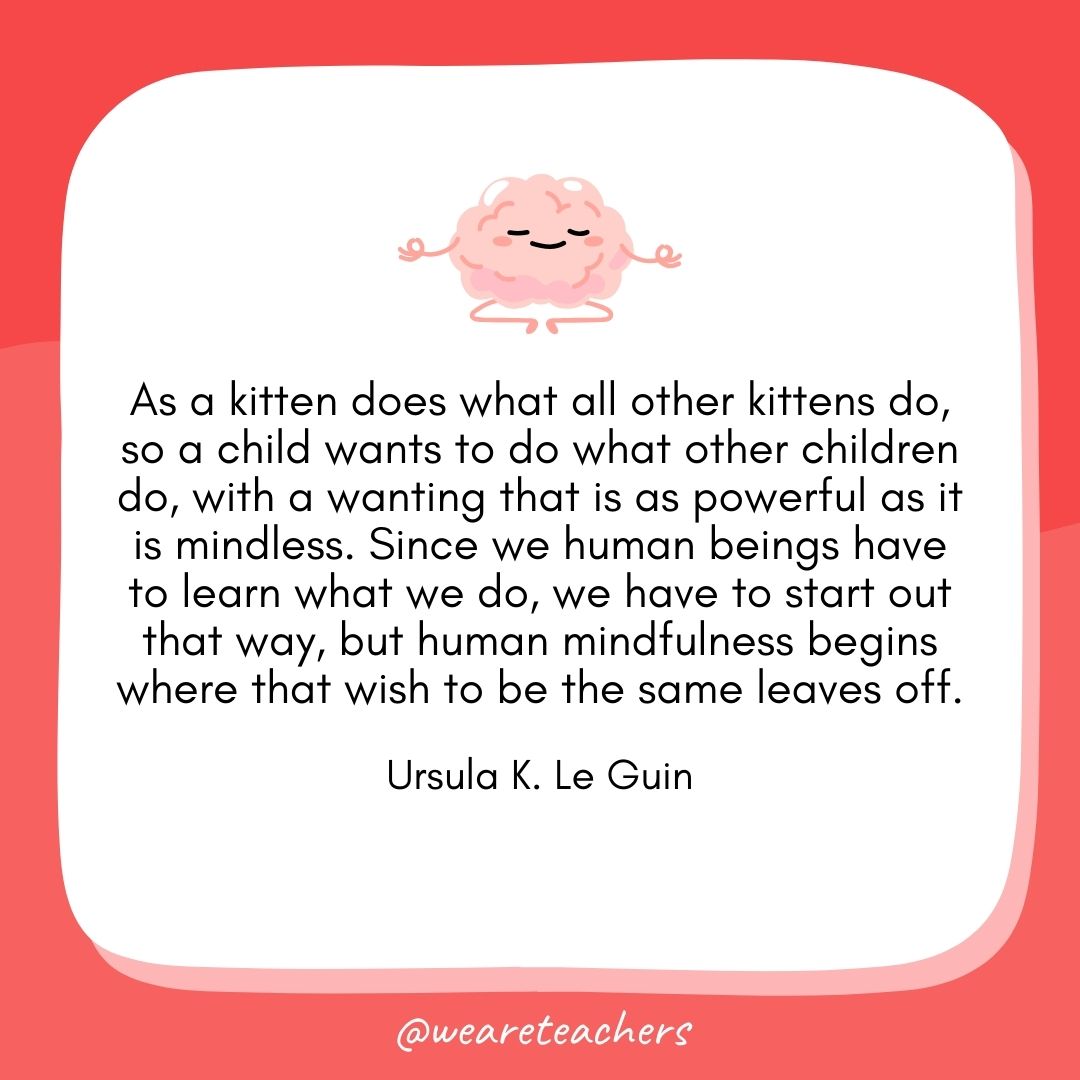
33. We must especially learn the art of directing mindfulness into the closed areas of our life. — Jack Kornfield
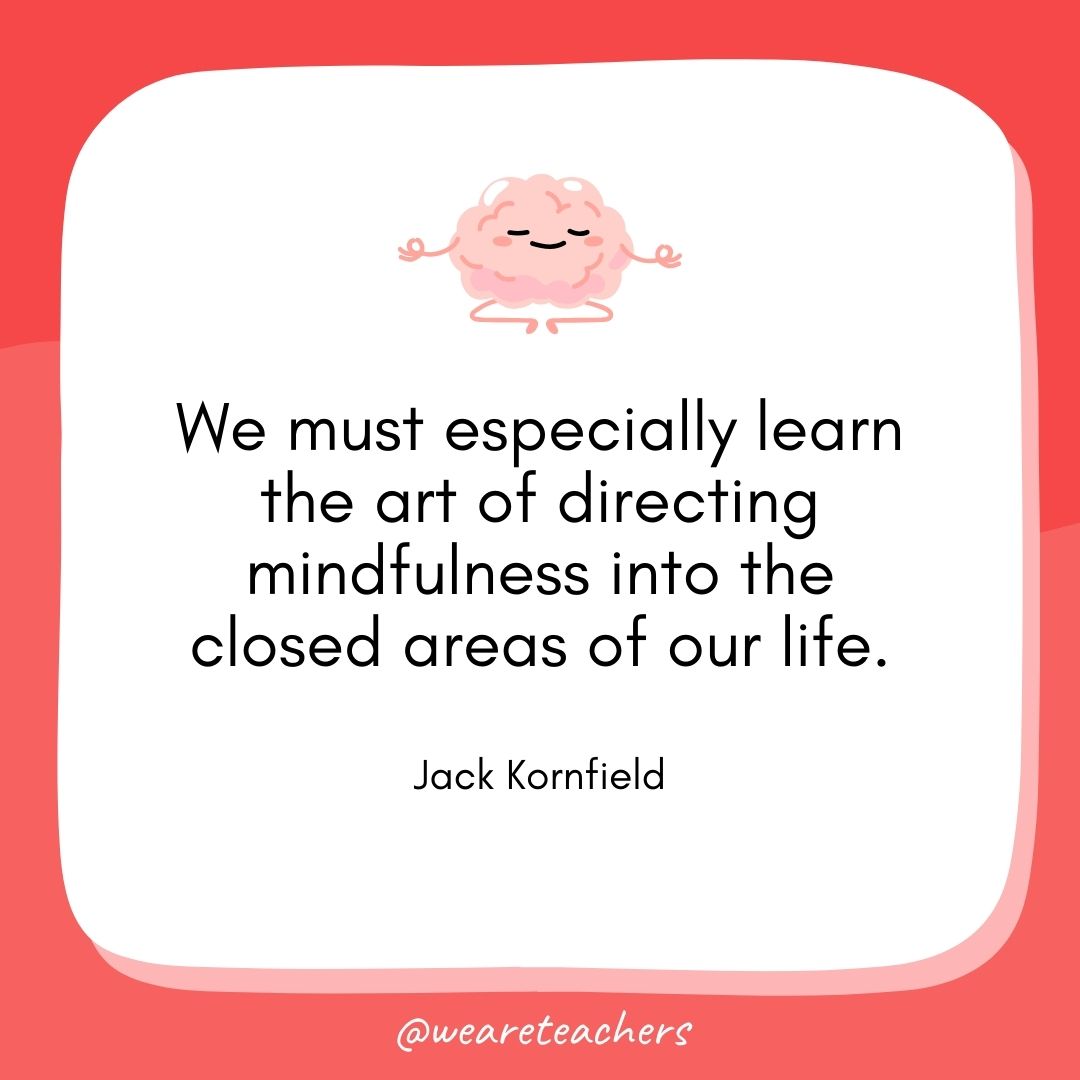
34. Be mindful 24 hours a day, not just during the one hour you may allot for formal meditation or reading scripture and reciting prayers. Each act must be carried out in mindfulness. — Nhat Hanh
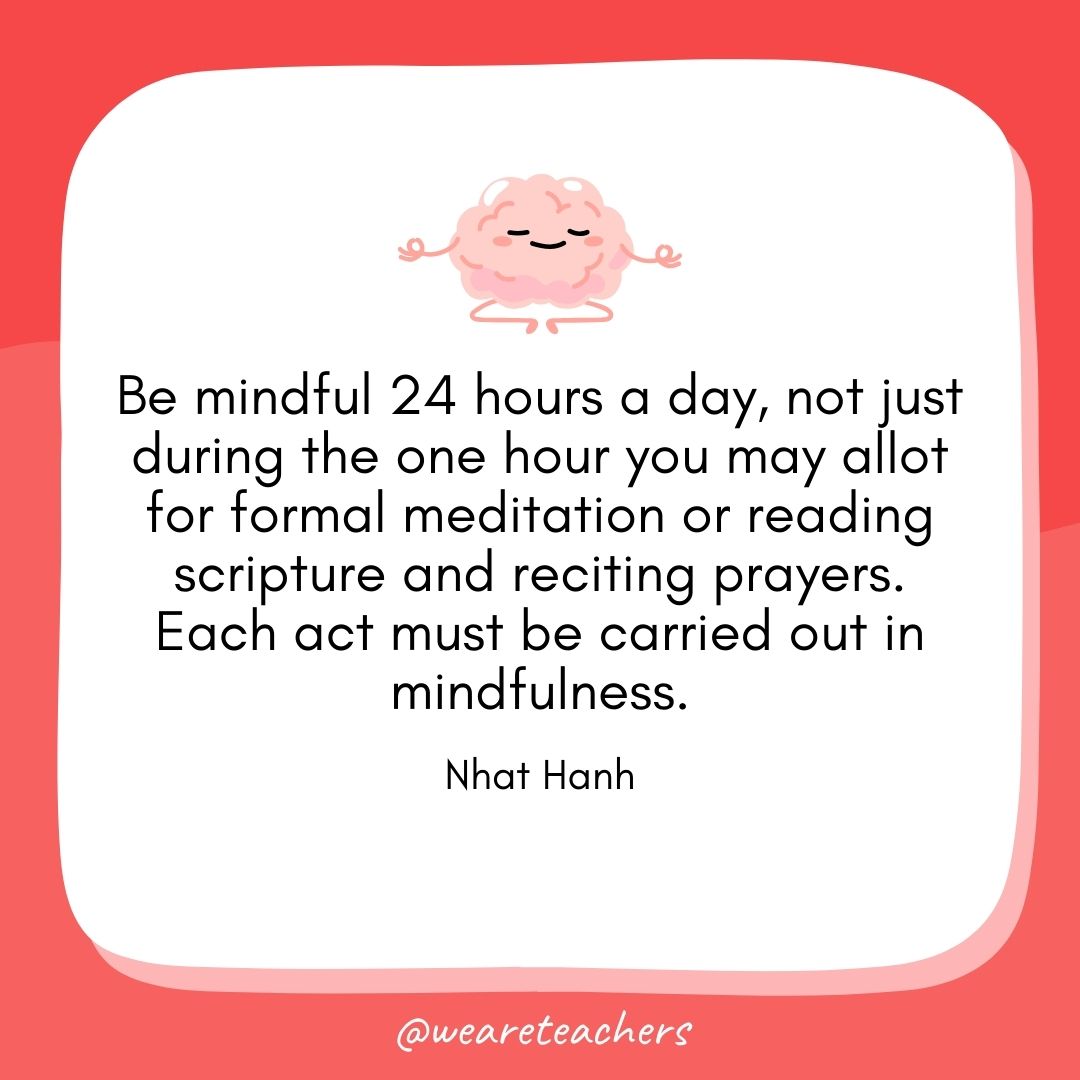
35. Attention or mindfulness is kept to a bare registering of the facts observed, without reacting to them by deed, speech or by mental comment which may be one of self-reference (like, dislike, etc.), judgment or reflection. If during the time, short or long, given to the practice of Bare Attention, any such comments arise in one’s mind, they themselves are made objects of Bare Attention, and are neither repudiated nor pursued, but are dismissed, after a brief mental note has been made of them. — Nyanaponika Thera
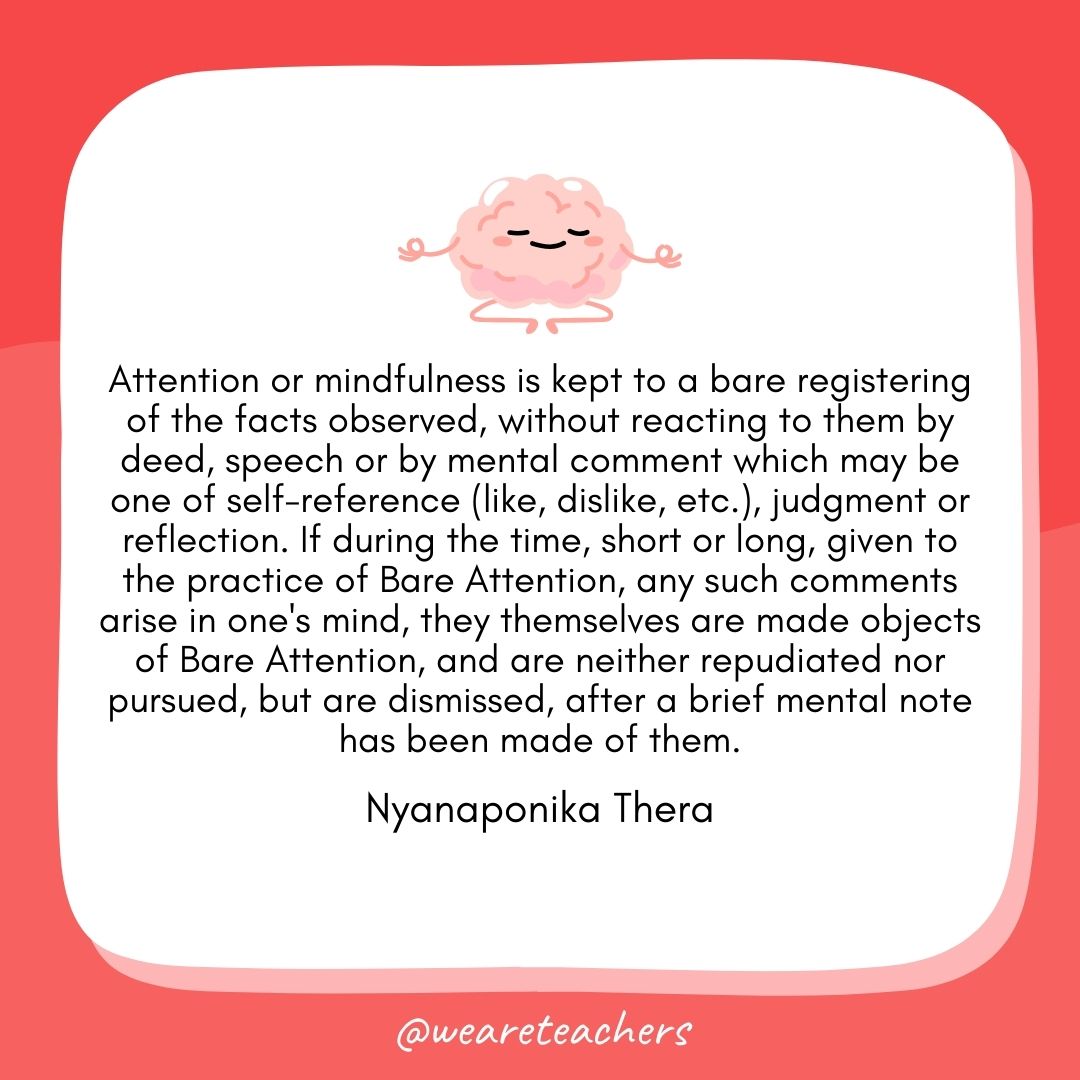
36. Mindfulness was experienced as not holding onto the past, the future, or “nowness”: but relaxing into the immediacy of whatever was happening. — Alan Wallace
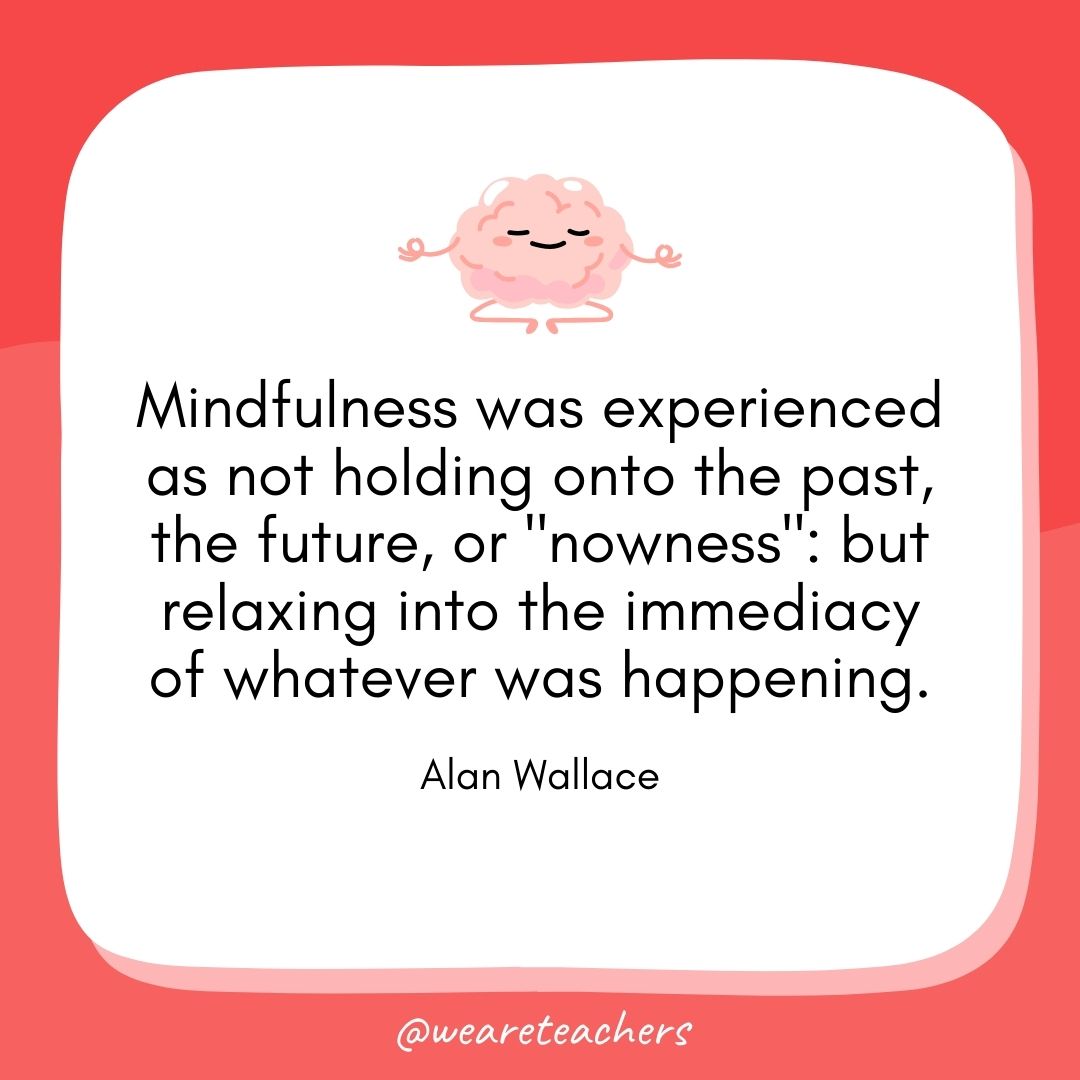
37. Mindfulness isn’t difficult, we just need to remember to do it. — Sharon Salzberg
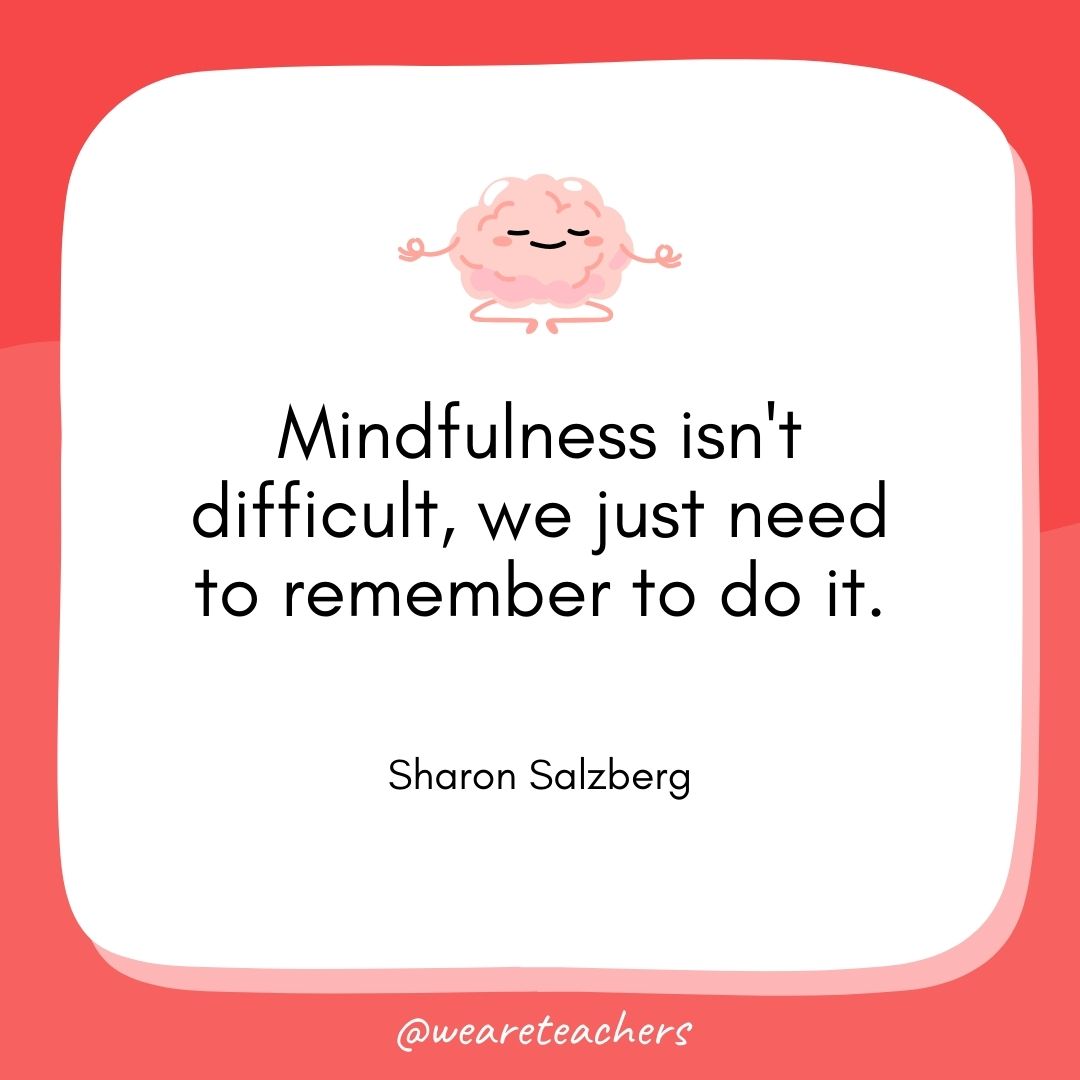
38. If we practice mindfulness, we will know how to look deeply into the nature of war and, with our insight, wake people up so that together we can avoid repeating the same horrors again and again. — Nhat Hanh
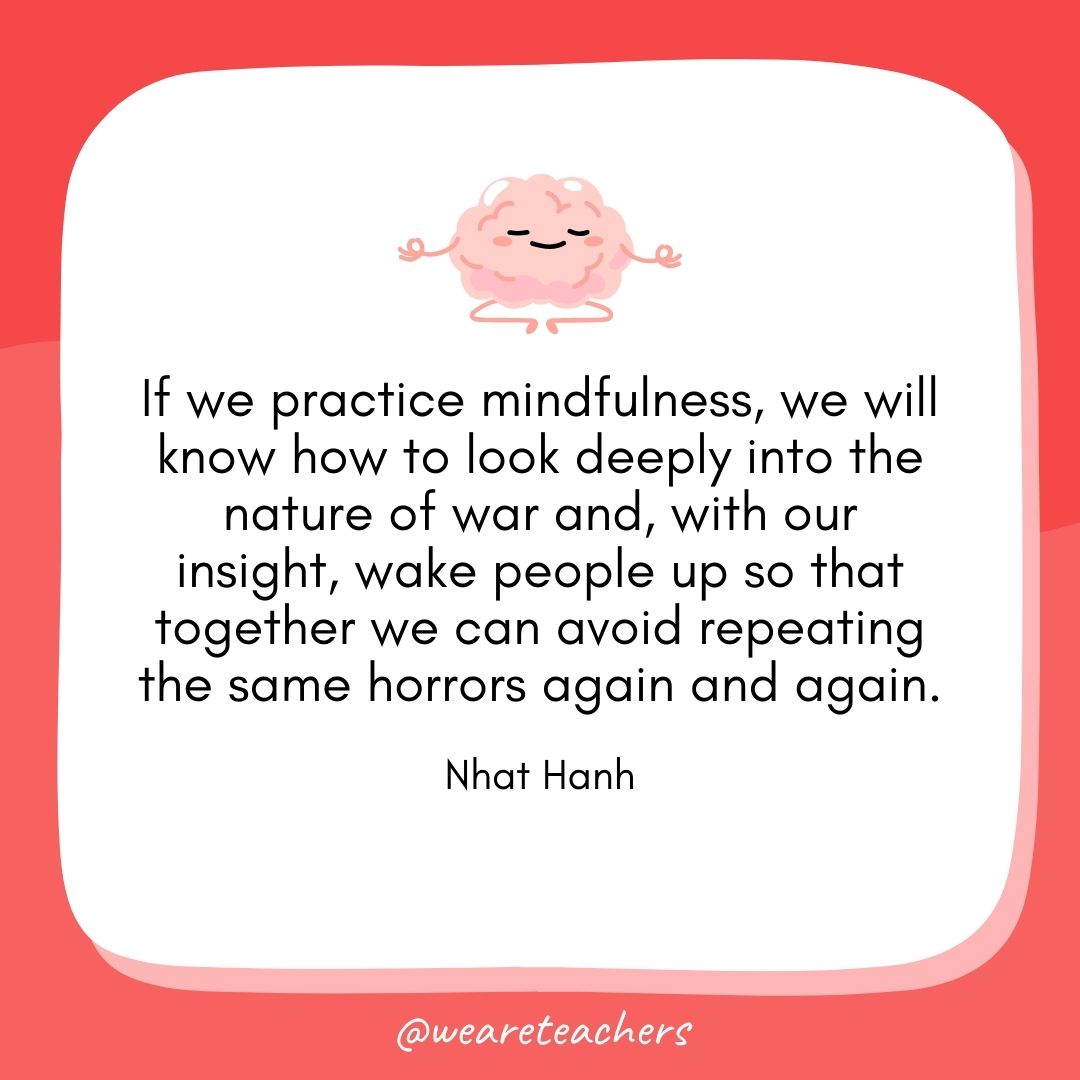
39. Mindfulness practice means that we commit fully in each moment to be present; inviting ourselves to interface with this moment in full awareness, with the intention to embody as best we can an orientation of calmness, mindfulness, and equanimity right here and right now. — Jon Kabat-Zinn
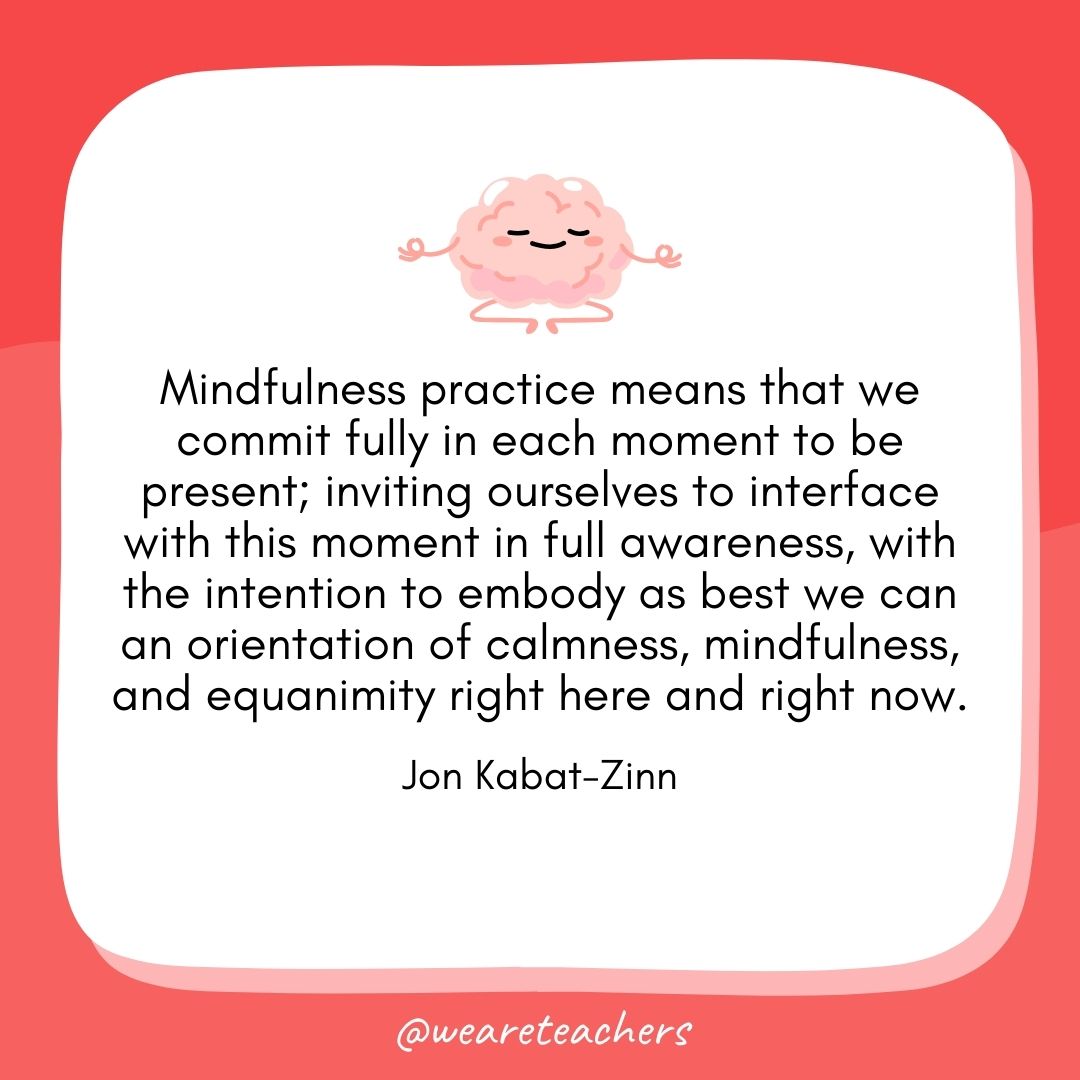
40. The bones and tendons of the mind are mindfulness and awareness. Mindfulness is the mind’s strength, and awareness is its flexibility. Without these abilities, we cannot function. When we drink a glass of water, drive a car, or have a conversation, we are using mindfulness and awareness. — Sakyong Mipham
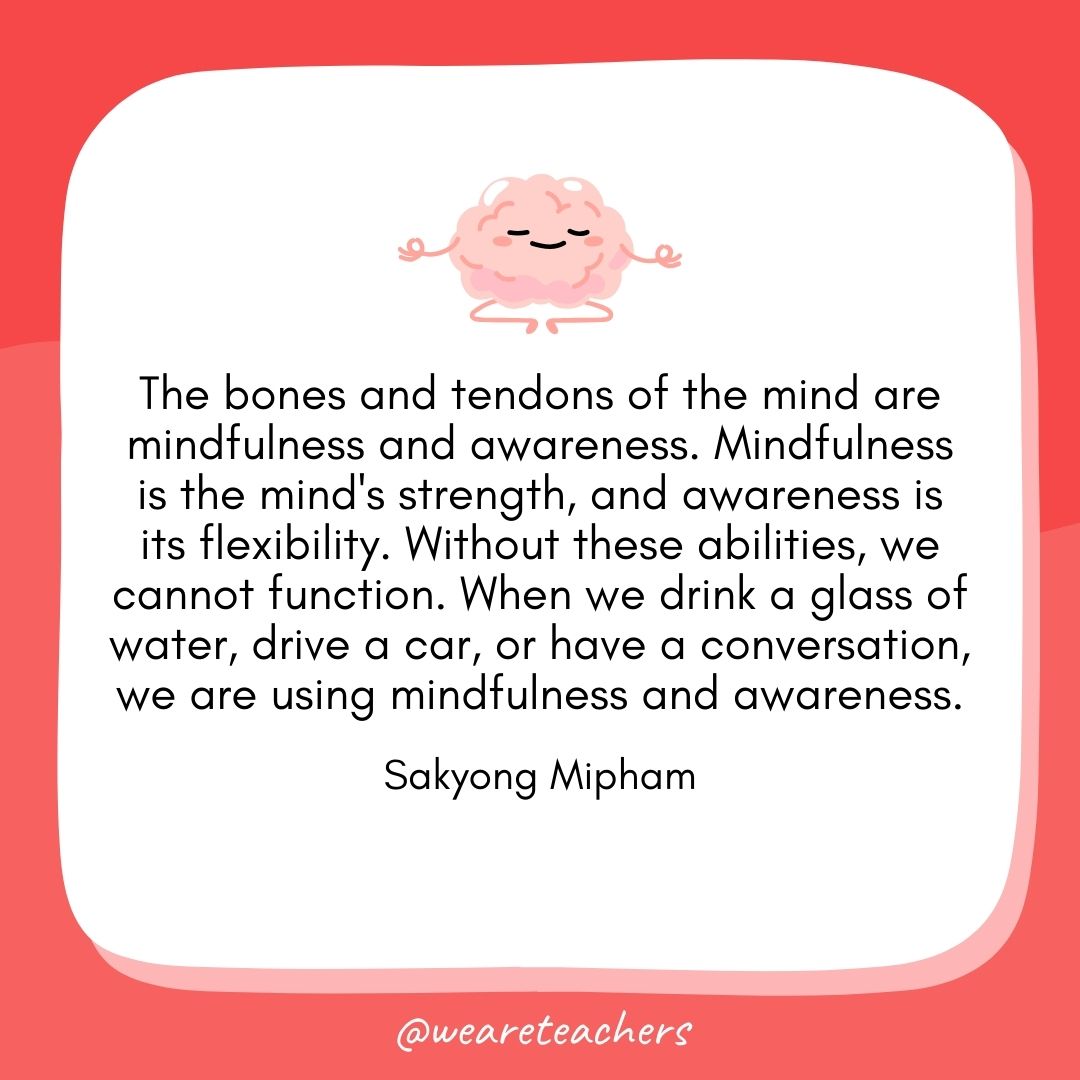
41. Mindfulness is the miracle by which we master and restore ourselves. — Nhat Hanh
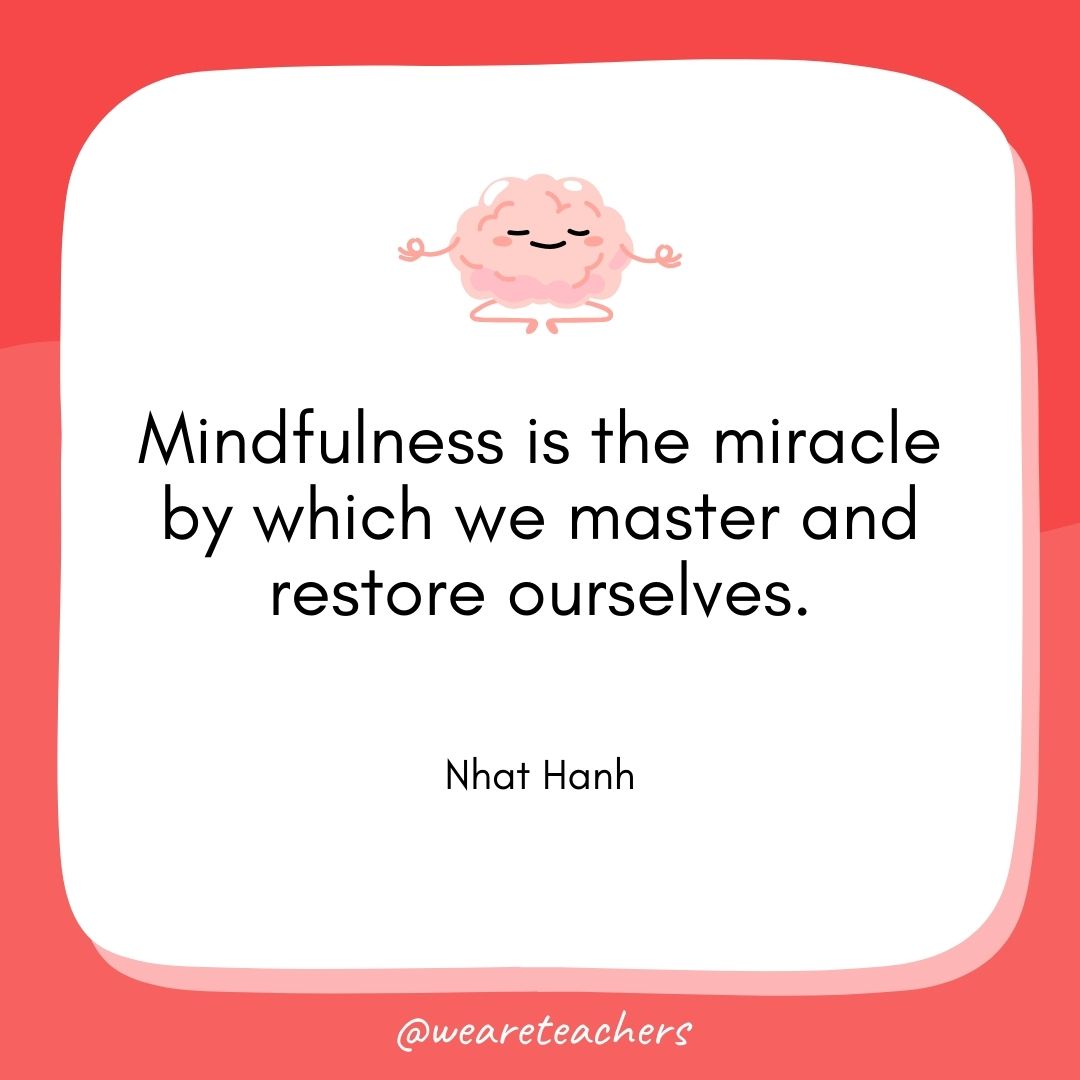
42. Every moment of mindfulness means the gradual destruction of latent defilements. It is somewhat like cutting away a piece of wood with a small axe, every stroke helping to get rid of the unwanted fragments of wood. — Mahasi Sayadaw
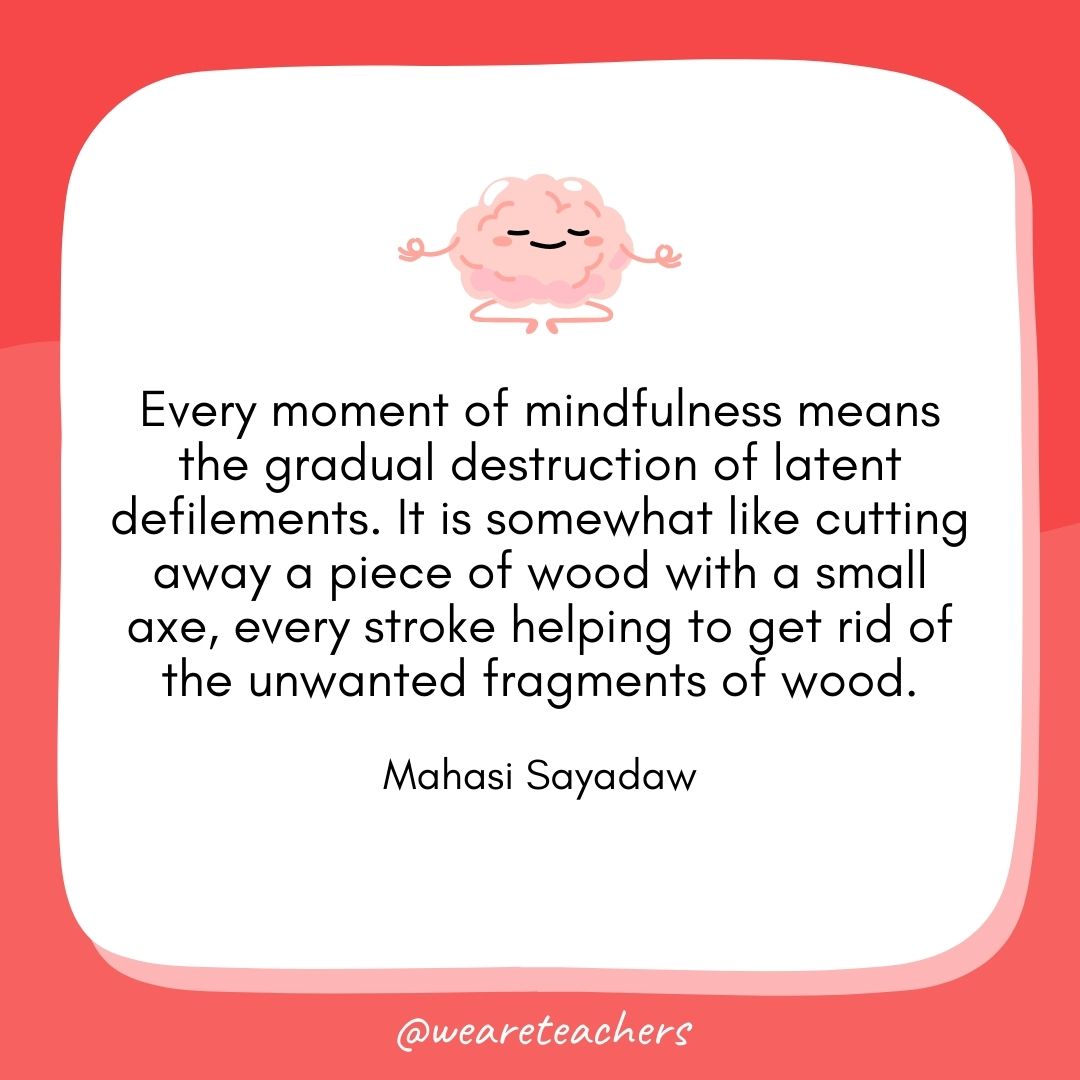
43. Cultivating a generous spirit starts with mindfulness. Mindfulness, simply stated, means paying attention to what is actually happening; it’s about what is really going on. — Nell Newman
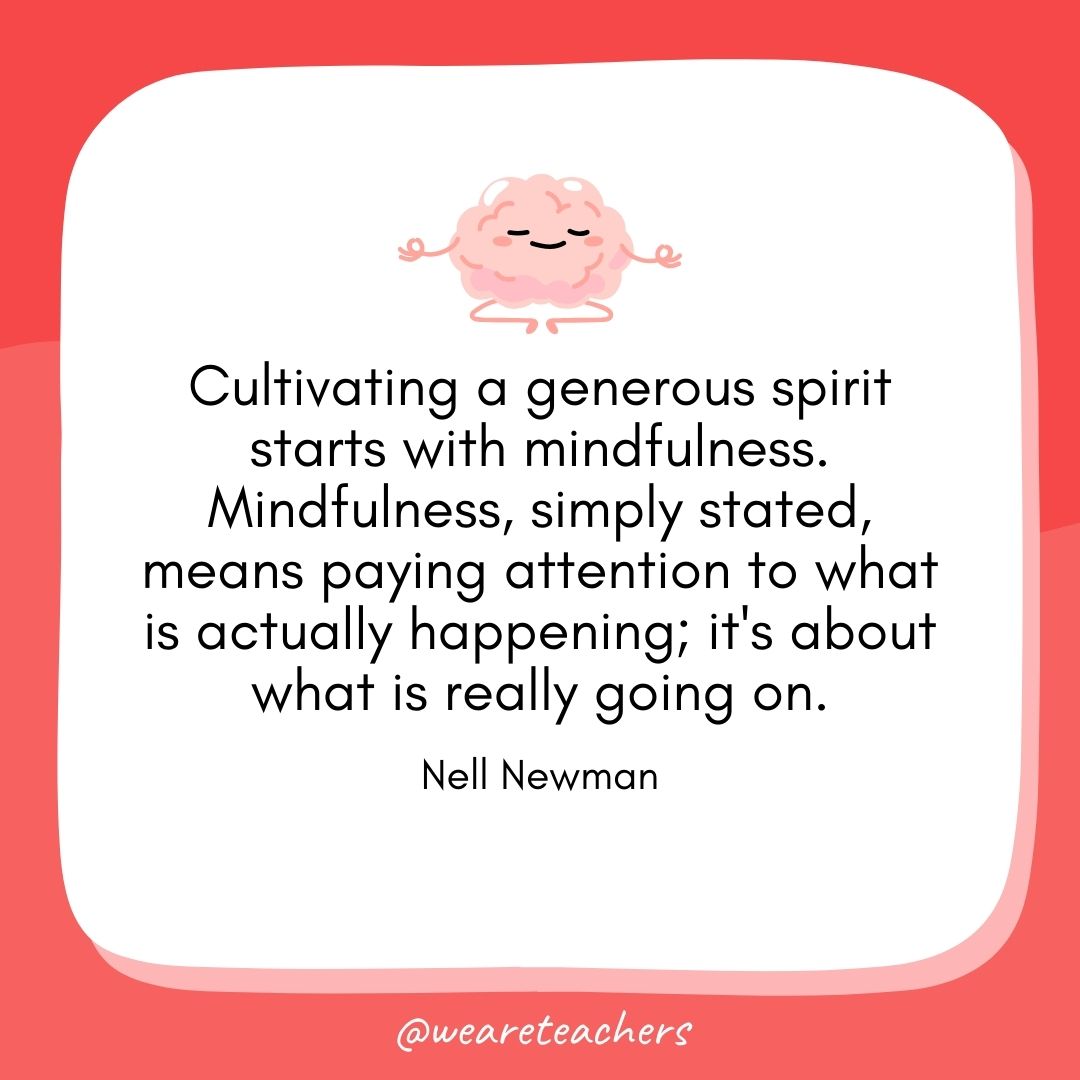
44. Mindfulness is like a microscope; it is neither an offensive nor defensive weapon in relation to the germs we observe through it. The function of the microscope is just to clearly present what is there. — Chögyam Trungpa
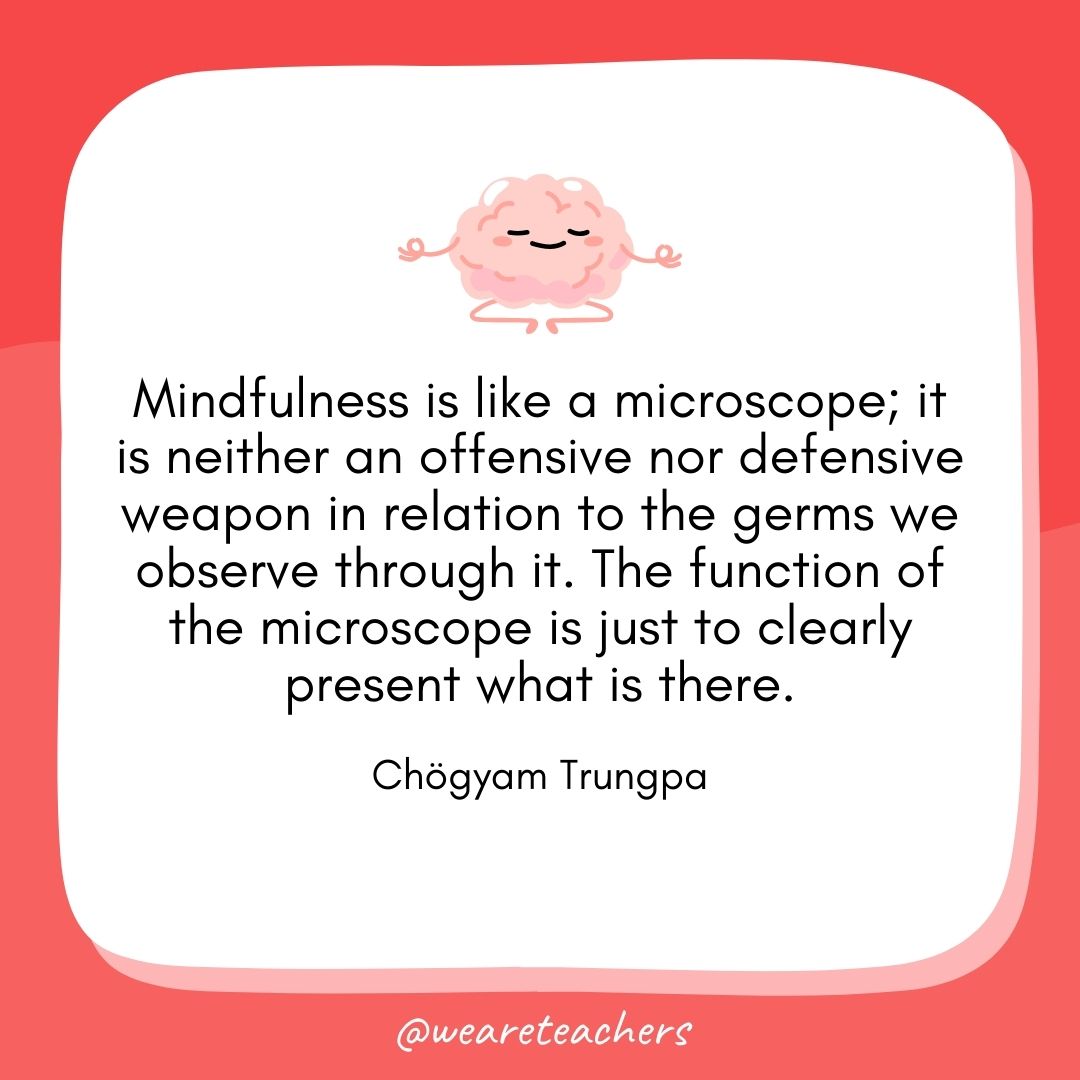
45. Mindfulness must be engaged. Once there is seeing, there must be acting. Otherwise, what’s the use of seeing? — Nhat Hanh
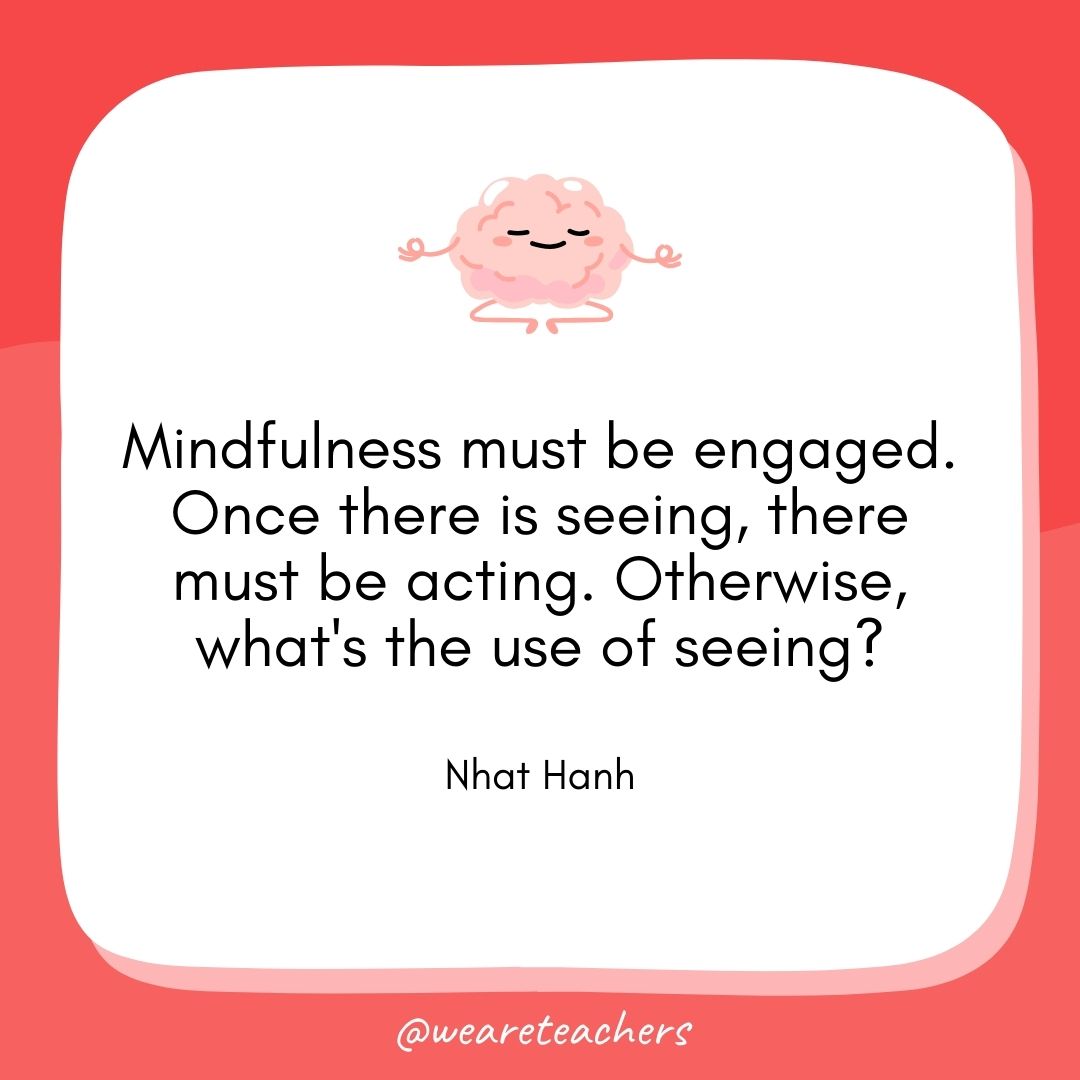
46. Mindfulness helps us get better at seeing the difference between what’s happening and the stories we tell ourselves about what’s happening, stories that get in the way of direct experience. Often such stories treat a fleeting state of mind as if it were our entire and permanent self. — Sharon Salzberg
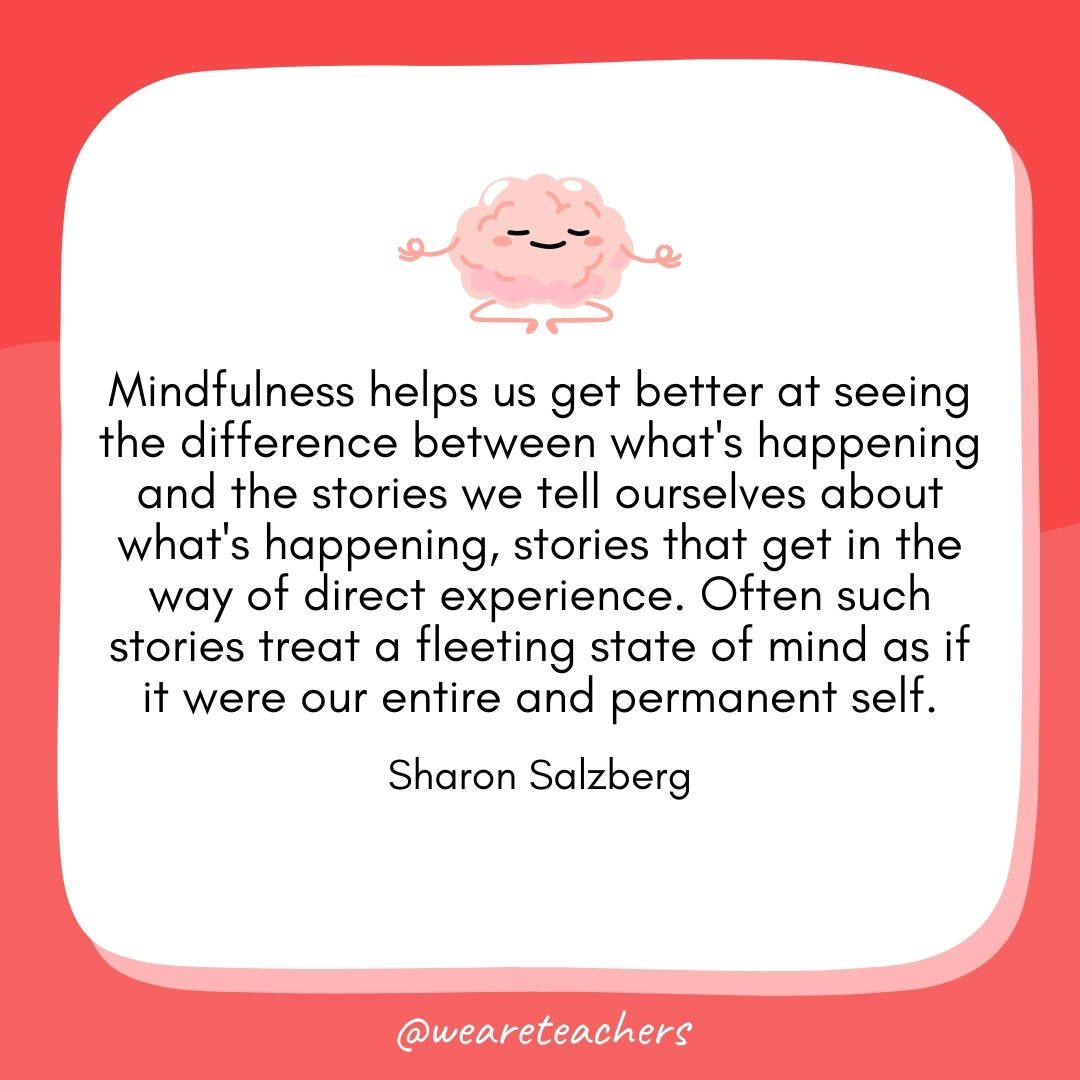
47. Mindfulness is like that—it is the miracle which can call back in a flash our dispersed mind and restore it to wholeness so that we can live each minute of life. — Nhat Hanh
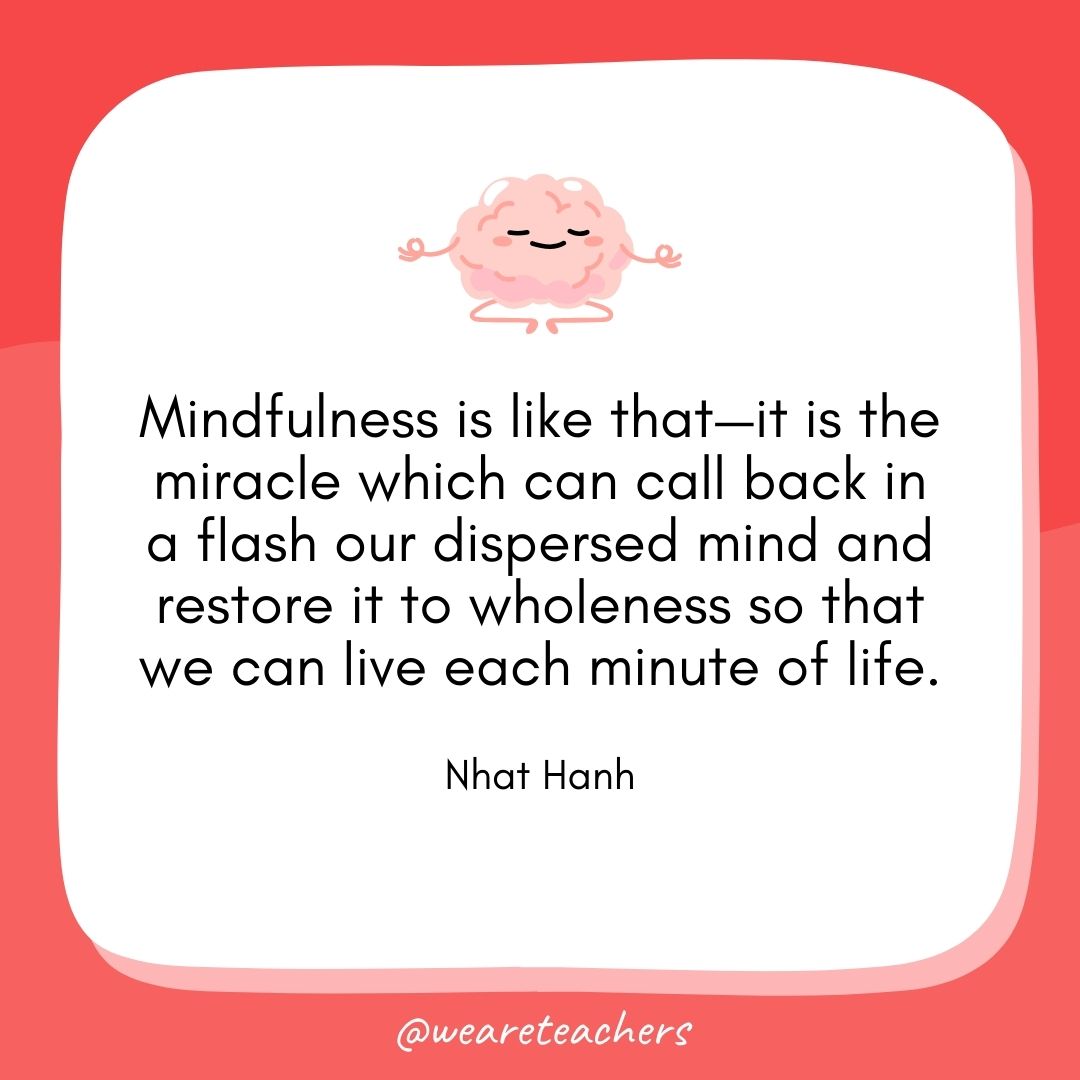
48. Creativity of all kinds focuses your mind, engages your imagination, and feeds your soul. Being creative can also facilitate understanding and encourage healing. Creativity is mindfulness in motion—intuitive, artistic motion. — Sue Patton Thoele

49. Mindfulness is deliberately paying full attention to what is happening around you—in your body, heart and mind. Mindfulness is awareness without criticism or judgment. — Jan Chozen Bays
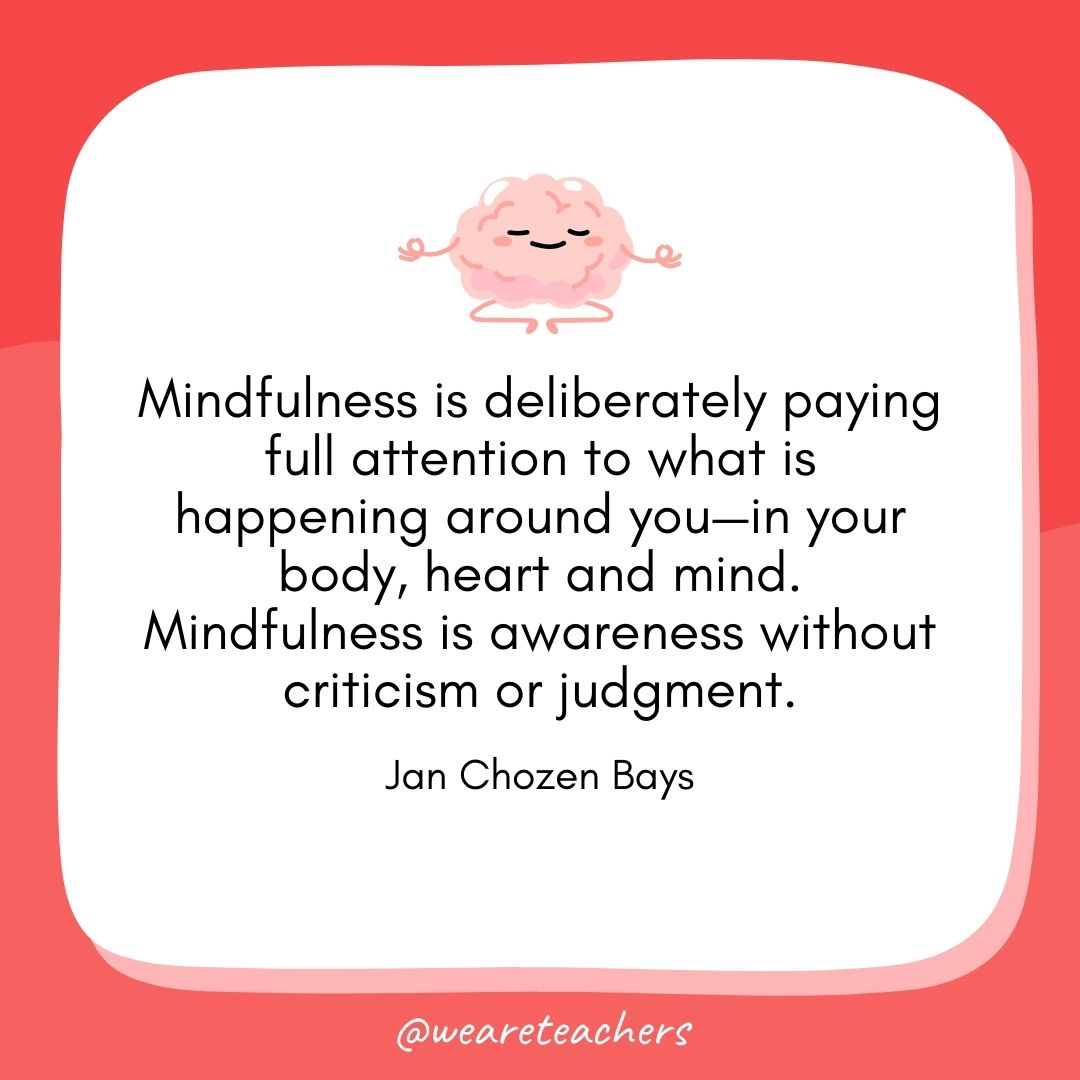
50. The organic gardener does not think of throwing away the garbage. … She is capable of transforming the garbage into compost, so that the compost can turn into lettuce, cucumber, radishes, and flowers again. … With the energy of mindfulness, you can look into the garbage and say: I am not afraid. — Nhat Hanh
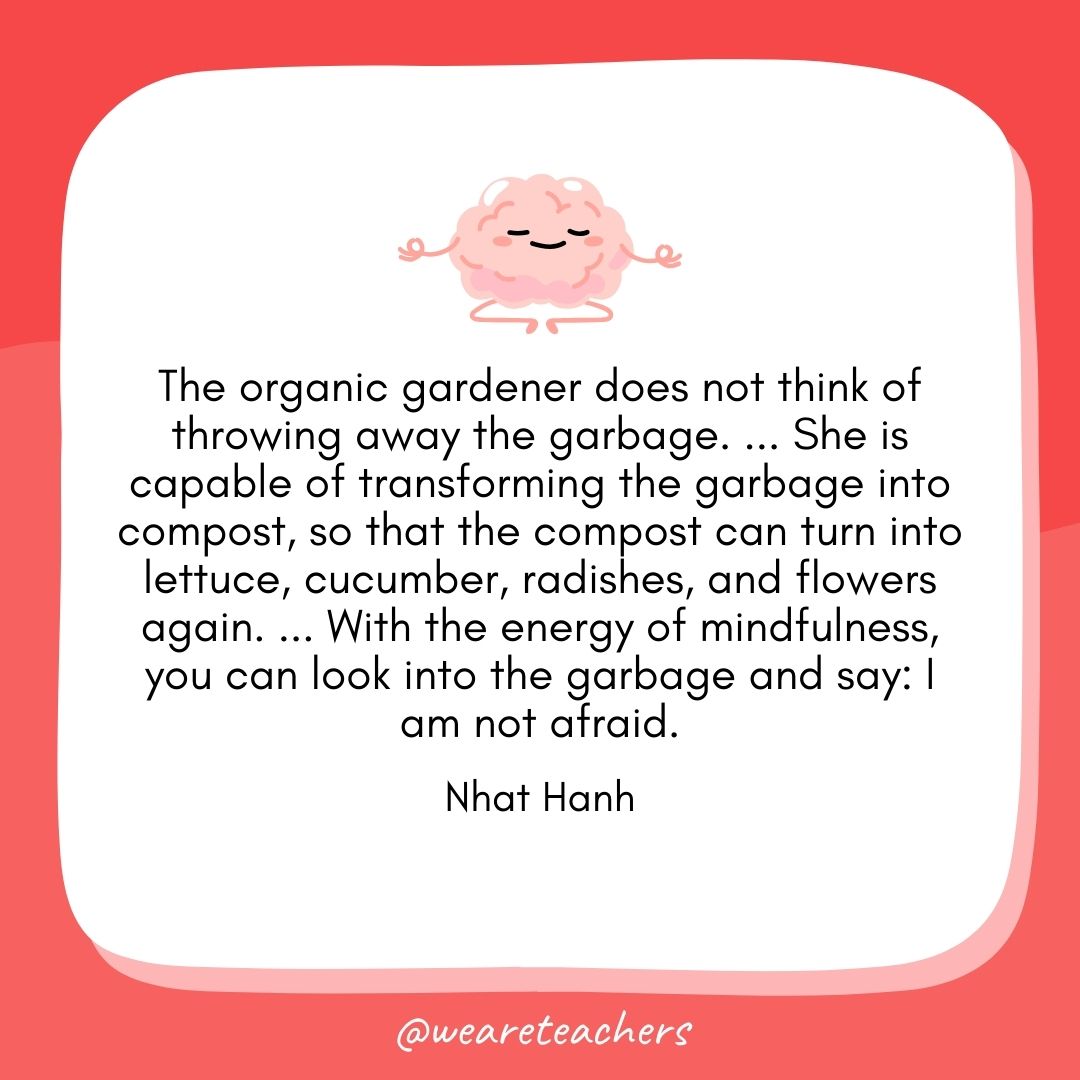
51. The development of our minds and our destination in future lives is in our hands. No one else can help us. It is very important that we each take responsibility for ourselves. Sustain mindfulness 24 hours a day. Thank you. That is all. — Tenzin Gyatso, 14th Dalai Lama
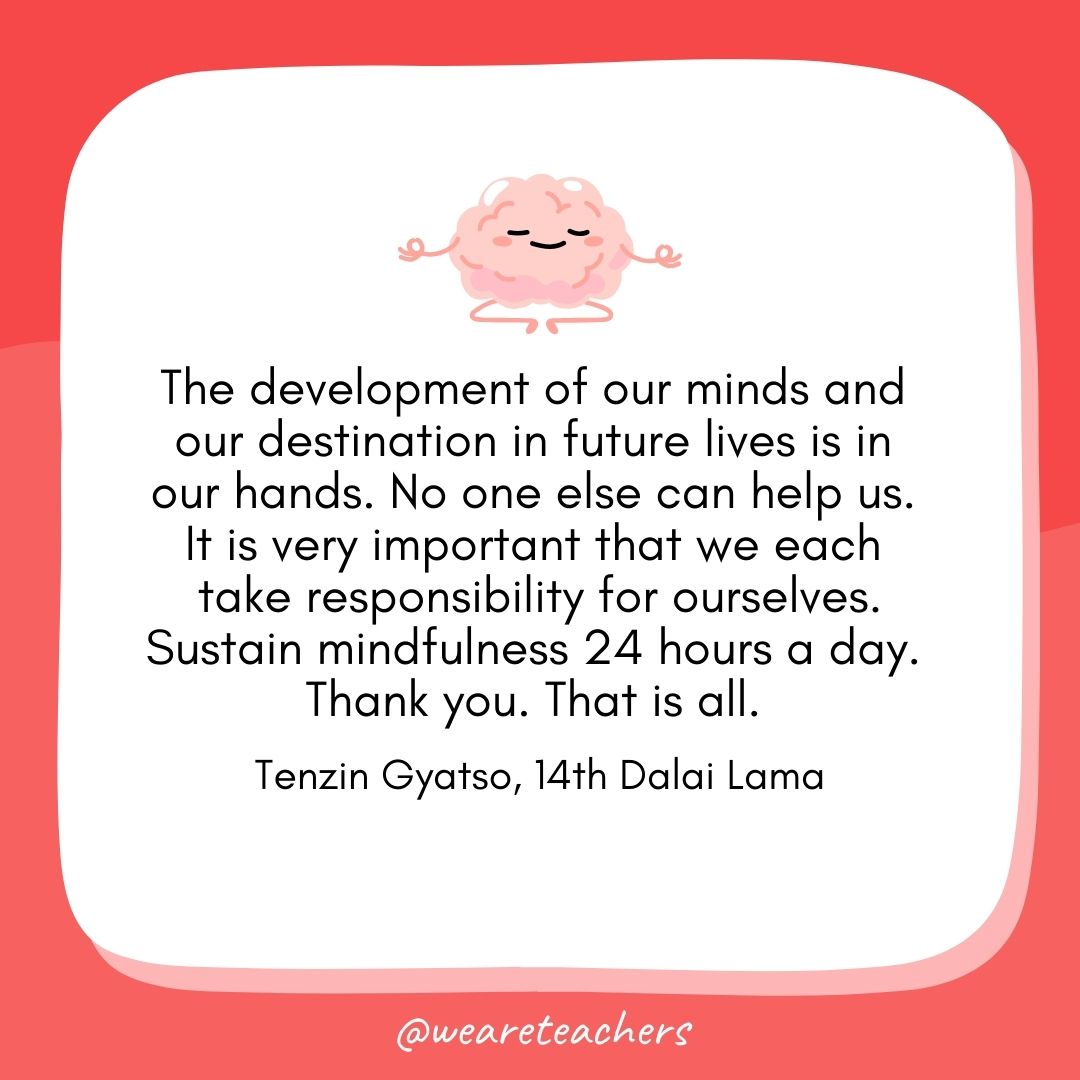
52. Teaching is an instinctual art, mindful of potential, craving of realizations, a pausing, seamless process. — A. Bartlett Giamatti
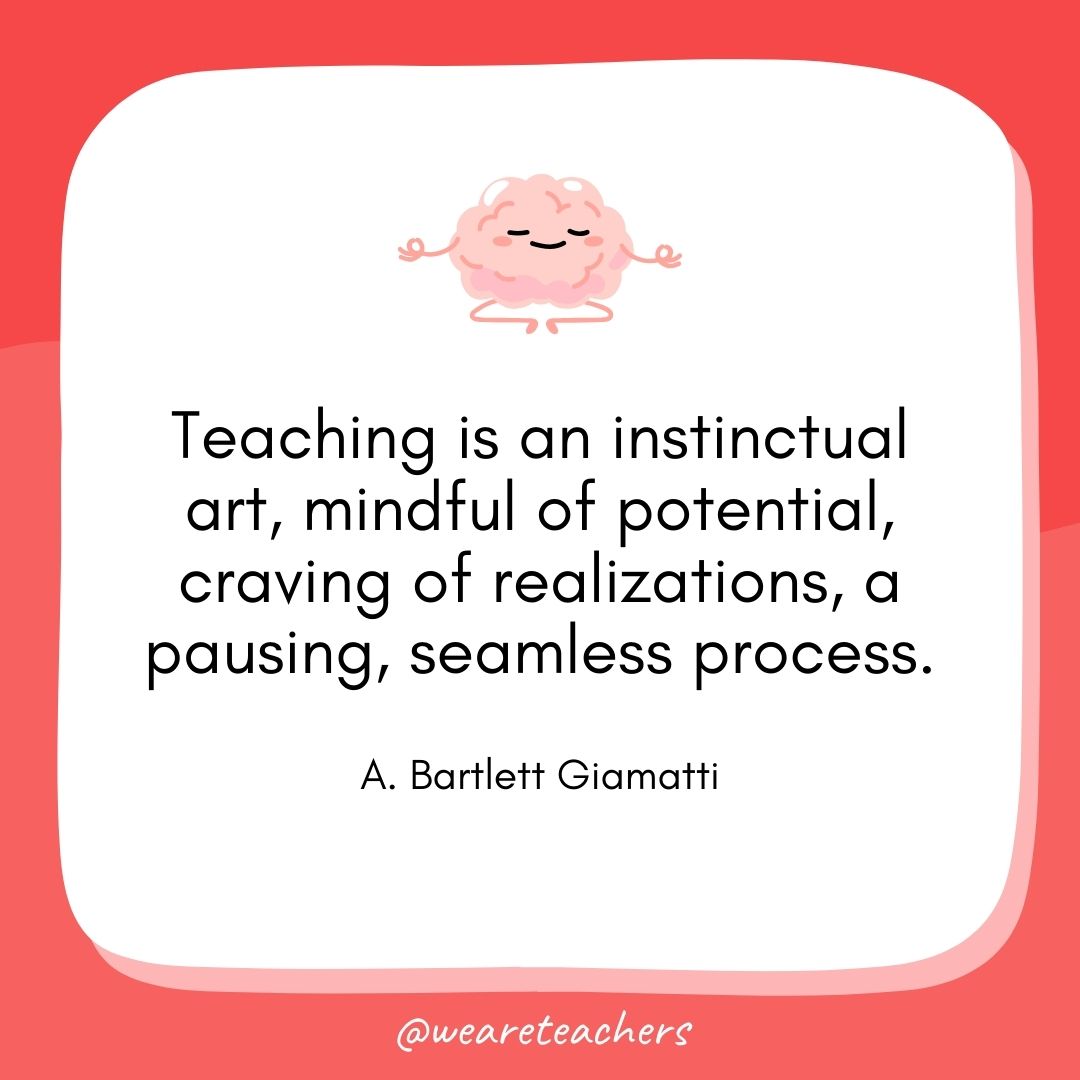
53. Let go of your mind and then be mindful. Close your ears and listen! — Rumi
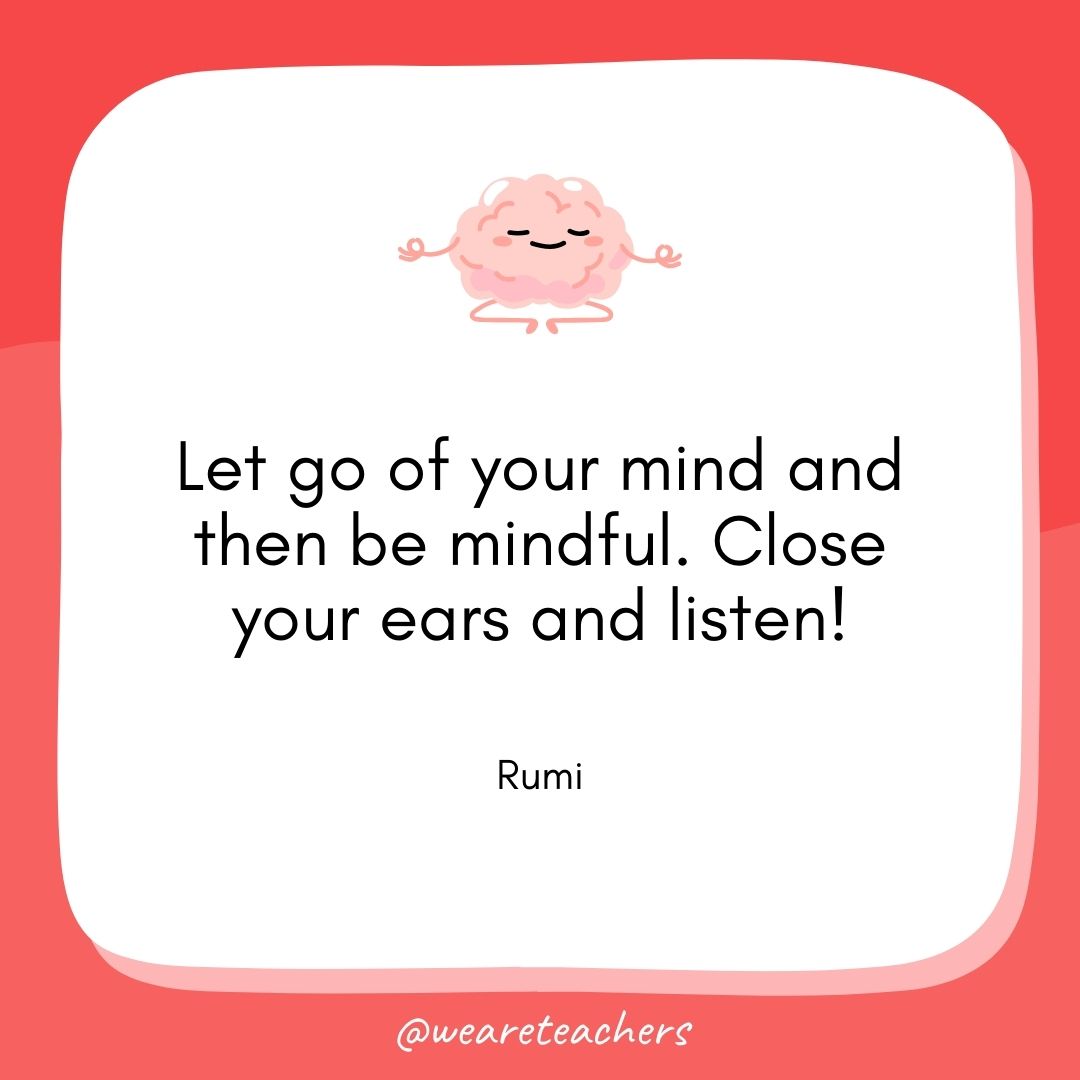
54. The most powerful mind is the quiet mind. It is the mind that is present, reflective, mindful of its thoughts and its state. It doesn’t often multitask, and when it does, it does so with a purpose. — Maria Konnikova
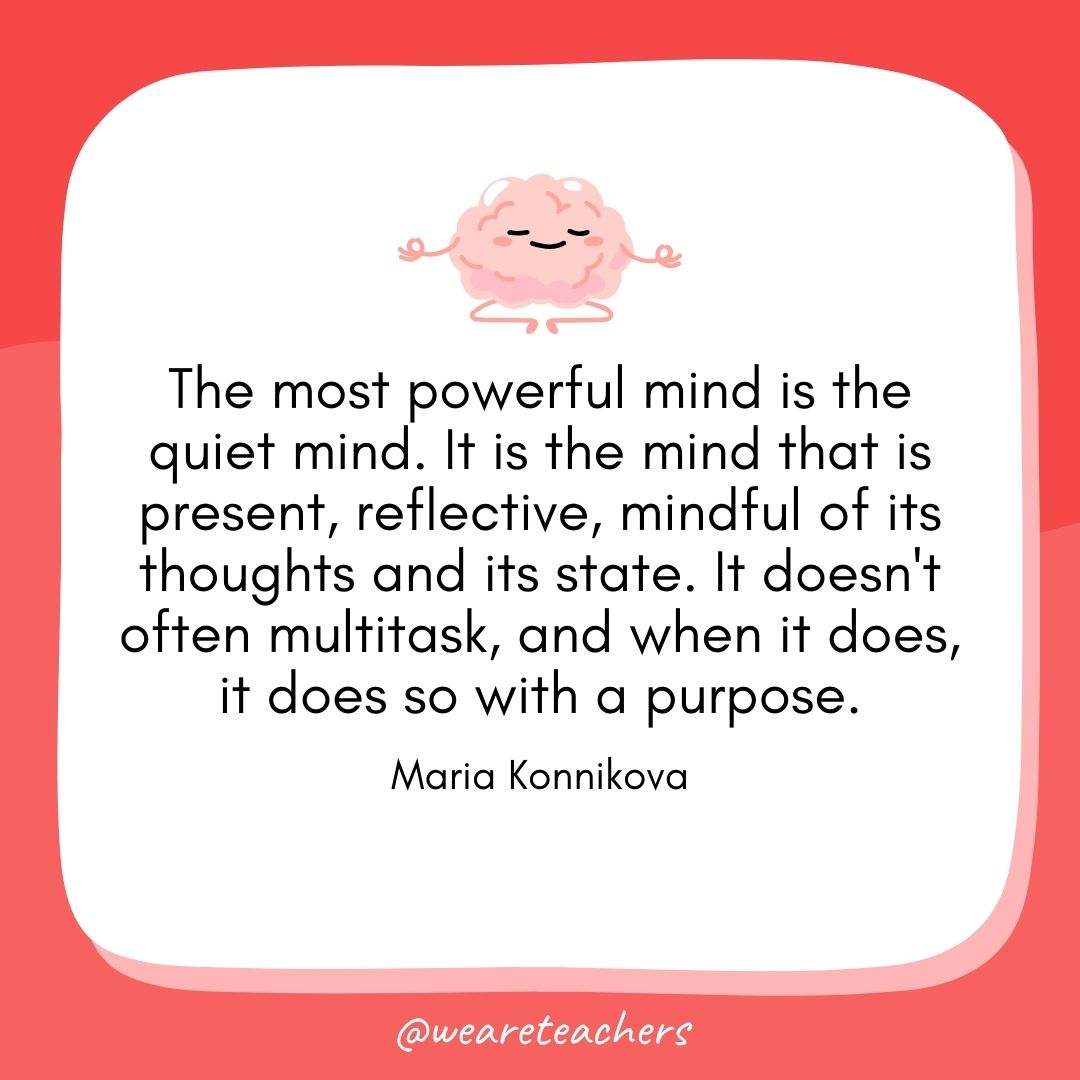
55. The way you speak to others can offer them joy, happiness, self-confidence, hope, trust, and enlightenment. Mindful speaking is a deep practice. — Nhat Hanh
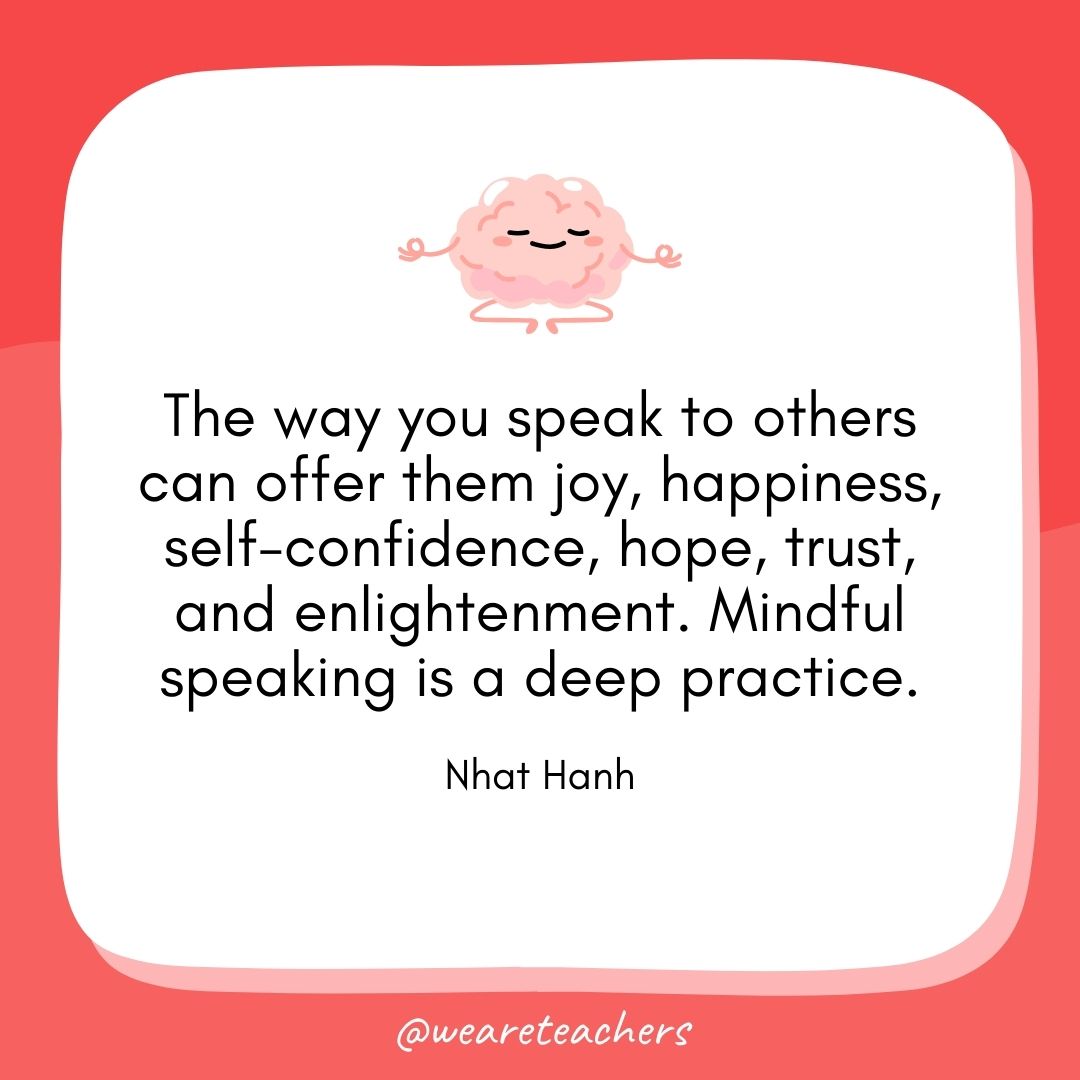
56. When we are mindful of every nuance of our natural world, we finally get the picture: that we are only given one dazzling moment of life here on Earth, and we must stand before that reality both humbled and elevated. — Elizabeth Gilbert
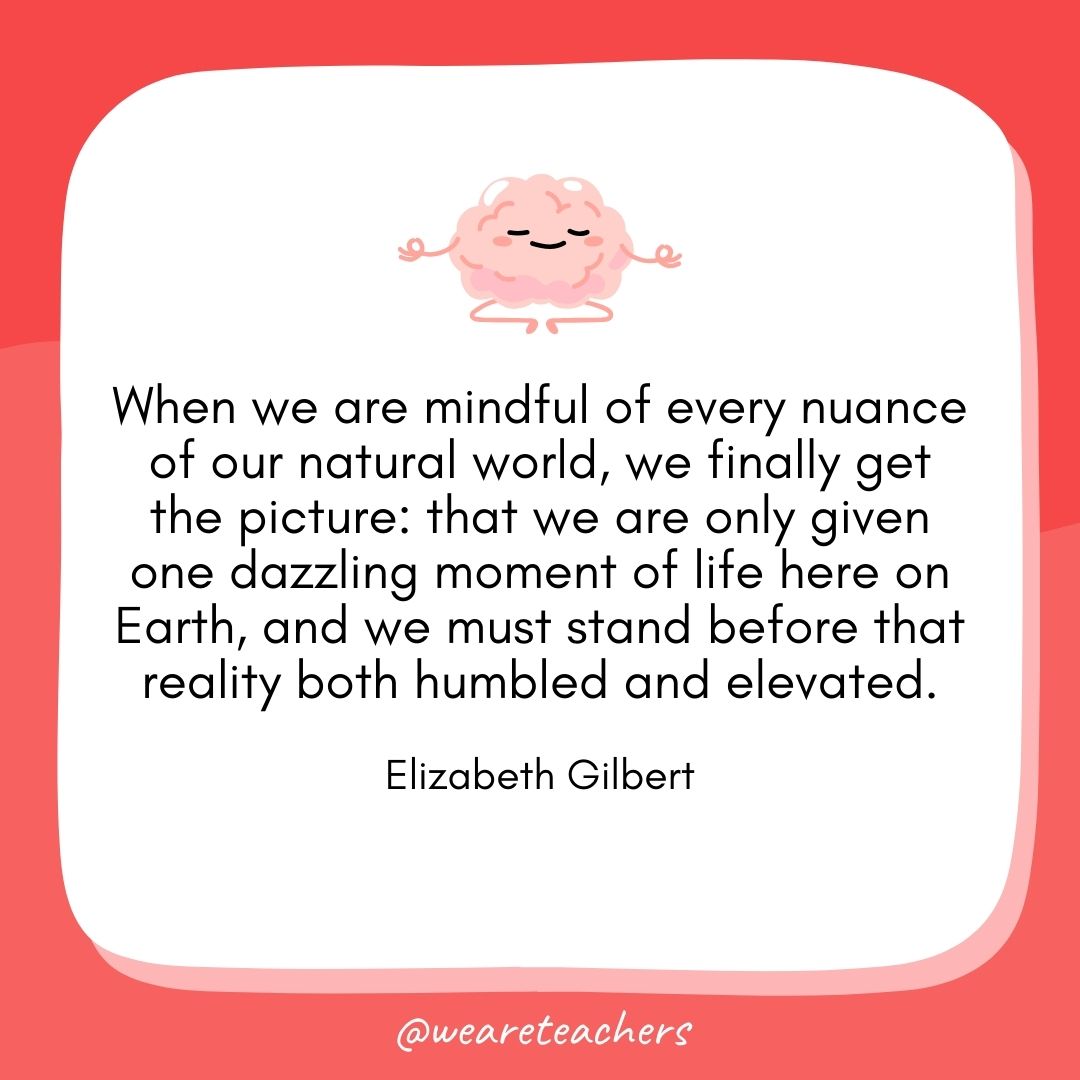
57. Love and concern for all are not things some of us are born with and others are not. Rather, they are results of what we do with our minds: We can choose to transform our minds so that they embody love, or we can allow them to develop habits and false concepts of separation. — Sharon Salzberg
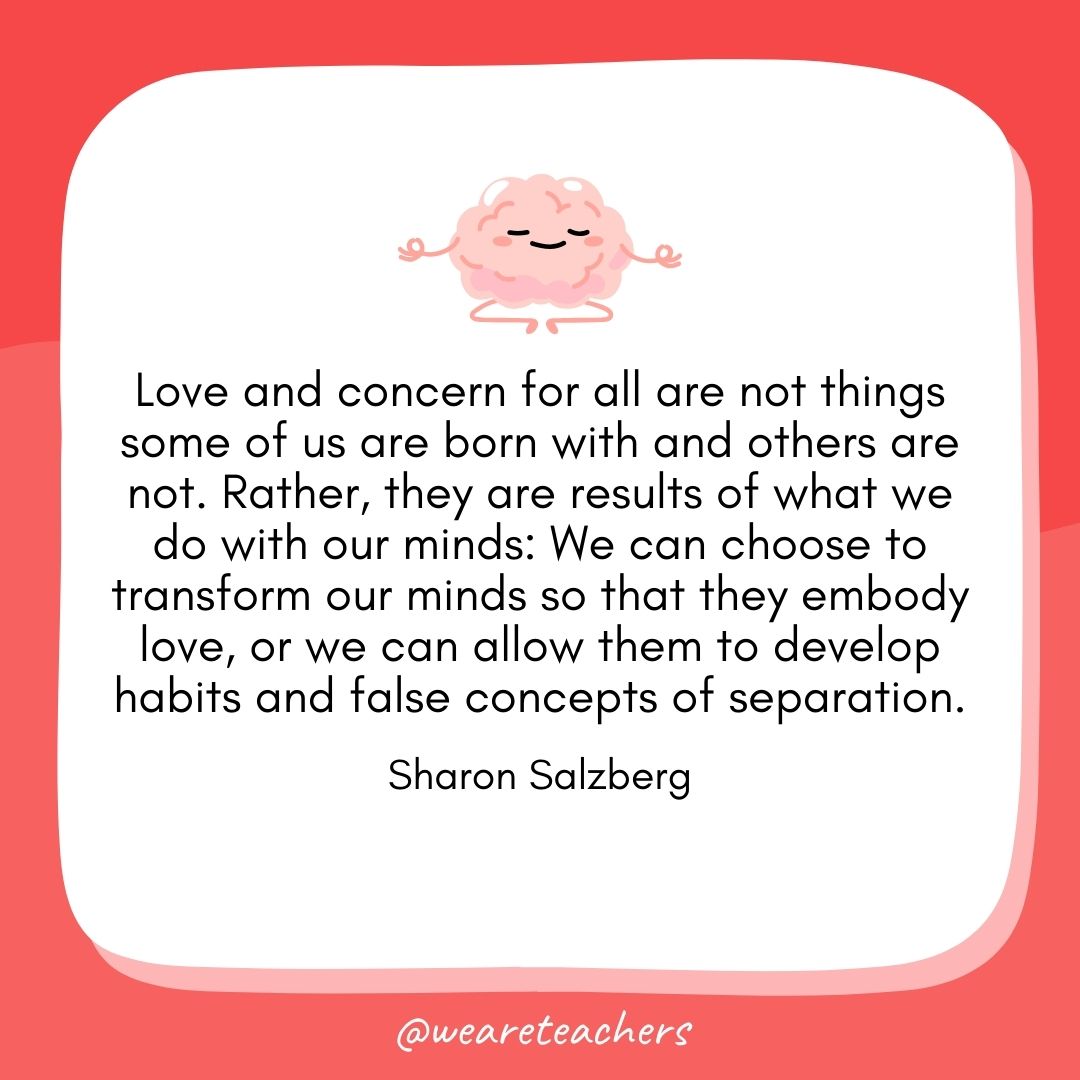
58. Be mindful at all times of the following: the nature of the whole universe, the nature of the part that is me, the relation of the one to the other, the one so vast, the other so small. — Marcus Aurelius
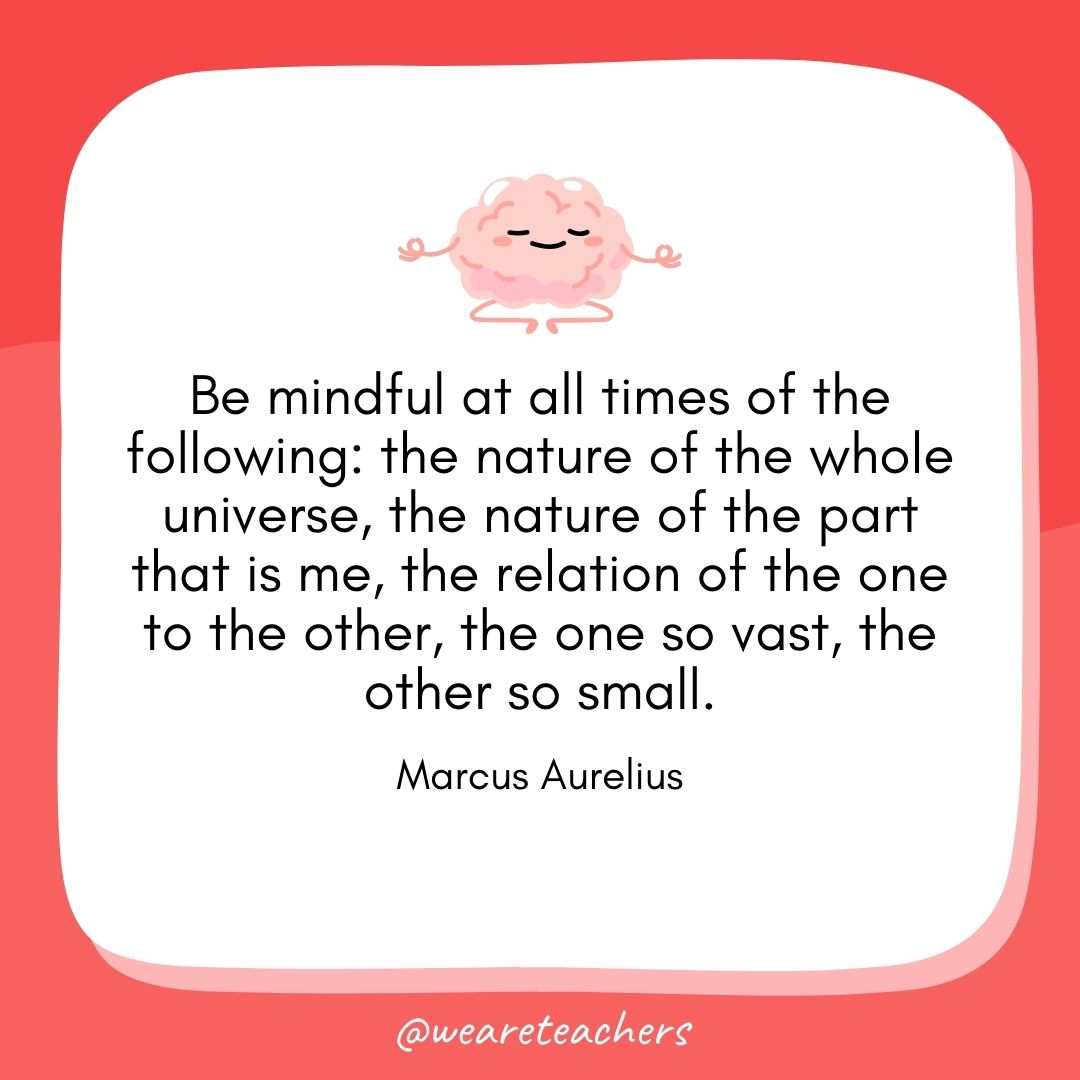
59. The essence of boredom is to be found in the obsessive search for novelty. Satisfaction lies in mindful repetition, the discovery of endless richness in subtle variations on familiar themes. — George Leonard
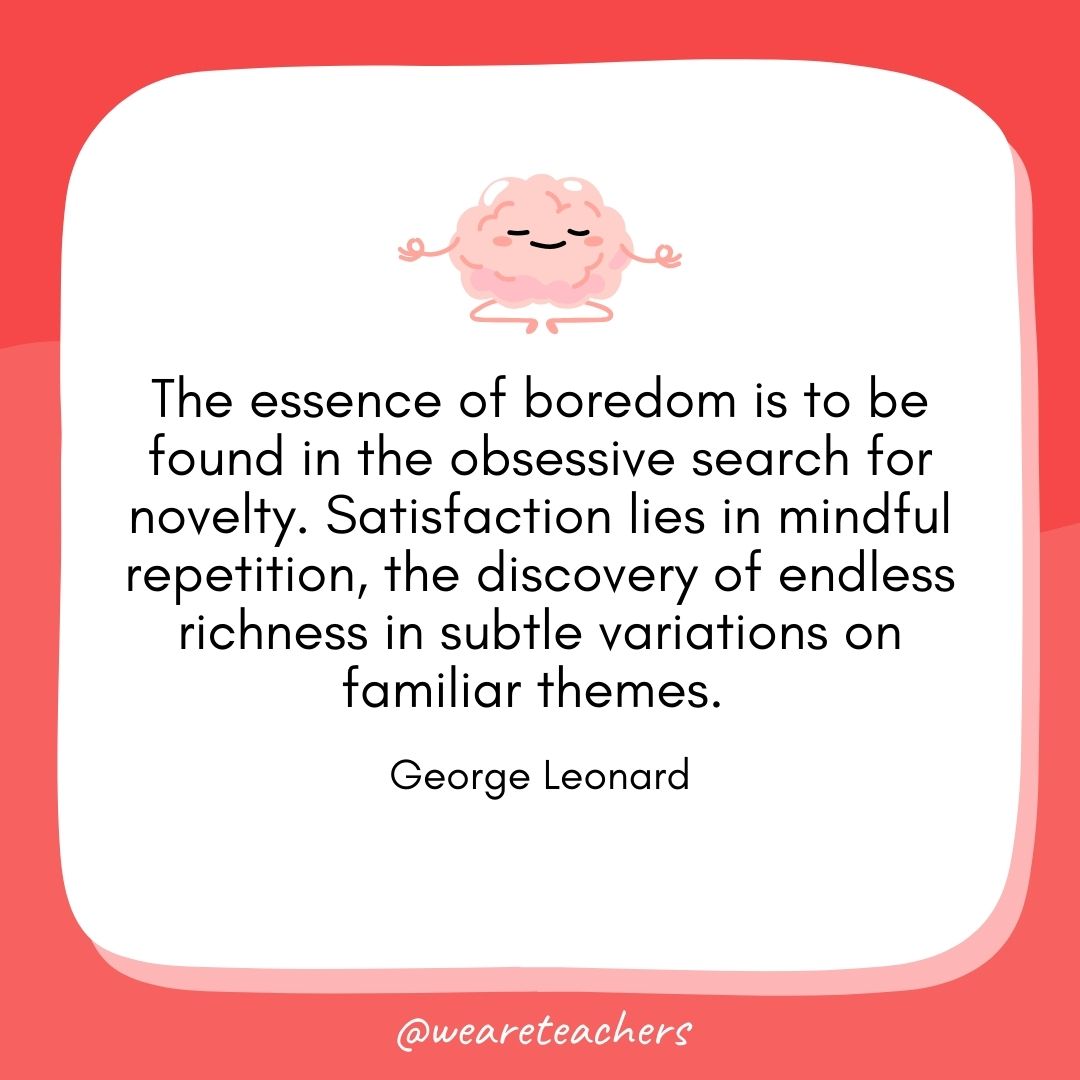
60. Our life is our own today, tomorrow you will be dust, a shade, and a tale that is told. Live mindful of death; the hour flies. — Persius
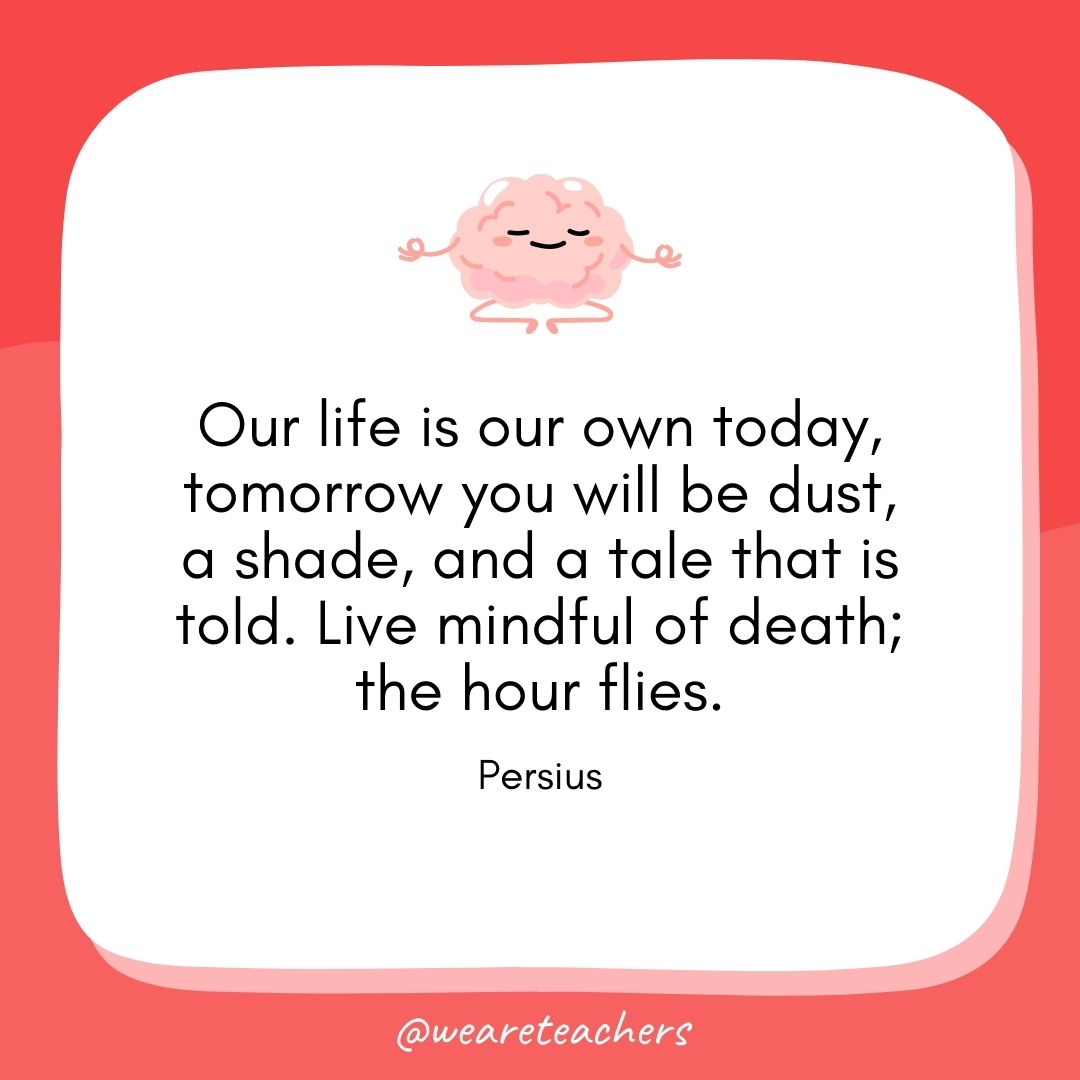
61. The pebble
is a perfect creature
equal to itself mindful of its limits
filled exactly
with a pebbly meaning.
— Zbigniew Herbert
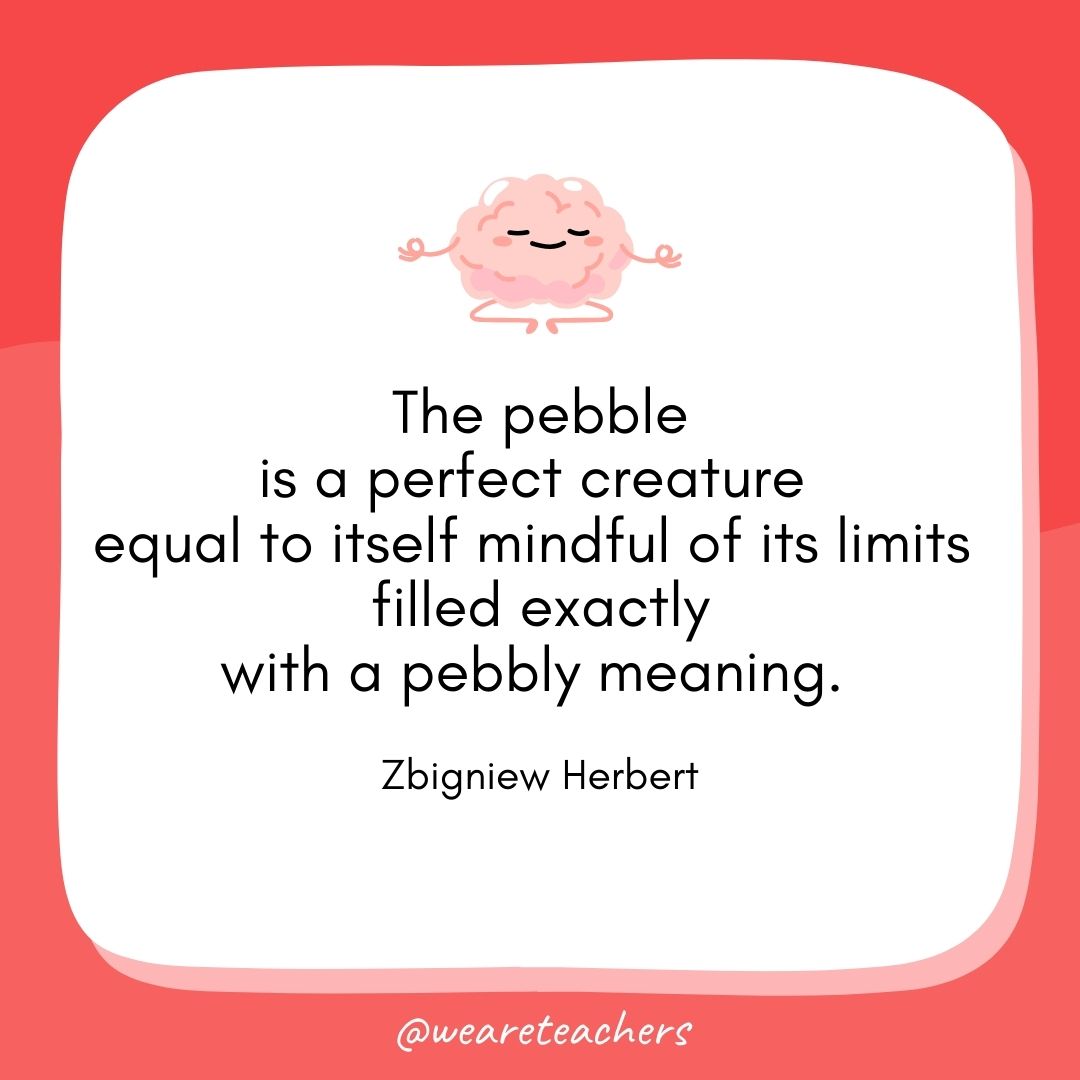
62. As we encounter new experiences with a mindful and wise attention, we discover that one of three things will happen to our new experience: it will go away, it will stay the same, or it will get more intense. Whatever happens does not really matter. — Jack Kornfield
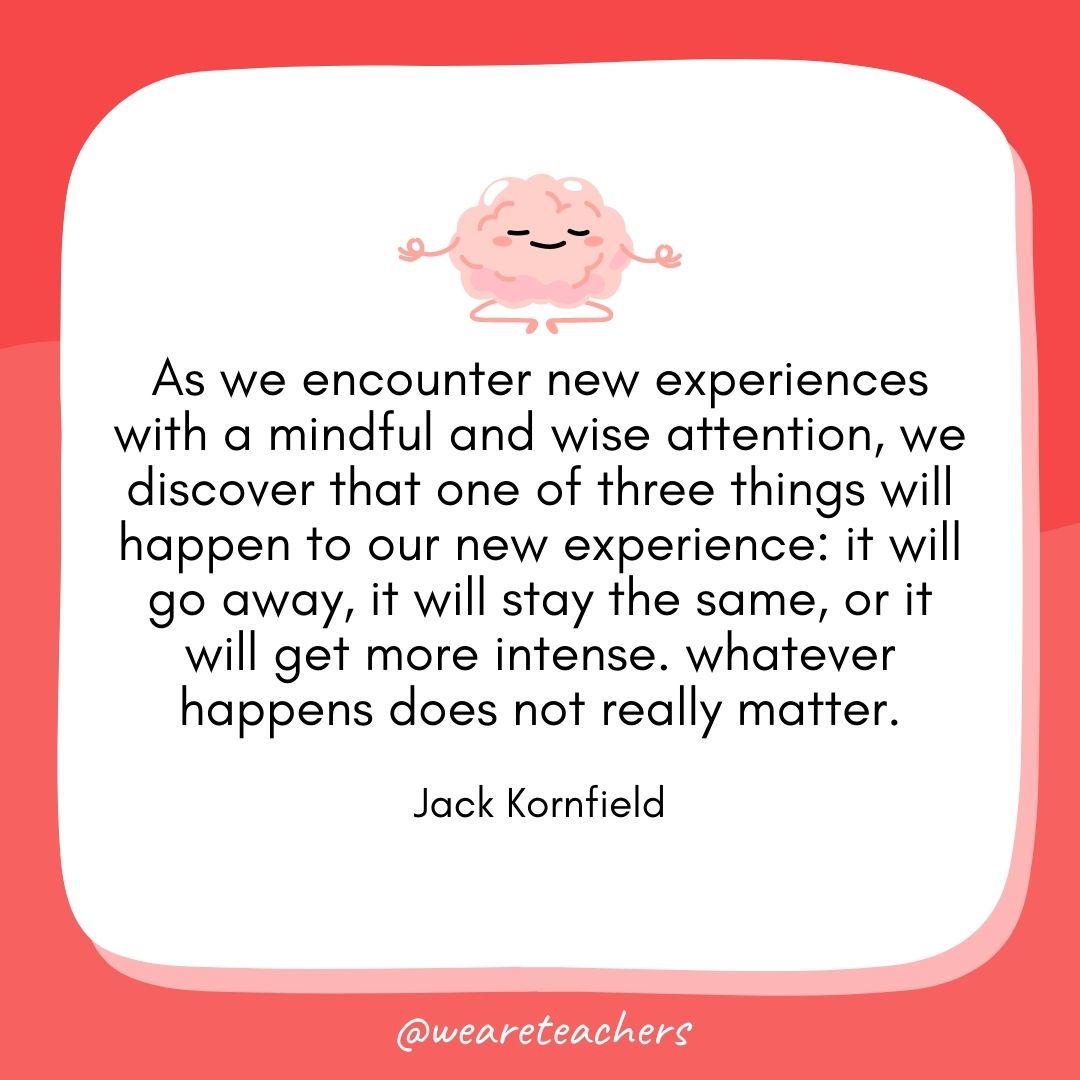
63. Mindful grief means mourning and letting go of the past without expectation, fear, censure, blame, shame, control and so forth. Without such mindful grief, neither past nor person can be laid to rest. — David Richo
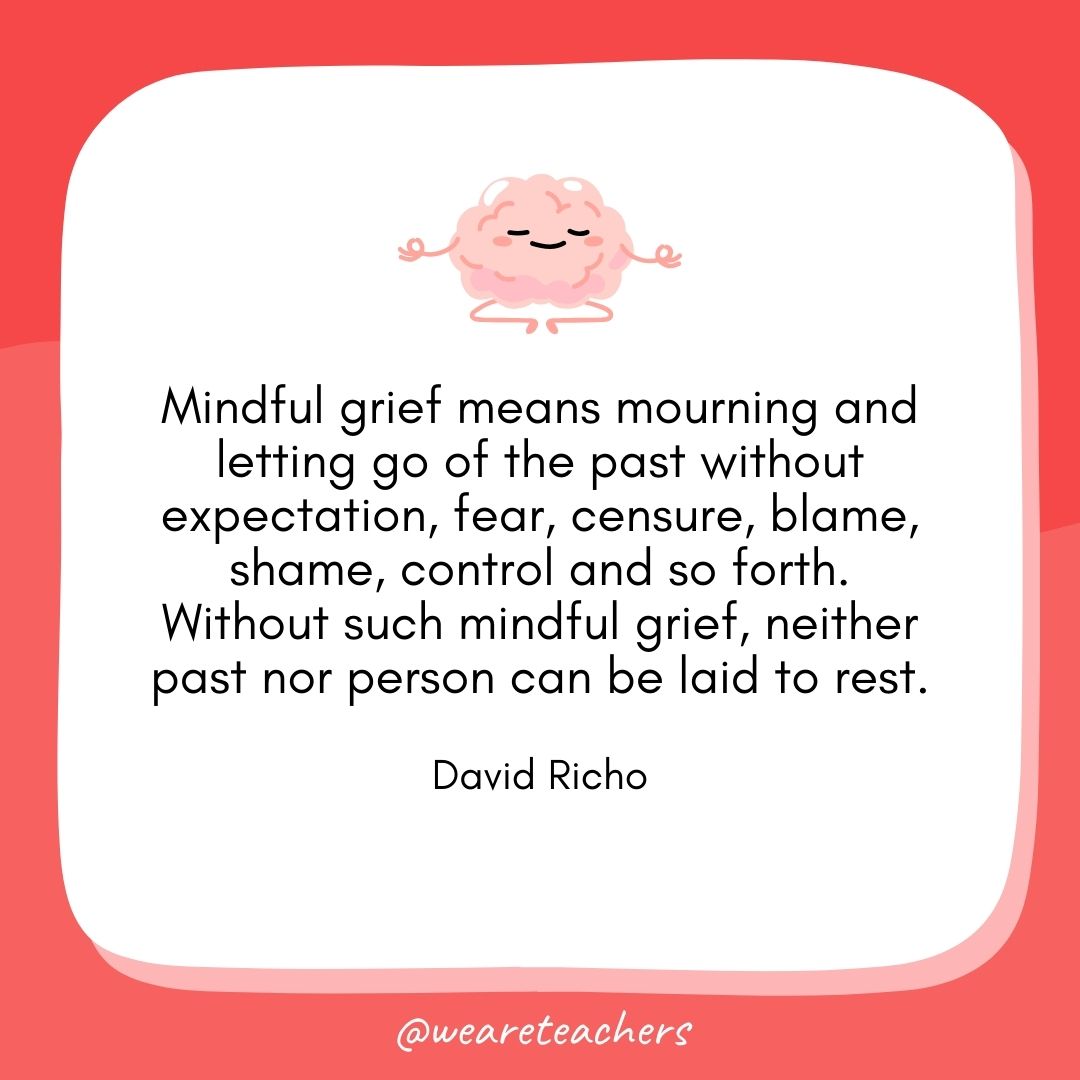
64. Mindful time spent with the person we love is the fullest expression of true love and real generosity. — Nhat Hanh
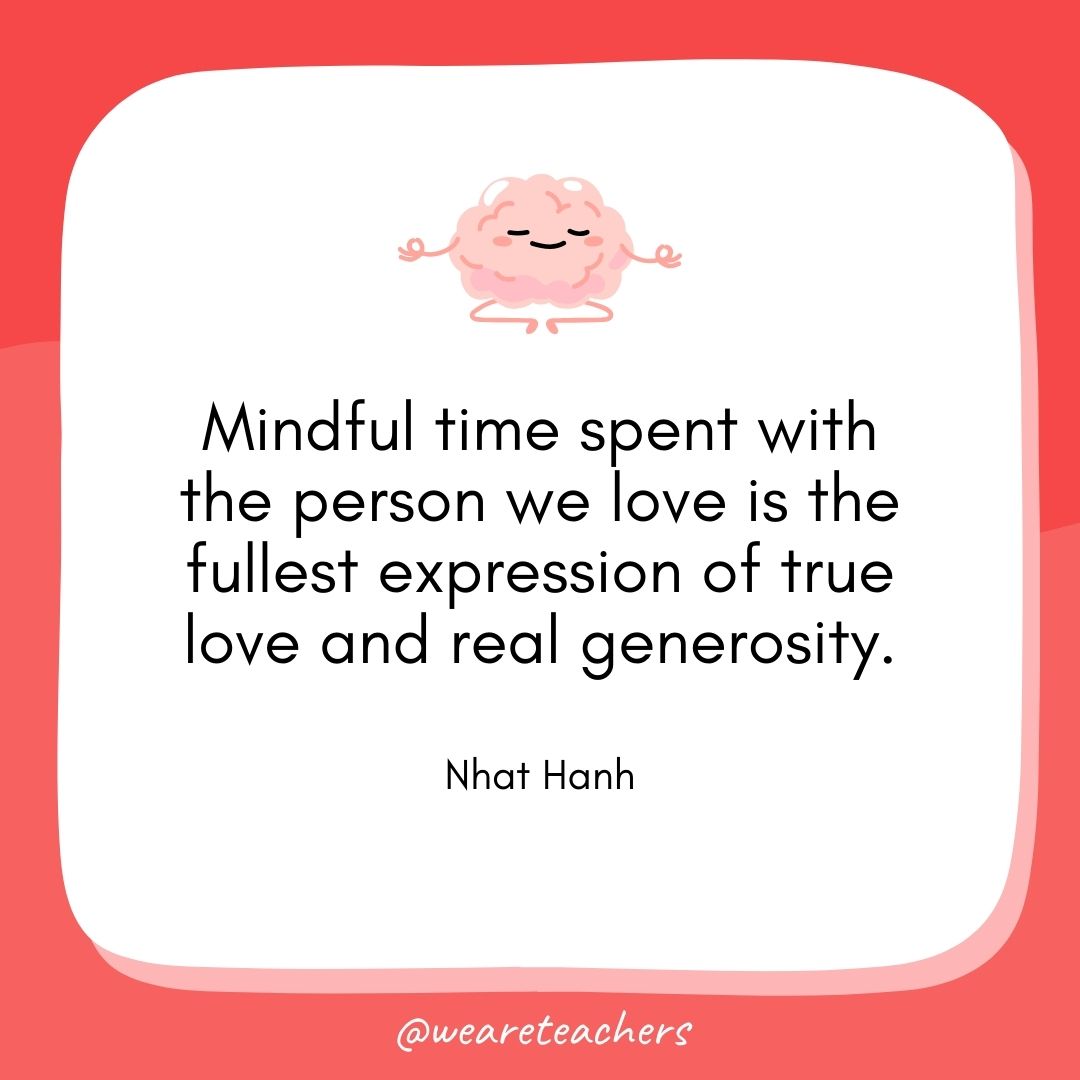
65. Be mindful of the words that you use and the actions that you live and who you are and how it is you use your power. Keep clear at all times that you are what you say you are. — Gary Zukav
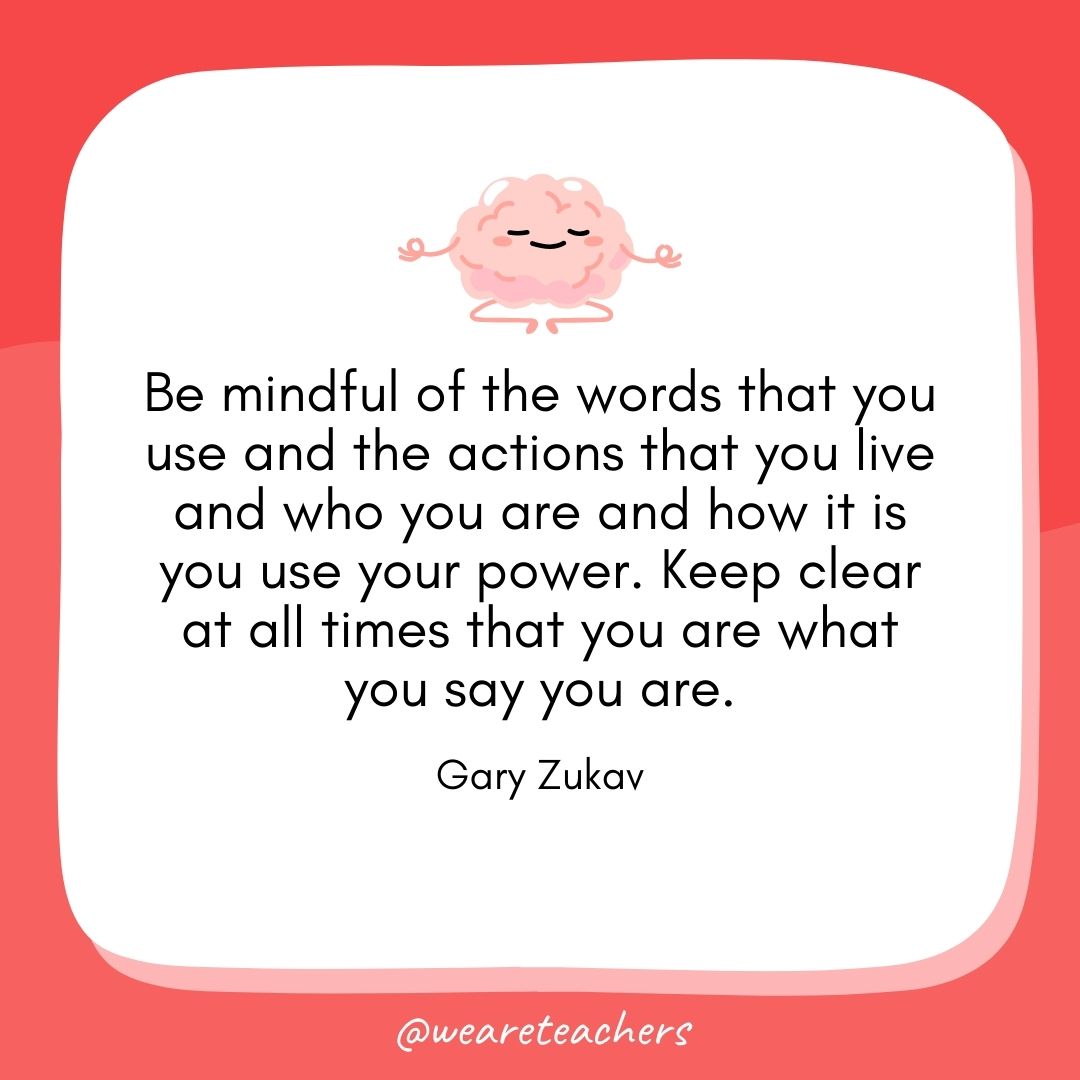
66. As Seneca put it, life does not pause to remind you that it is running out. The only one who can keep you mindful of this is you. — Sarah Bakewell
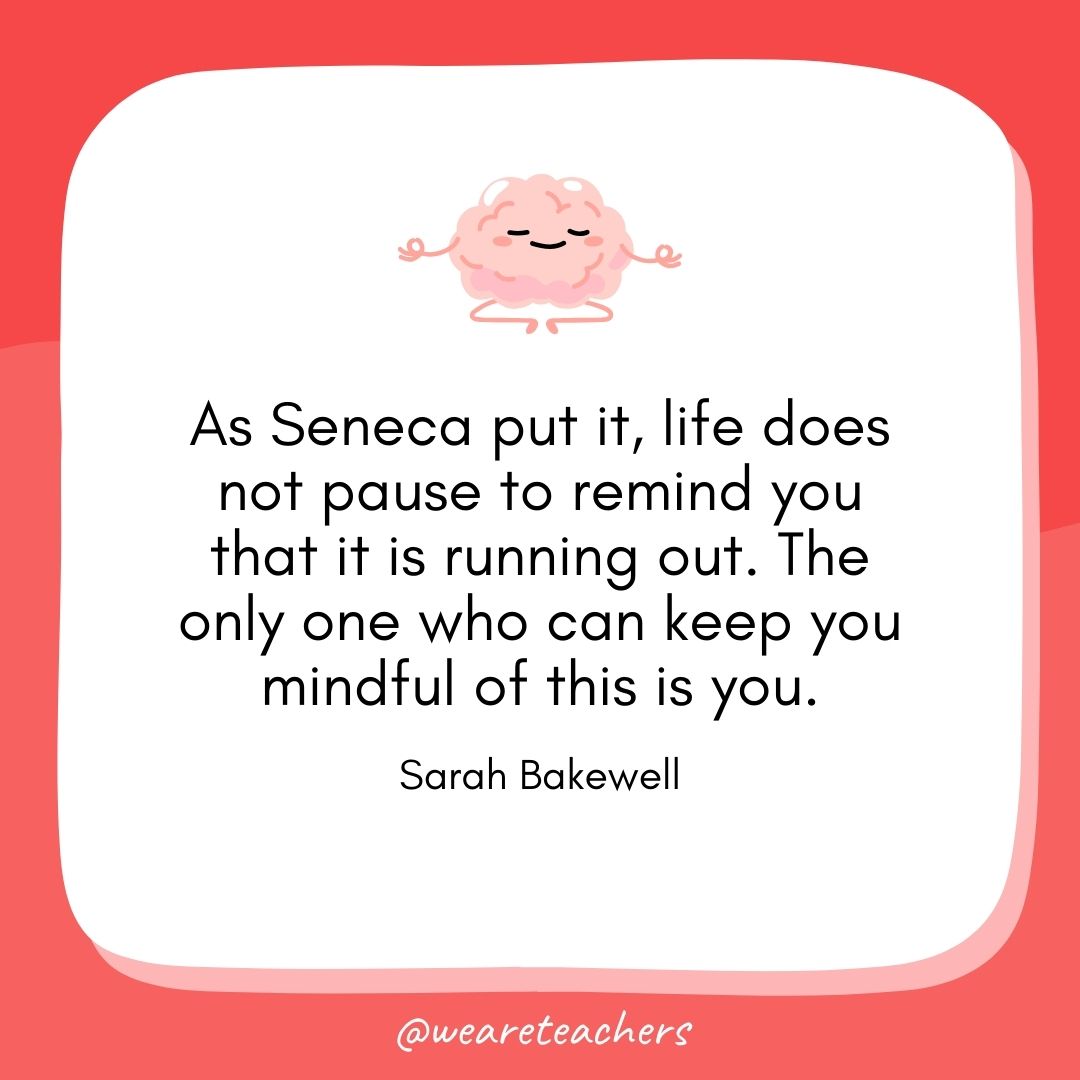
67. It is more profitable to be mindful of our own faults than of those of our age. — John Lancaster Spalding

68. Choose to be in touch with what is wonderful, refreshing, and healing within yourself and around you. — Nhat Hanh
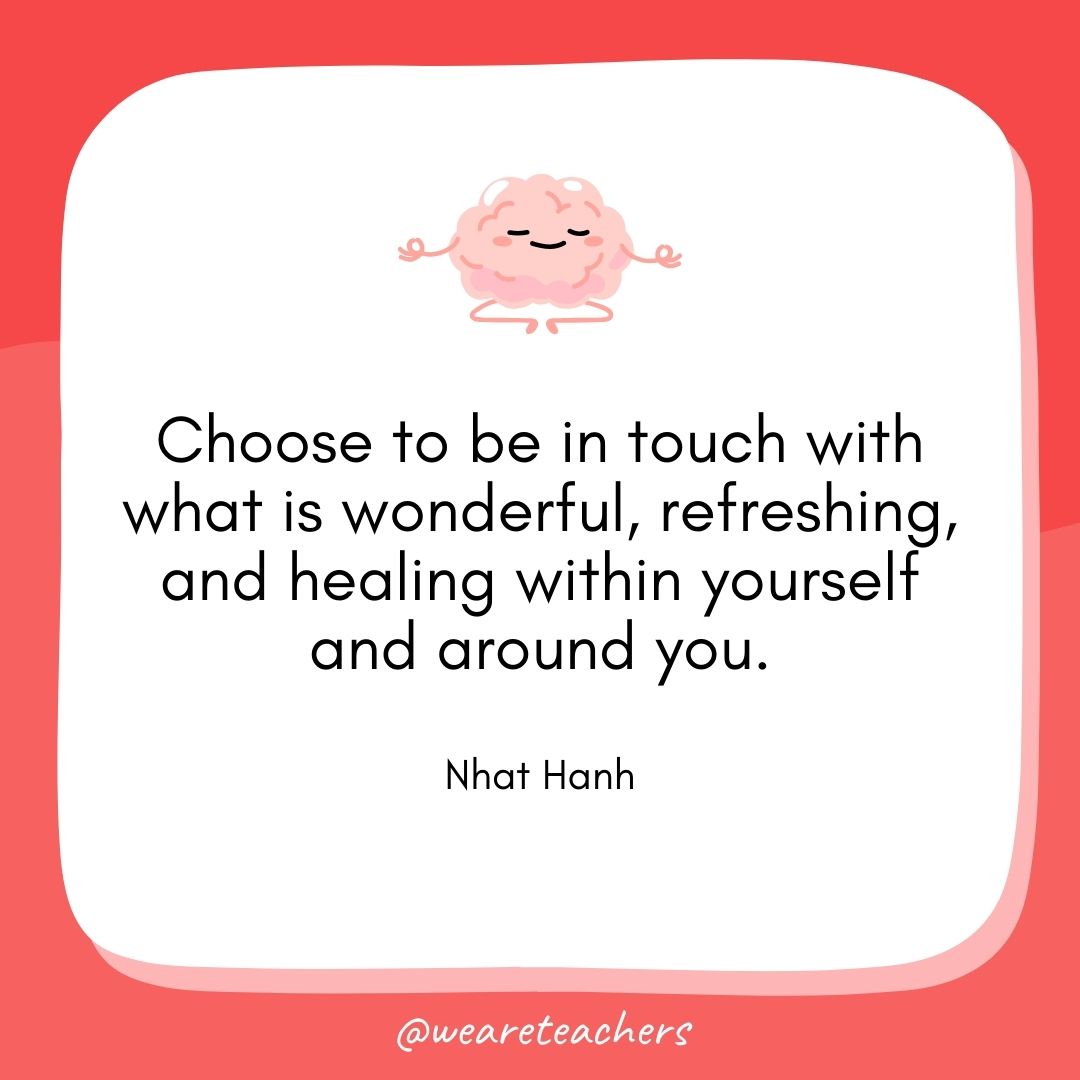
69. In mindful grief, we become the landing strip that allows any feelings to arrive. Some crash, some land softly. Some harm us, but none harm us in a lasting way. We remain as they taxi away or as their wreckage is cleared away. We can trust that we will survive. — David Richo

70. Whatever the present moment contains, accept it as if you had chosen it. — Eckhart Tolle
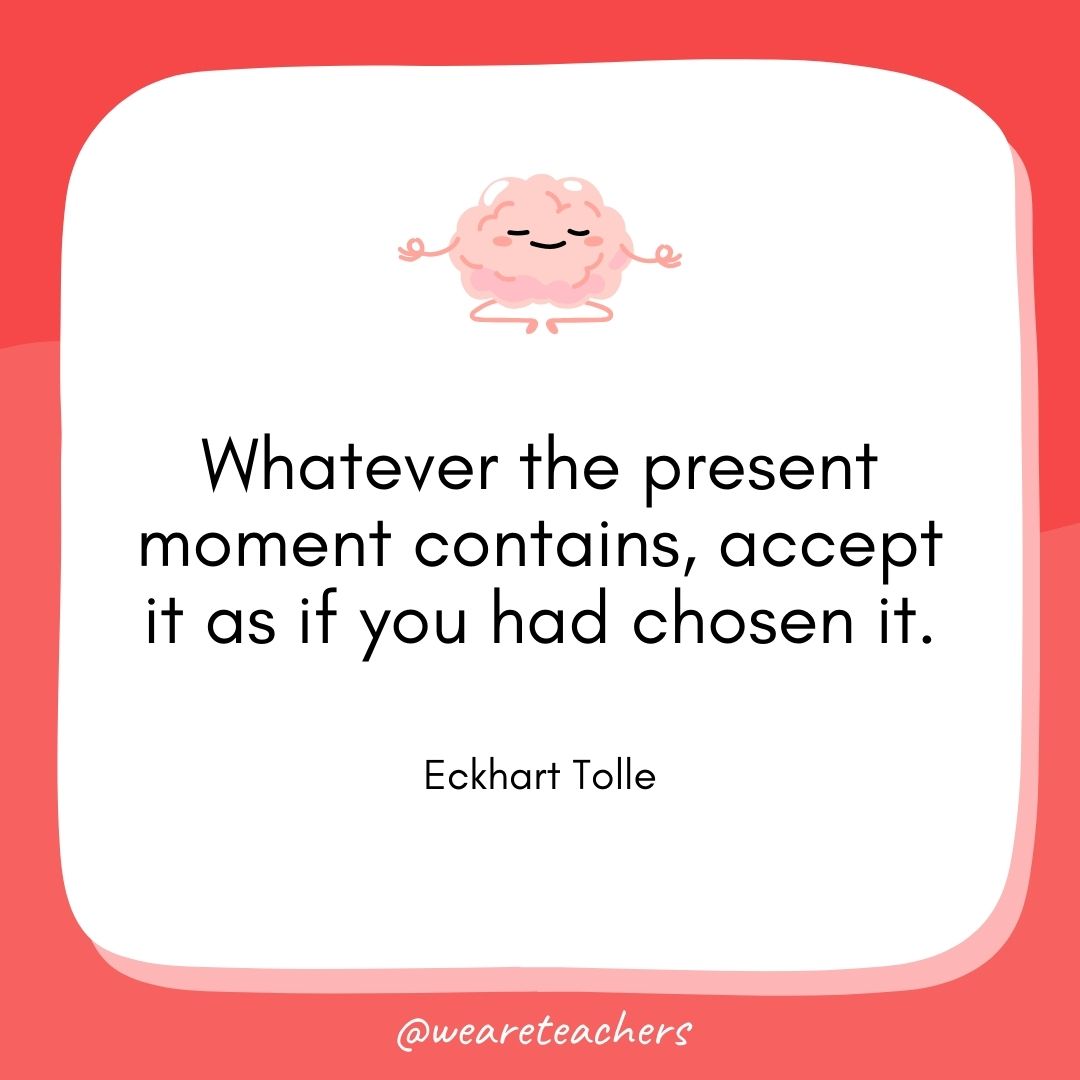
71. Any kind of material form whatever, whether past, future, or present, internal or external, gross or subtle, inferior or superior, far or near, all material form should be seen as it actually is with proper wisdom thus: This is not mine, this I am not, this is not my self. — Gautama Buddha
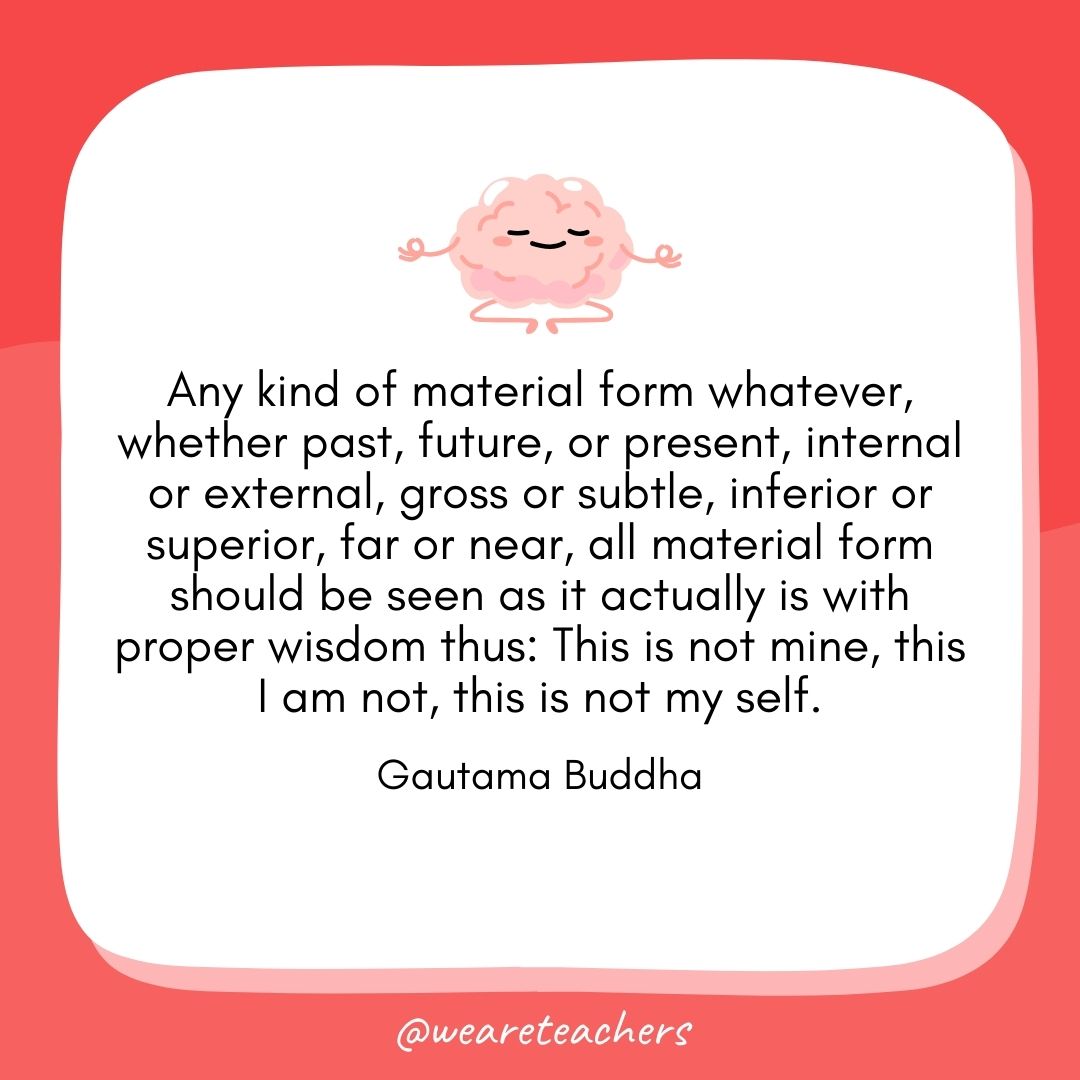
72. How do we cultivate the conditions for joy to expand? We train in staying present. — Pema Chödrön

73. When we eat mindfully, we consume exactly what we need to keep our bodies, our minds, and the Earth healthy. When we practice like this, we reduce suffering for ourselves and for others. — Nhat Hanh
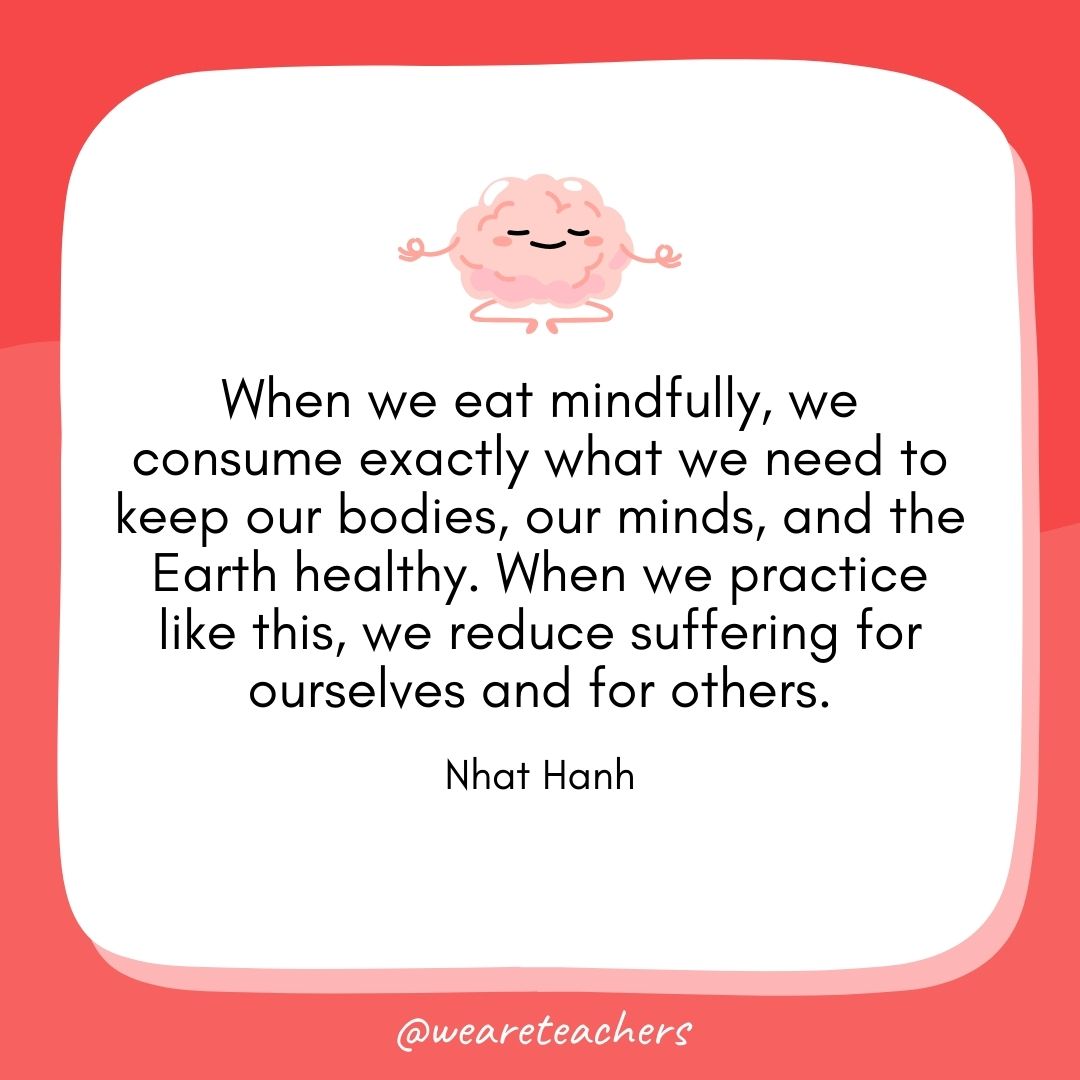
74. Be empty of worrying. Think of who created thought! Why do you stay in prison when the door is so wide open? — Rumi
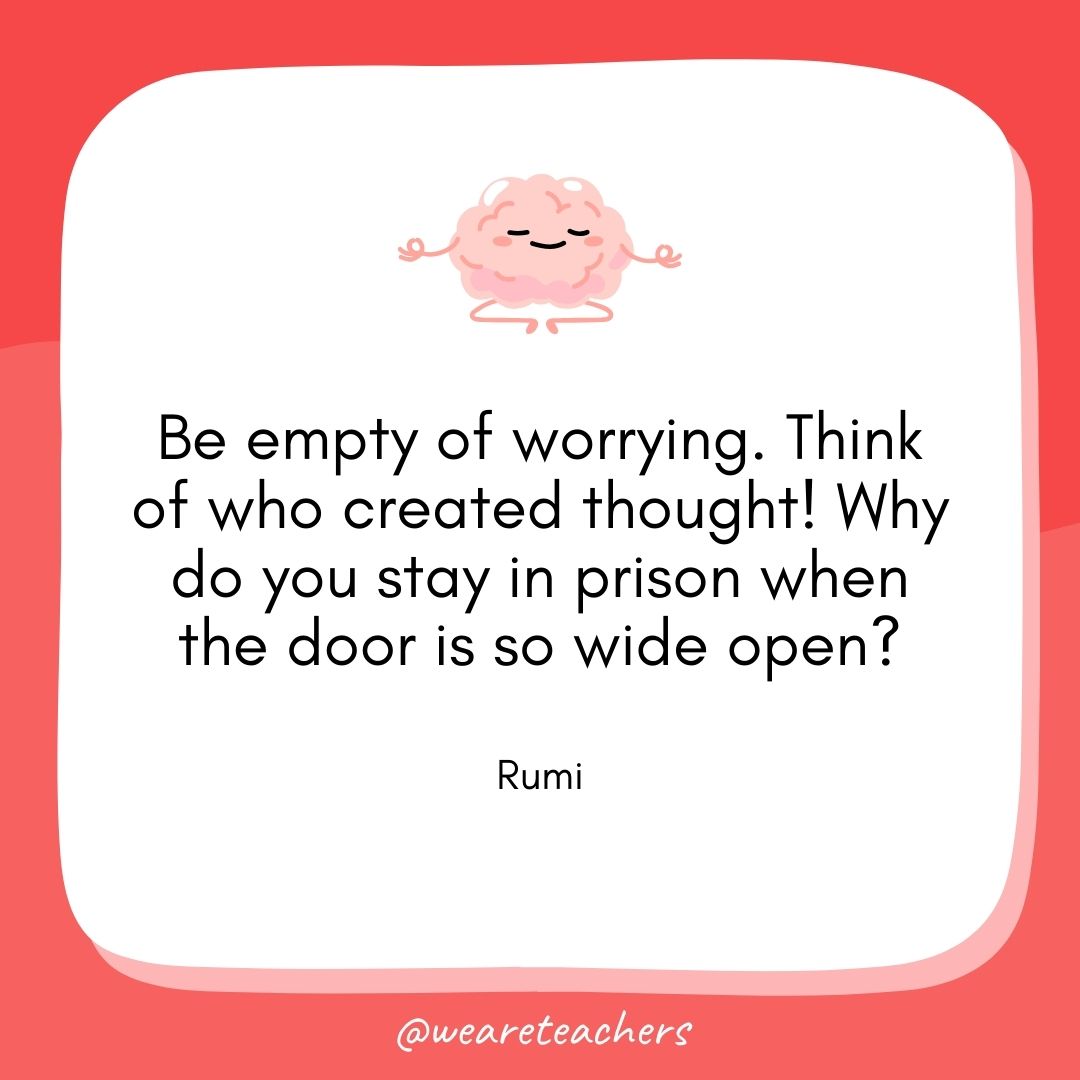
75. The mind is desperate to fix the river [of events] in place: Possessed by ideas of the past, preoccupied with images of the future, it overlooks the plain truth of the moment. — Lao Tzu
![The mind is desperate to fix the river [of events] in place: Possessed by ideas of the past, preoccupied with images of the future, it overlooks the plain truth of the moment. The mind is desperate to fix the river [of events] in place: Possessed by ideas of the past, preoccupied with images of the future, it overlooks the plain truth of the moment.](https://www.weareteachers.com/wp-content/uploads/75-36.jpg)
76. Realize deeply that the present moment is all you ever have. Make the Now the primary focus of your life. — Eckhart Tolle
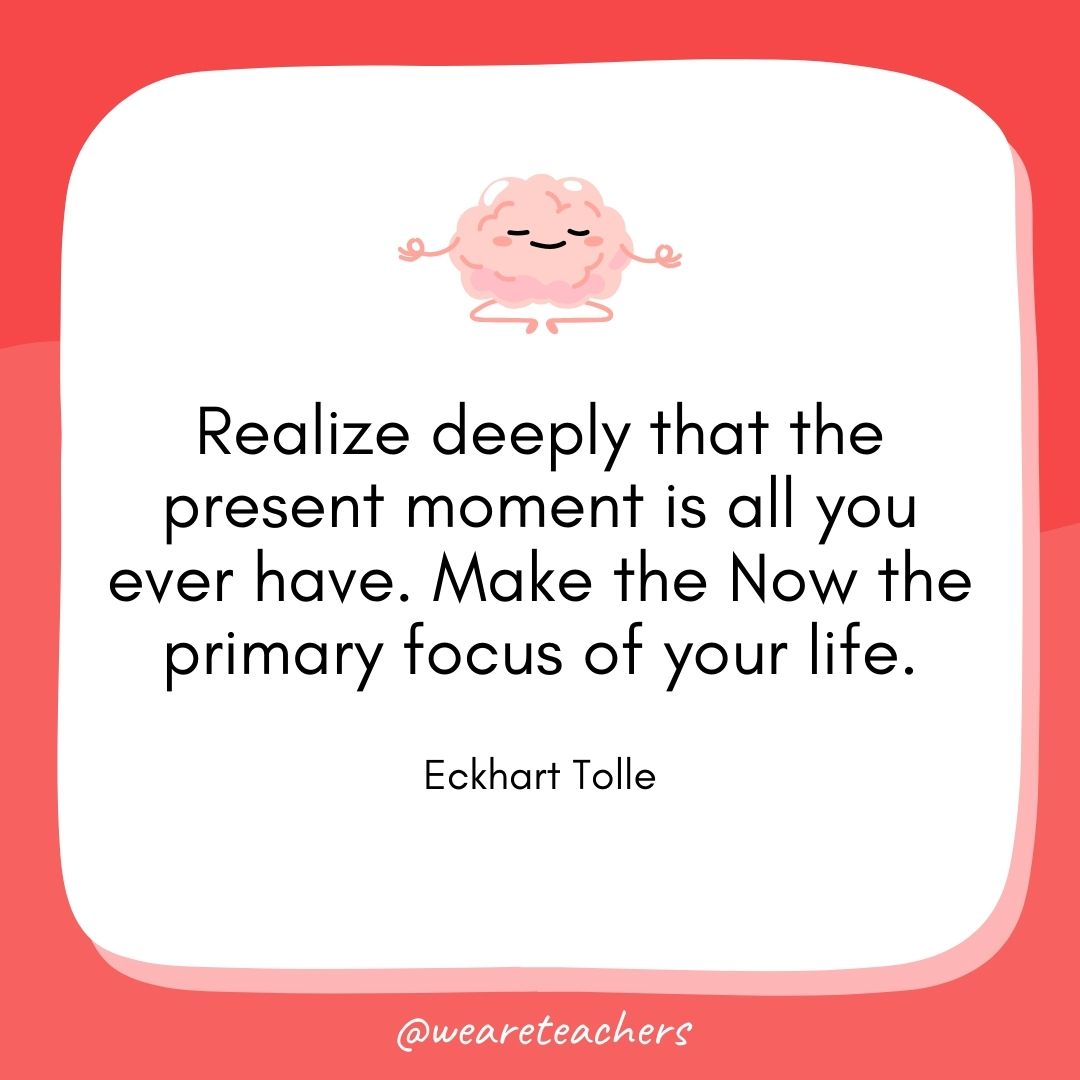
77. Freedom is not given to us by anyone; we have to cultivate it ourselves. It is a daily practice. … No one can prevent you from being aware of each step you take or each breath in and breath out. — Nhat Hanh
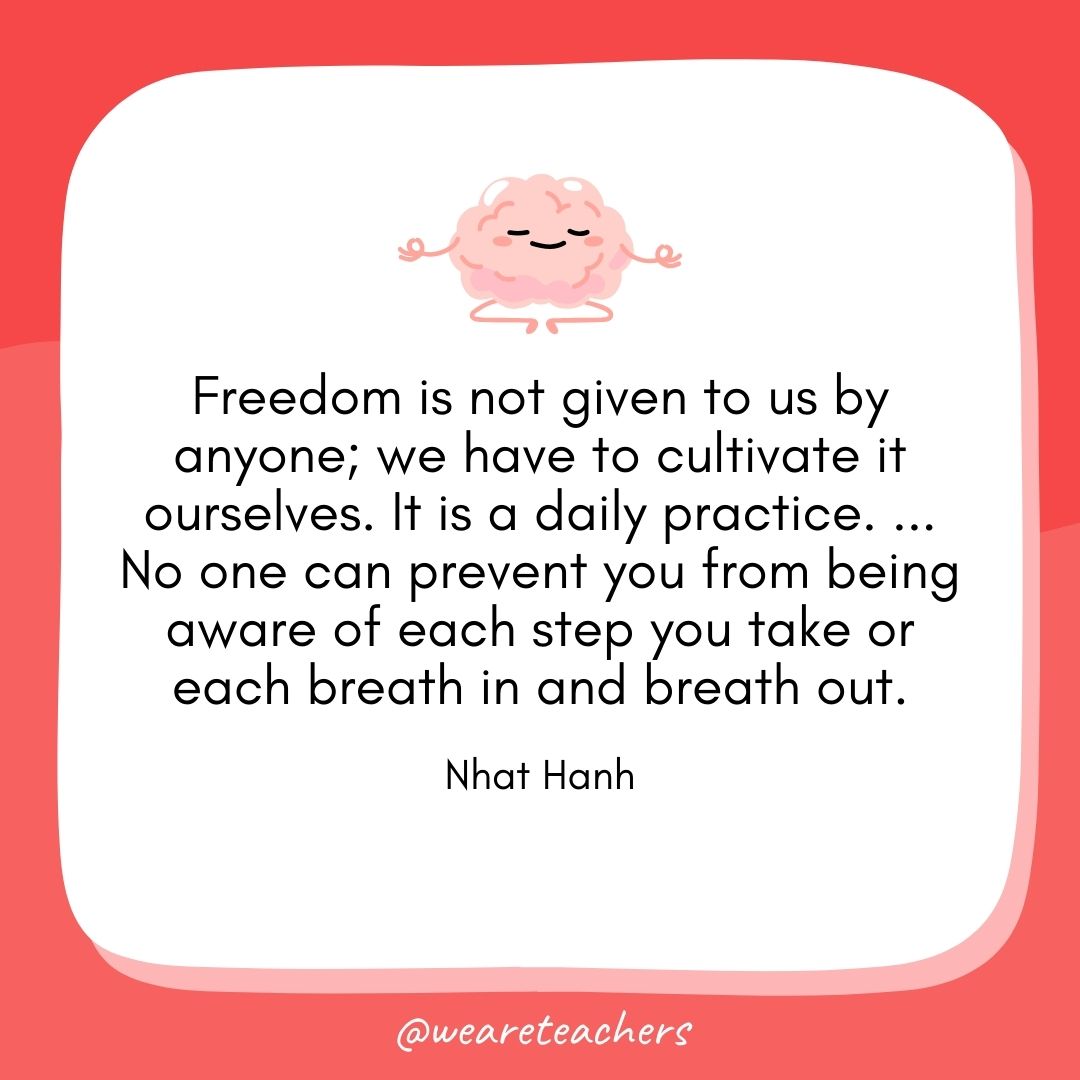
78. Now is the only time. How we relate to it creates the future. In other words, if we’re going to be more cheerful in the future, it’s because of our aspiration and exertion to be cheerful in the present. What we do accumulates; the future is the result of what we do right now. — Pema Chödrön
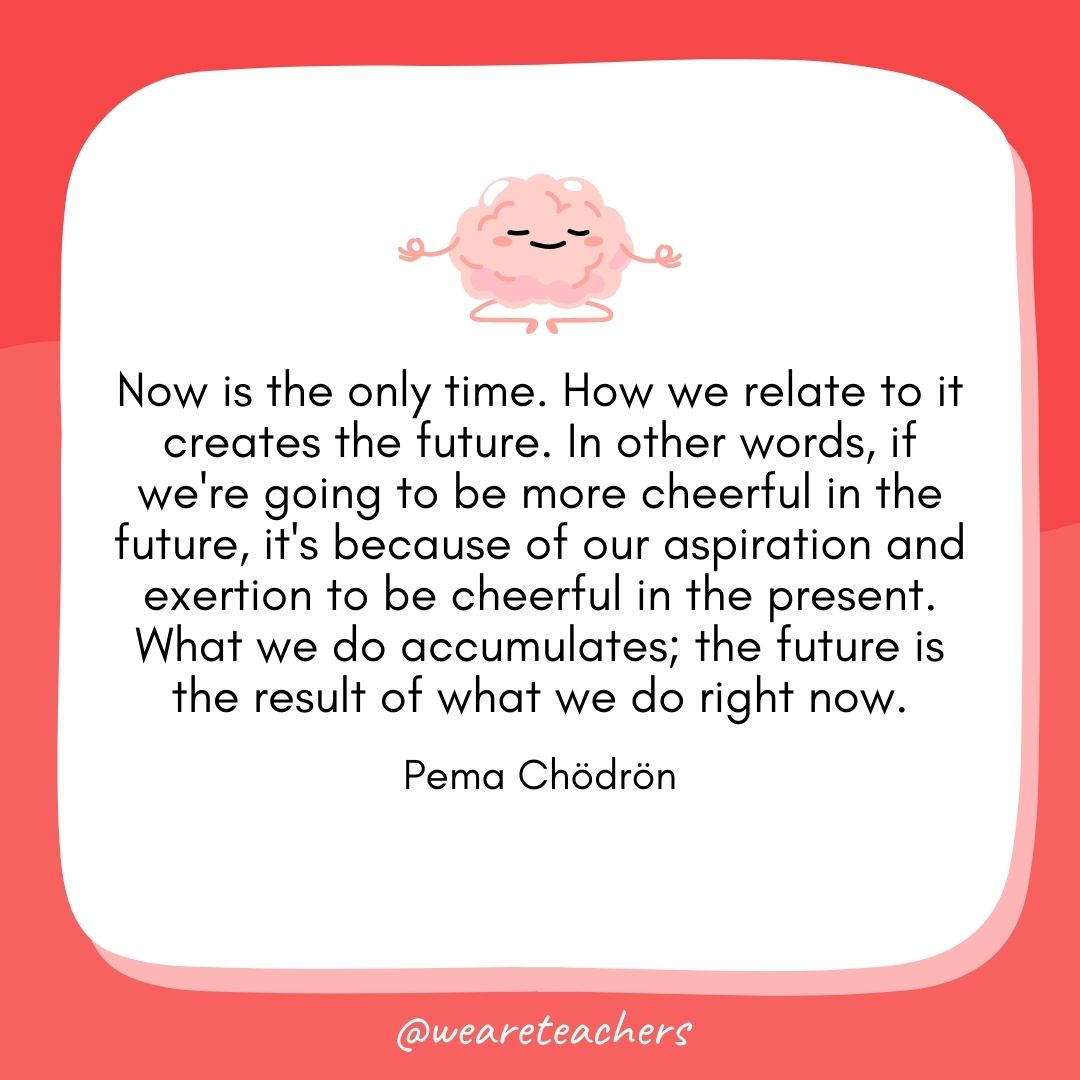
79. Those who live to the future must always appear selfish to those who live to the present. — Ralph Waldo Emerson
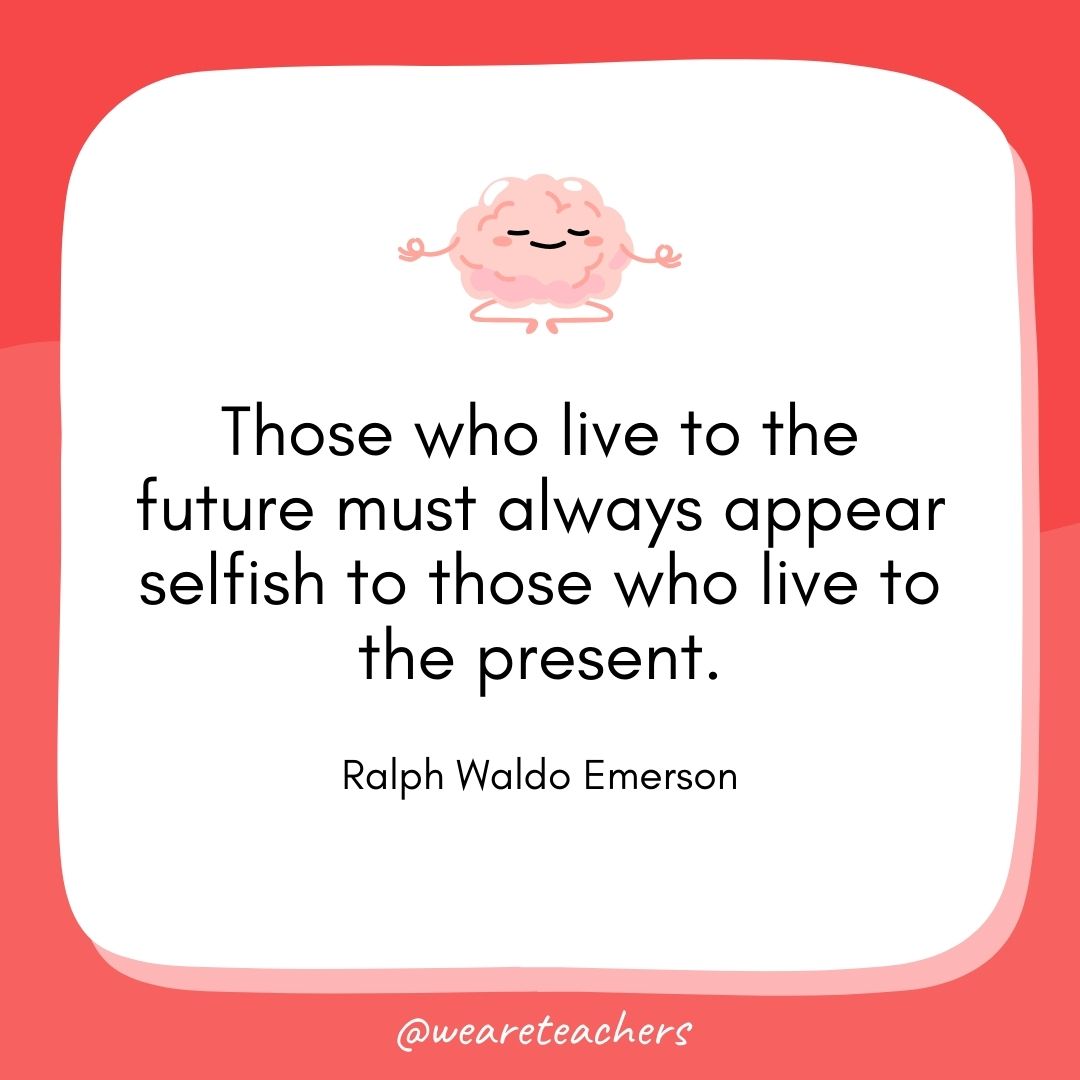
80. Follow your breathing, dwell mindfully on your steps, and soon you will find your balance. — Nhat Hanh
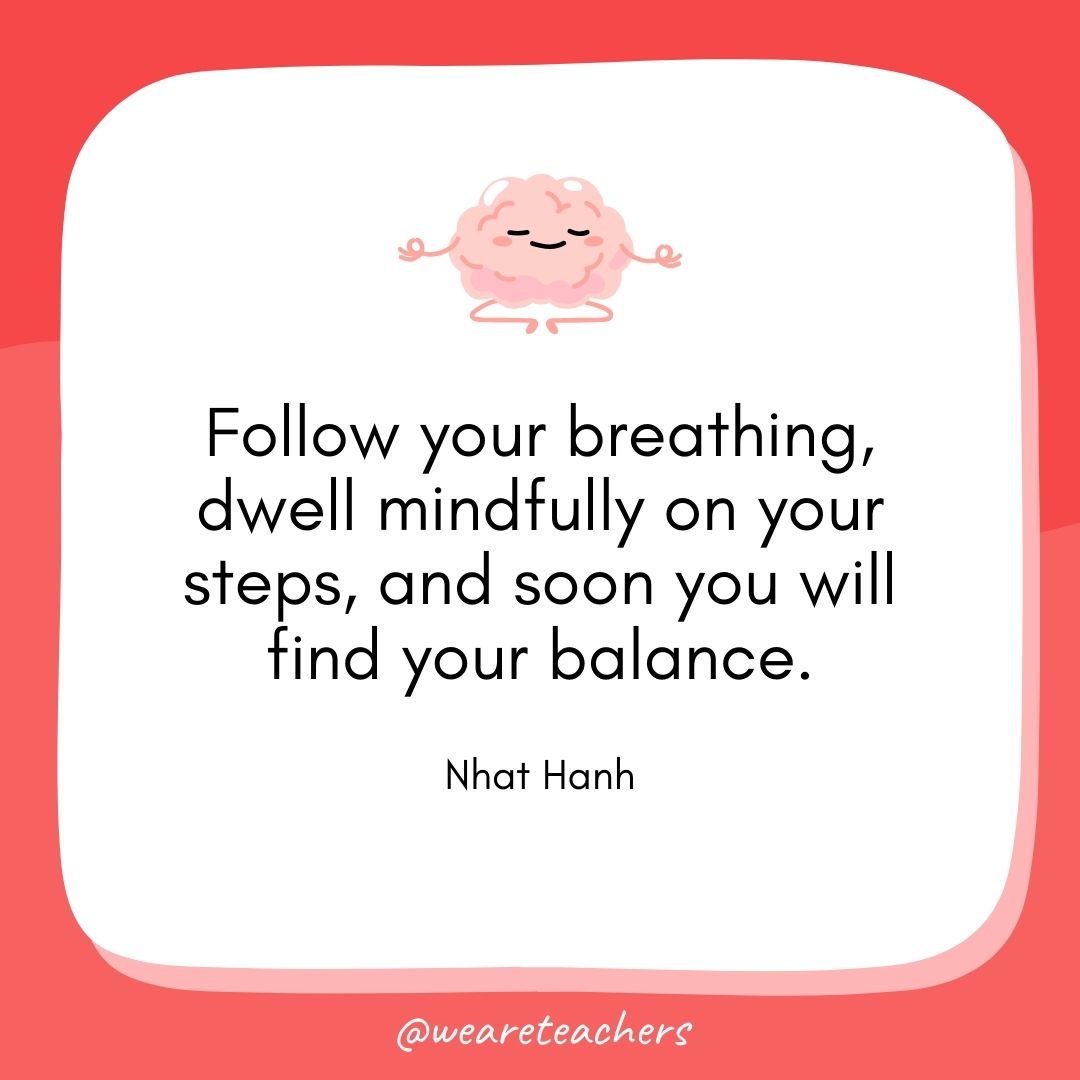
81. Real learning comes about when the competitive spirit has ceased. — Jiddu Krishnamurti
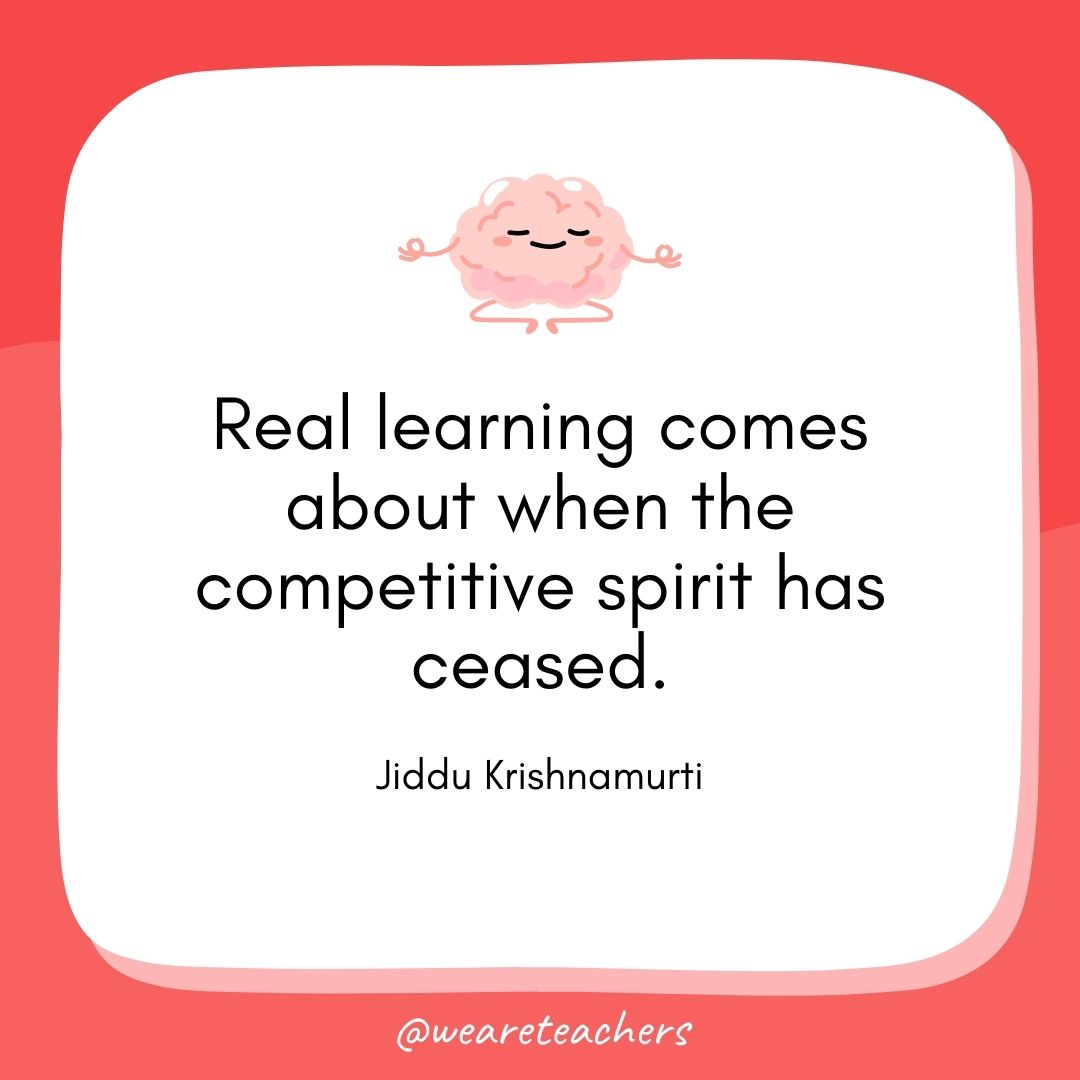
82. Being fully present isn’t something that happens once and then you have achieved it; it’s being awake to the ebb and flow and movement and creation of life, being alive to the process of life itself. — Pema Chödrön
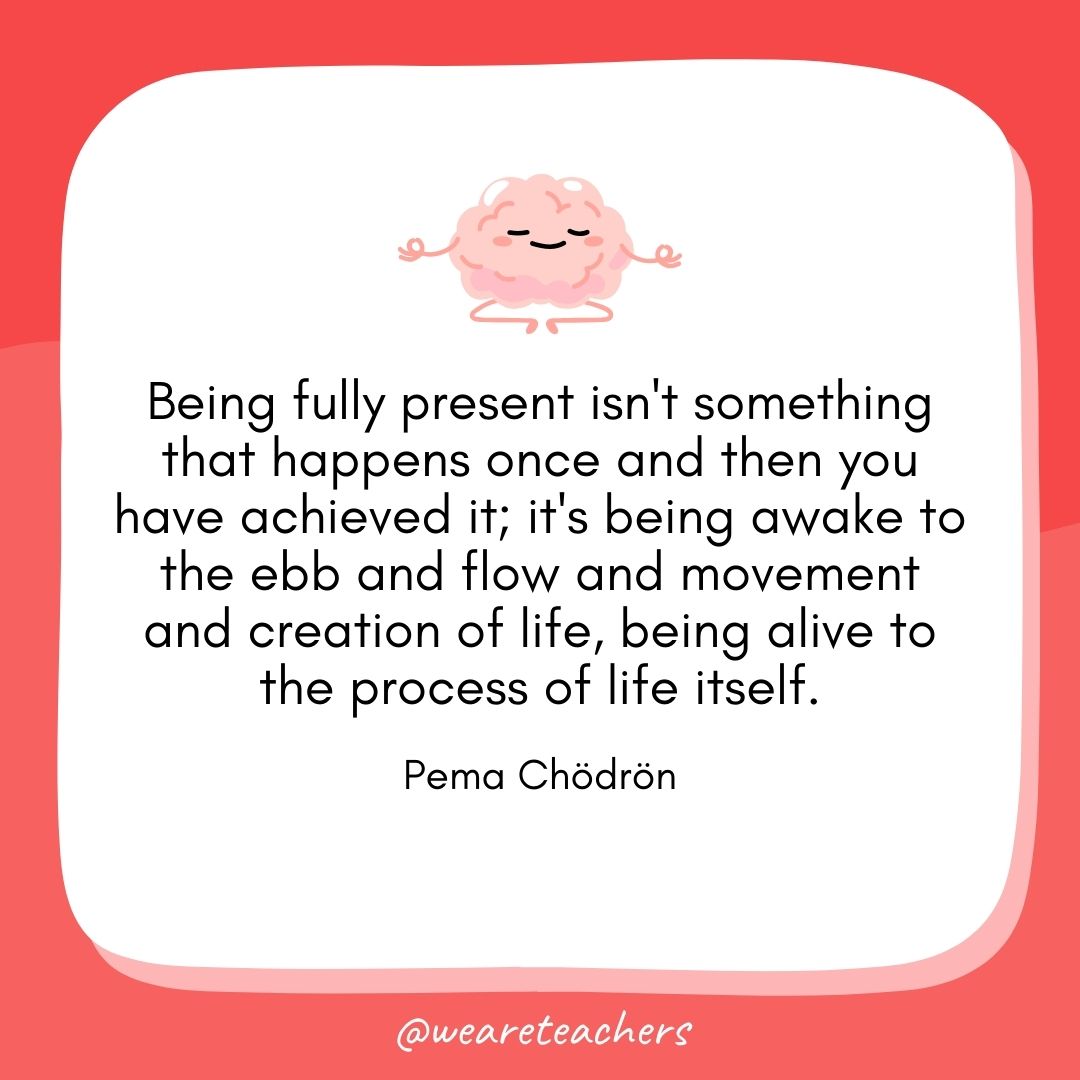
83. The more we can be with our own difficulty, our own pain, the easier it is to be with the pain and difficulties of others. — Joseph Goldstein
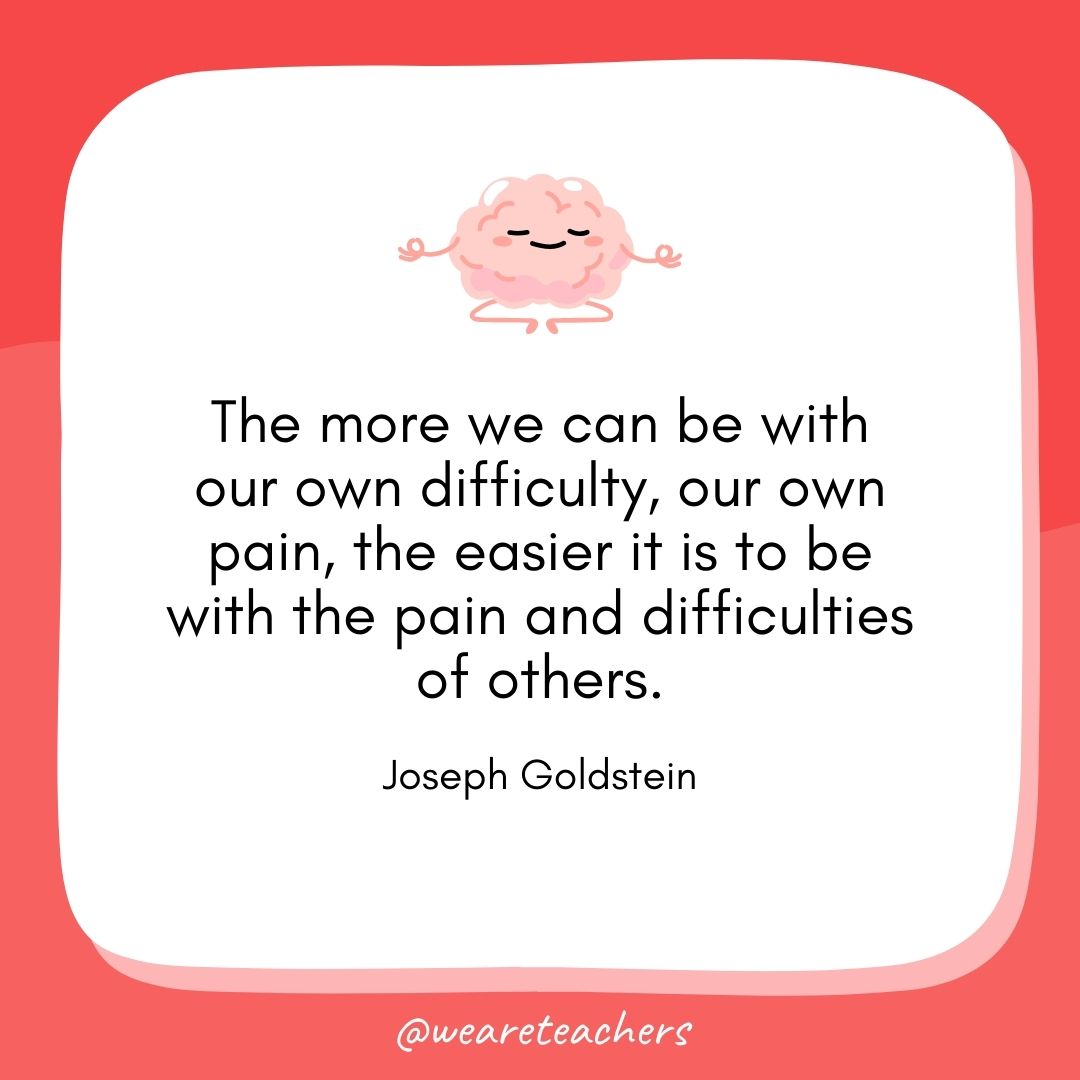
84. Not only do we as individuals get locked into single-minded views, but we also reinforce these views for each other until the culture itself suffers the same mindlessness. — Ellen Langer
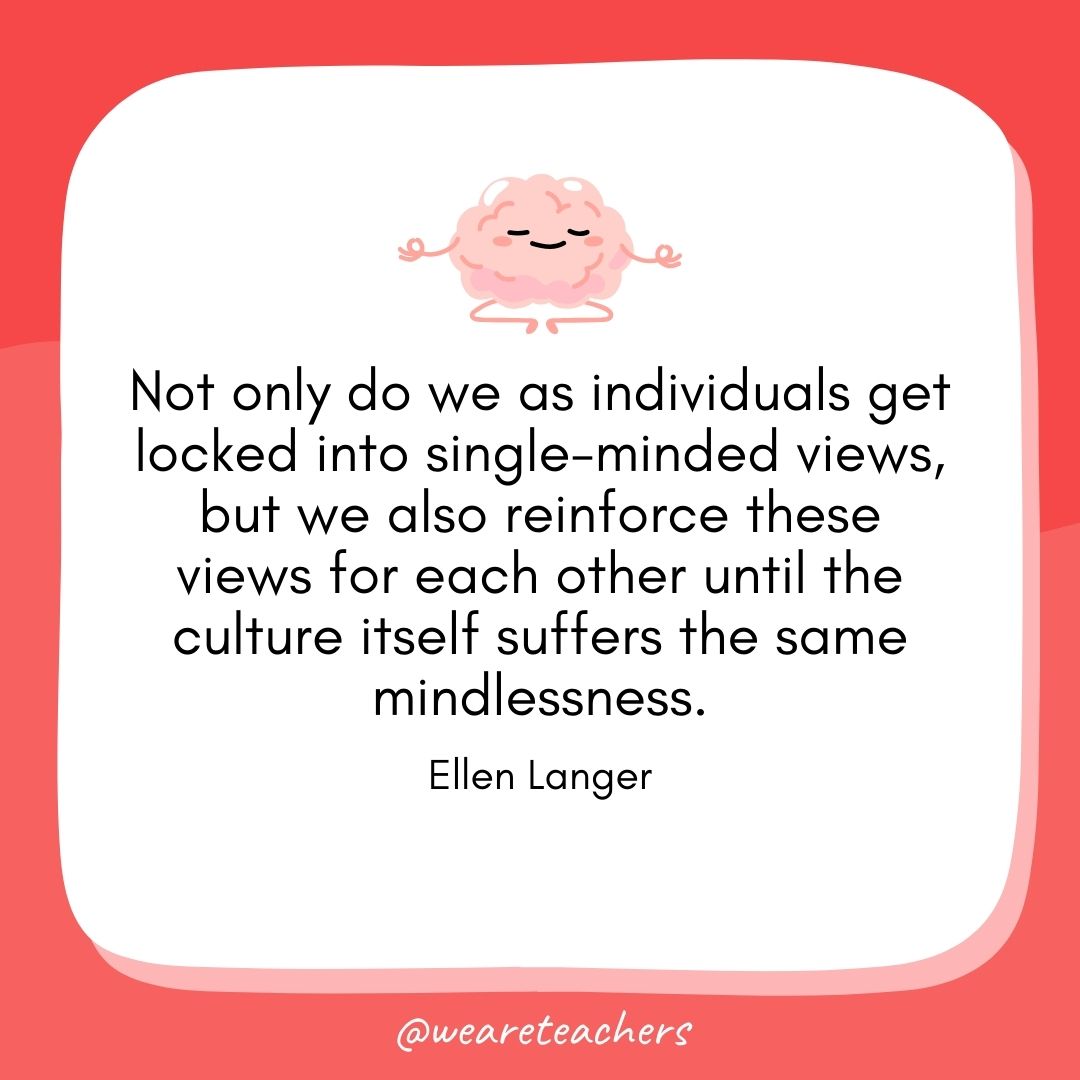
85. Radical Acceptance is the willingness to experience ourselves and our lives as it is. — Tara Brach
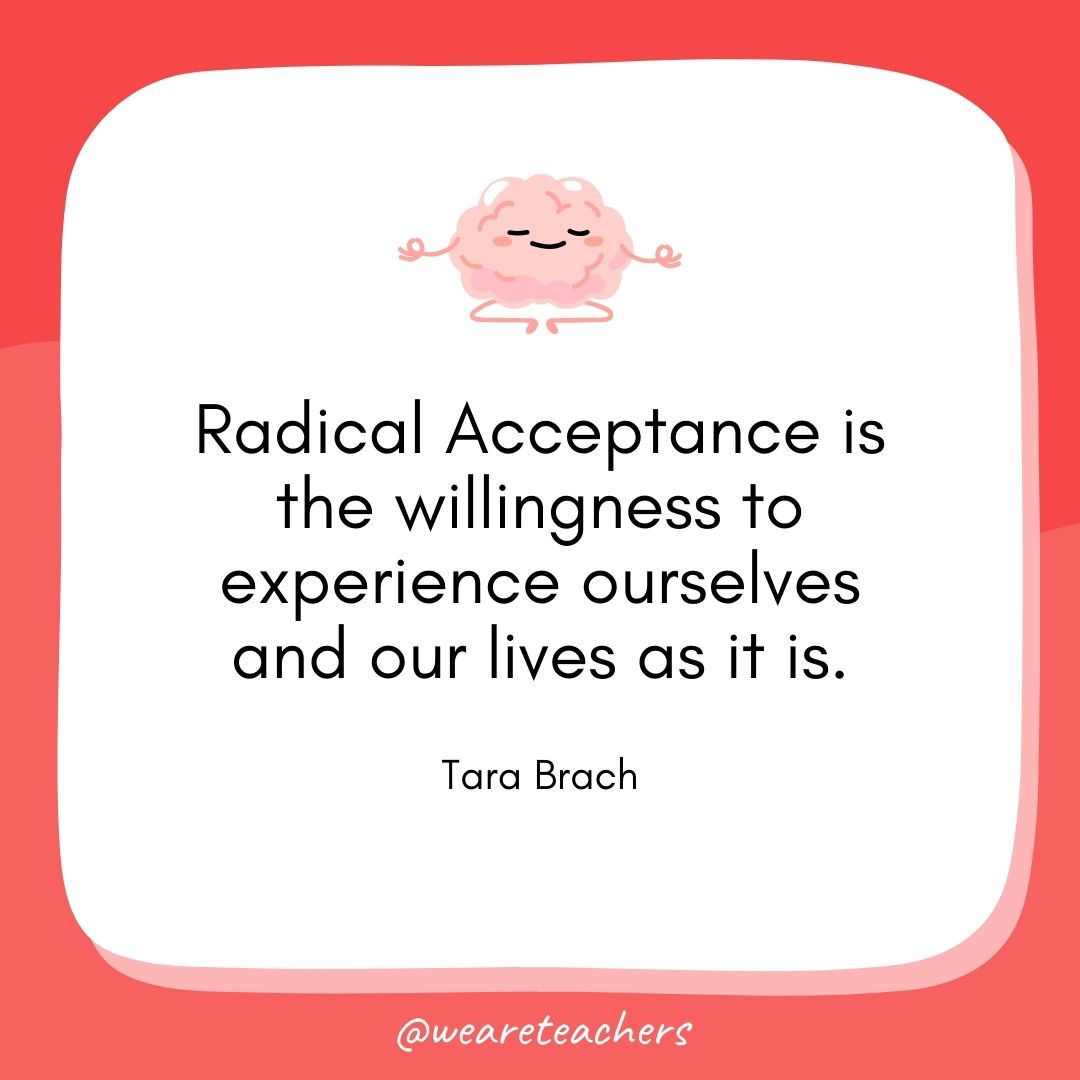
86. Peace is present right here and now, in ourselves and in everything. — Nhat Hanh
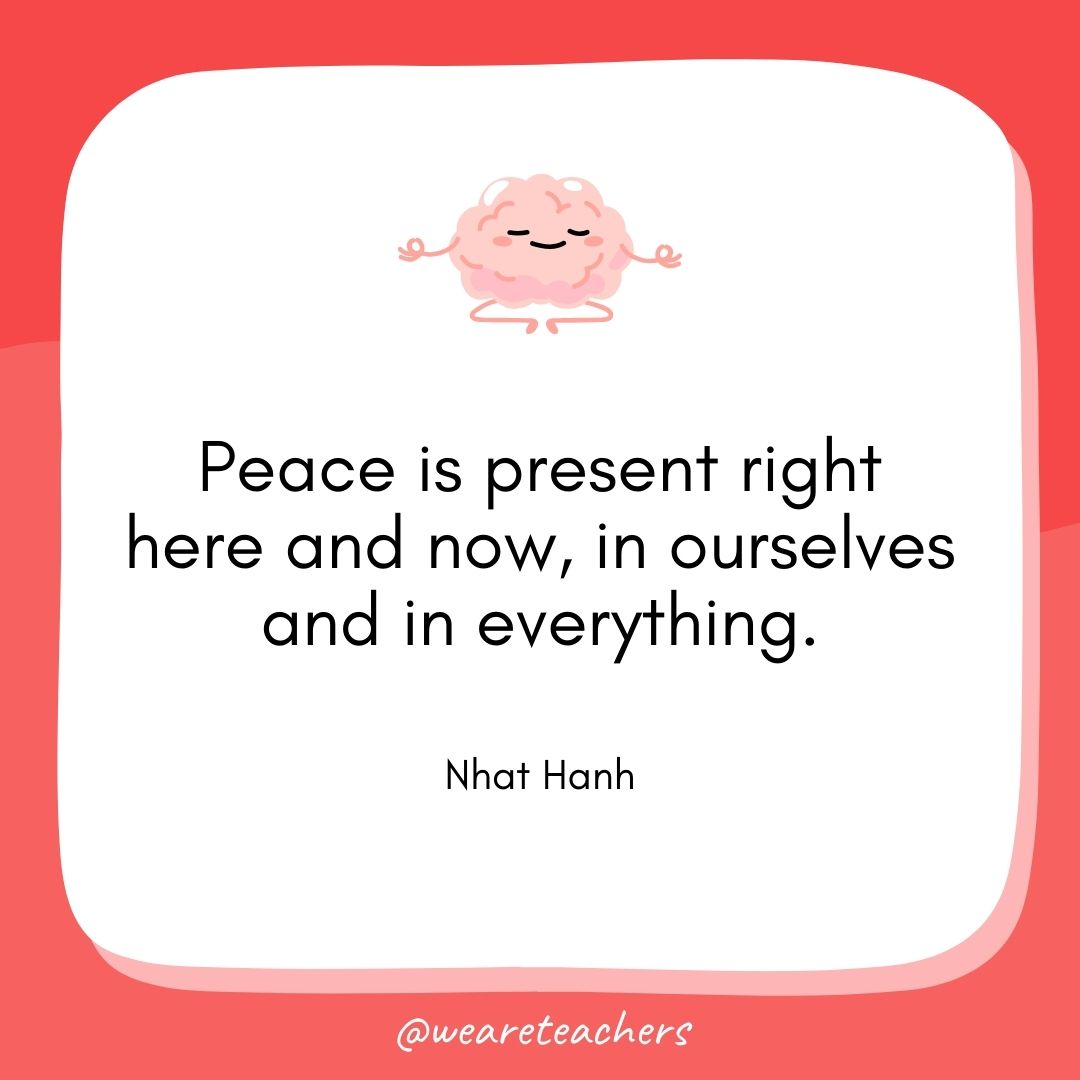
87. An interval of meditation, serious and grateful, was the best corrective of everything dangerous. — Jane Austen
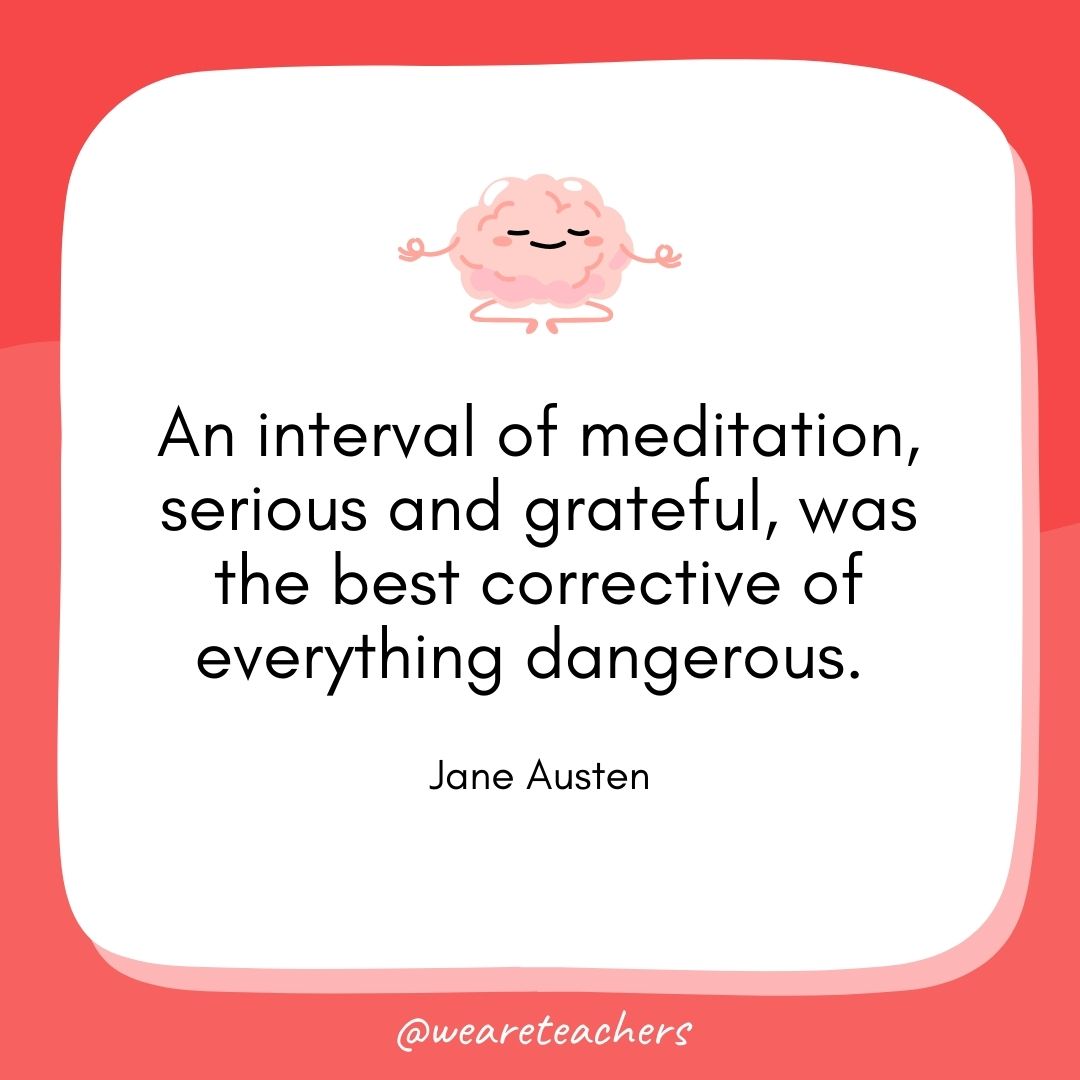
88. They always say that time changes things, but you actually have to change them yourself. — Andy Warhol
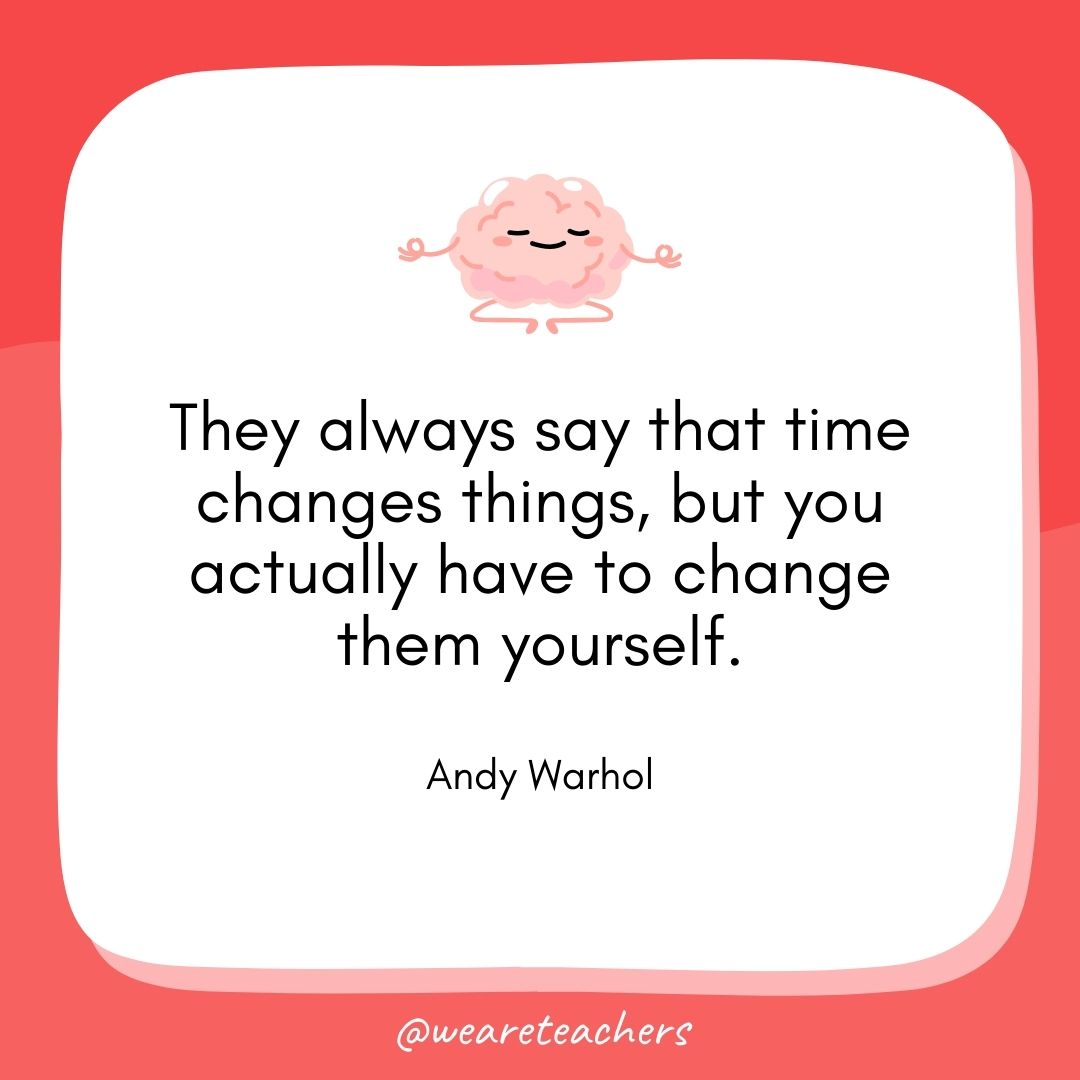
89. We have more possibilities available in each moment than we realize. — Nhat Hanh
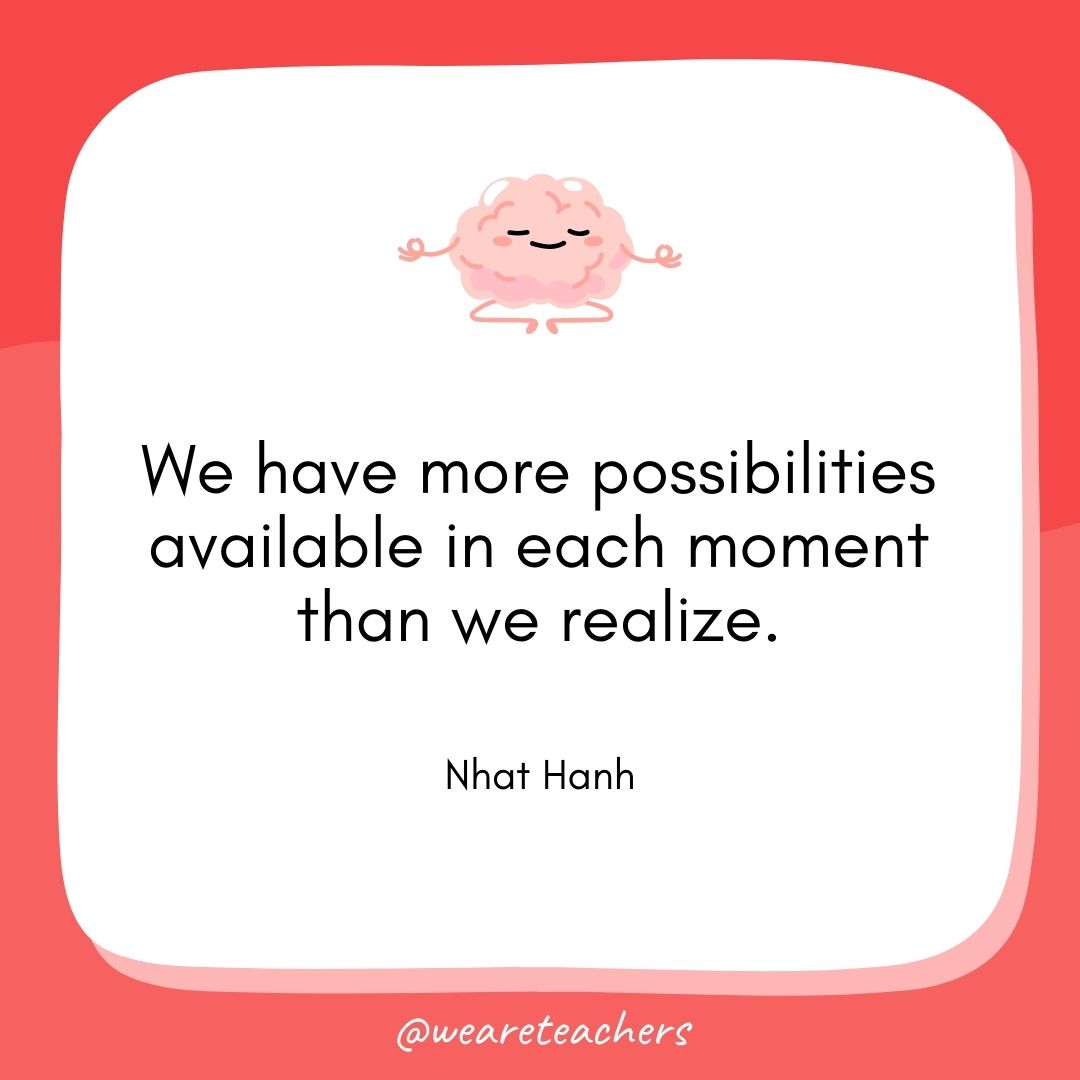
90. One of the main discoveries of meditation is seeing how we continually run away from the present moment, how we avoid being here just as we are. That’s not considered to be a problem. The point is to see it. — Pema Chödrön
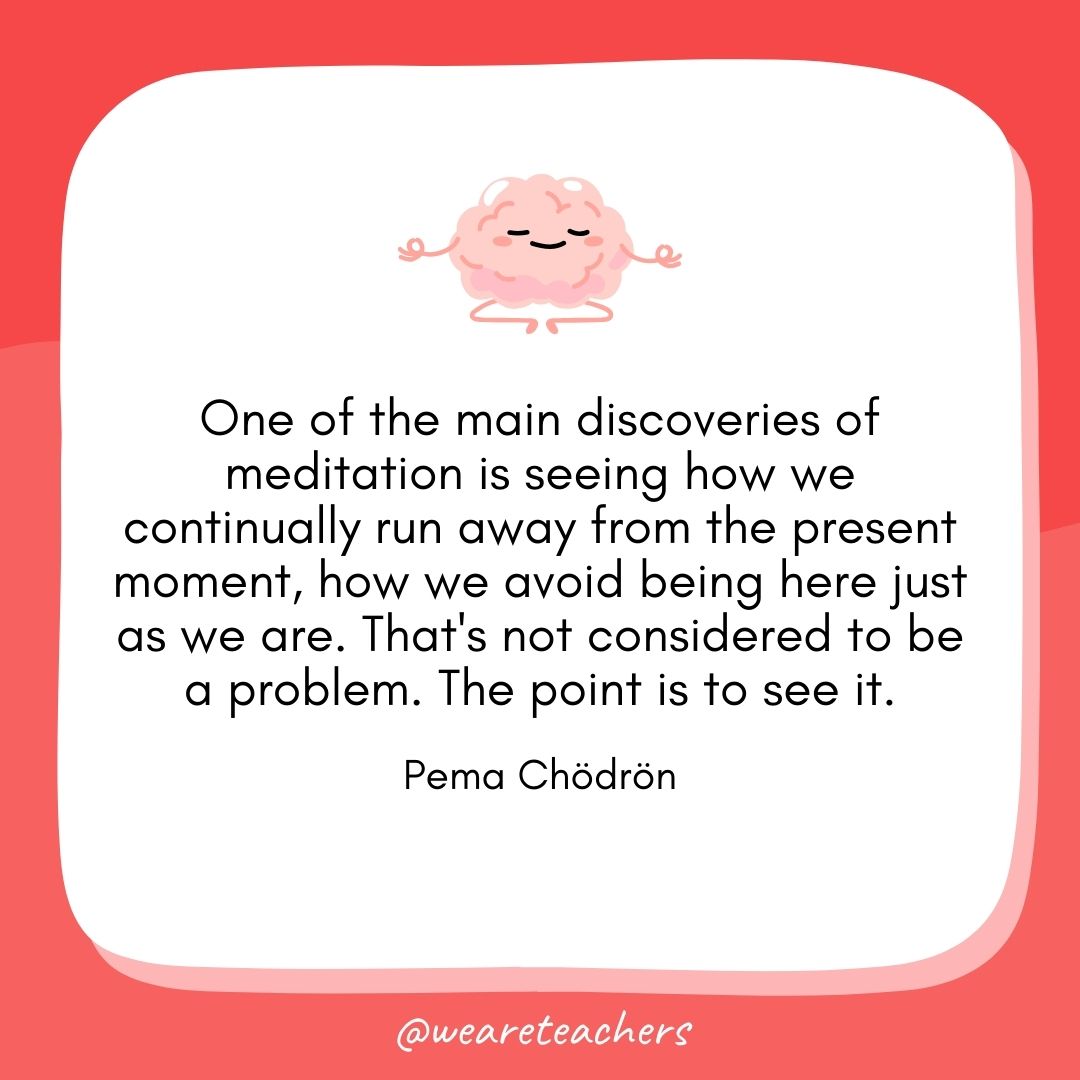
91. What acts as a far more effective circumstance for generating compassion and what, in fact, rouses us from our comfortable meditation seat is actually seeing or hearing others—encountering others directly, not just conceptually in our imagination. — Tenzin Gyatso, 14th Dalai Lama
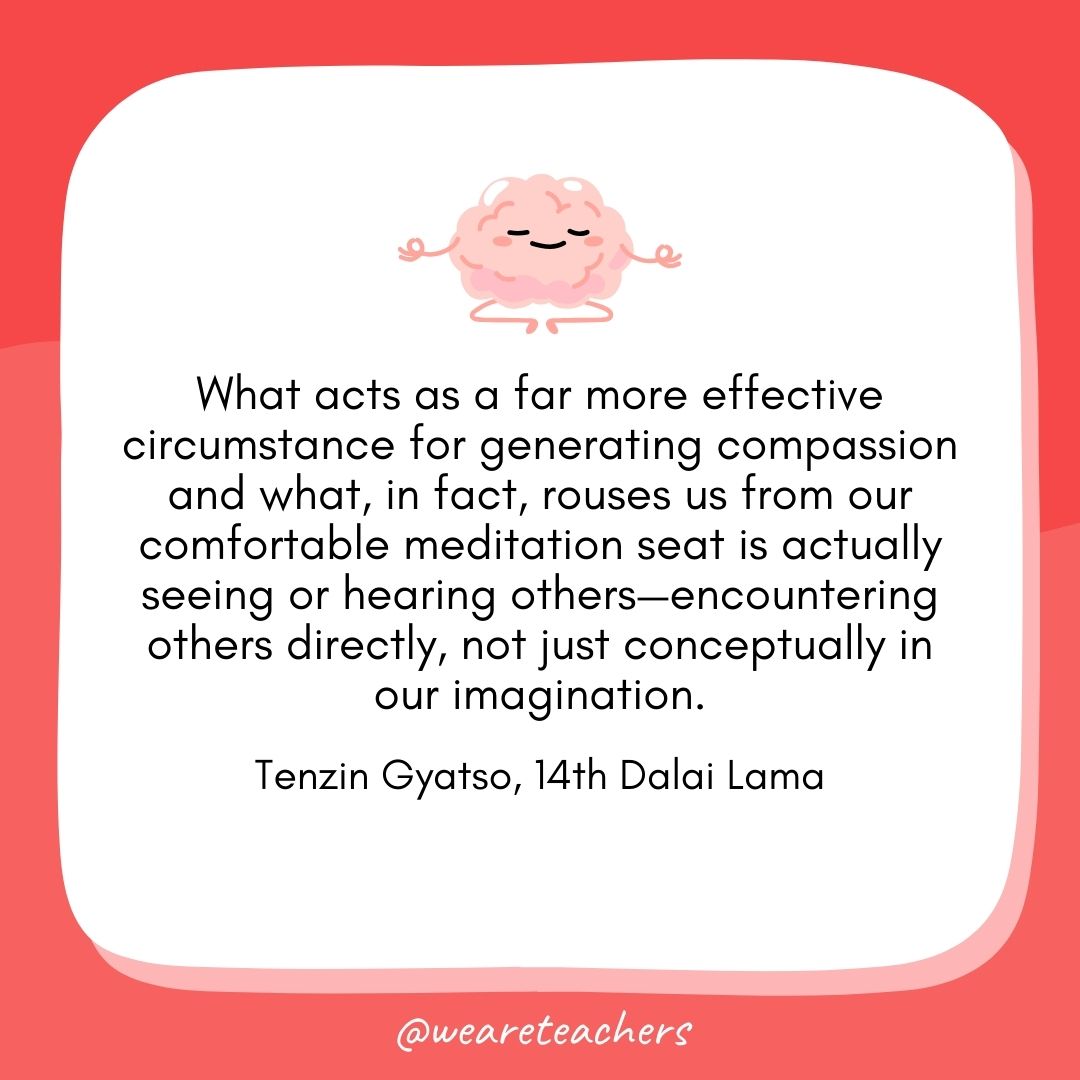
92. Take my hand. We will walk. We will only walk. We will enjoy our walk without thinking of arriving anywhere. — Nhat Hanh
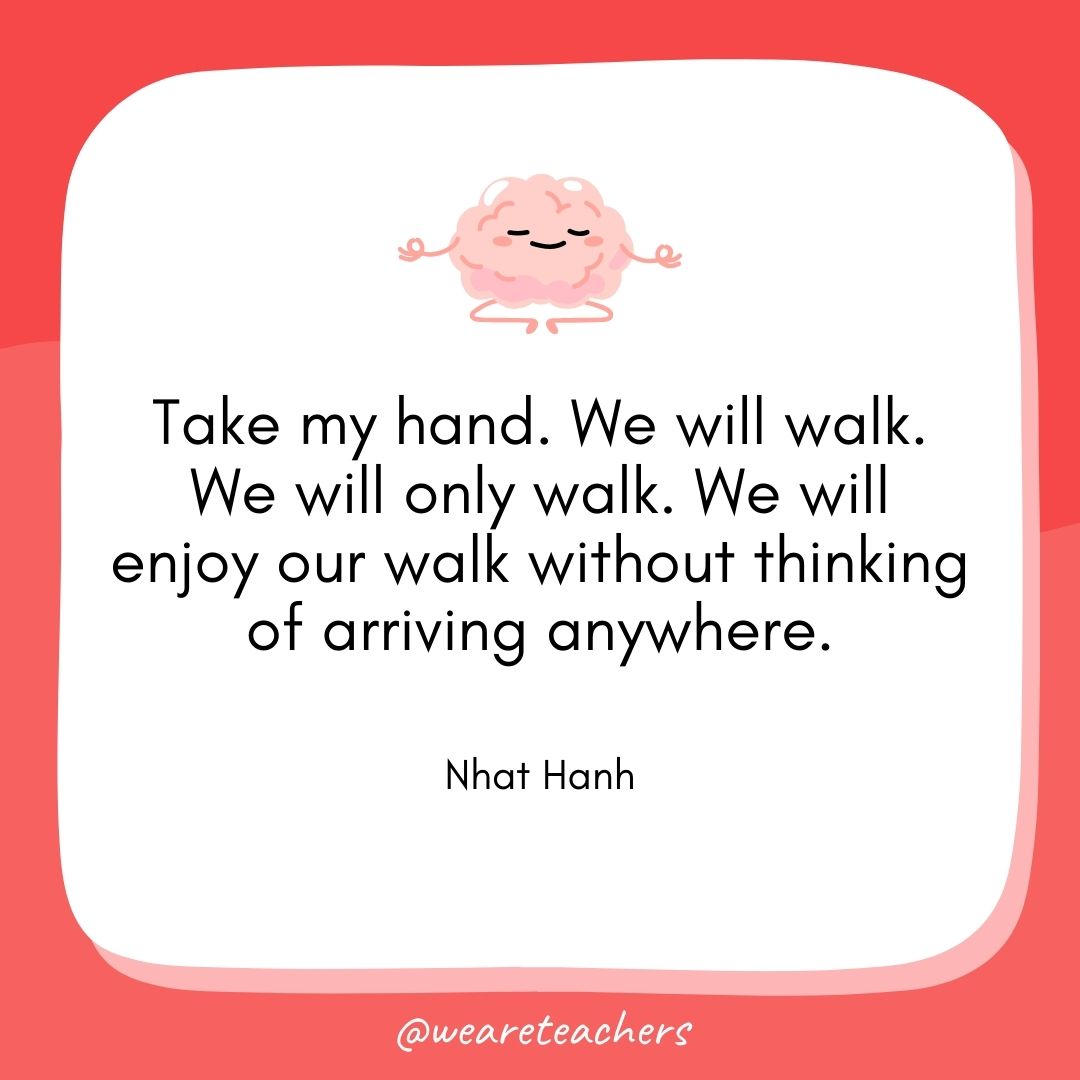
93. A man who dares to waste one hour of time has not discovered the value of life. — Charles Darwin
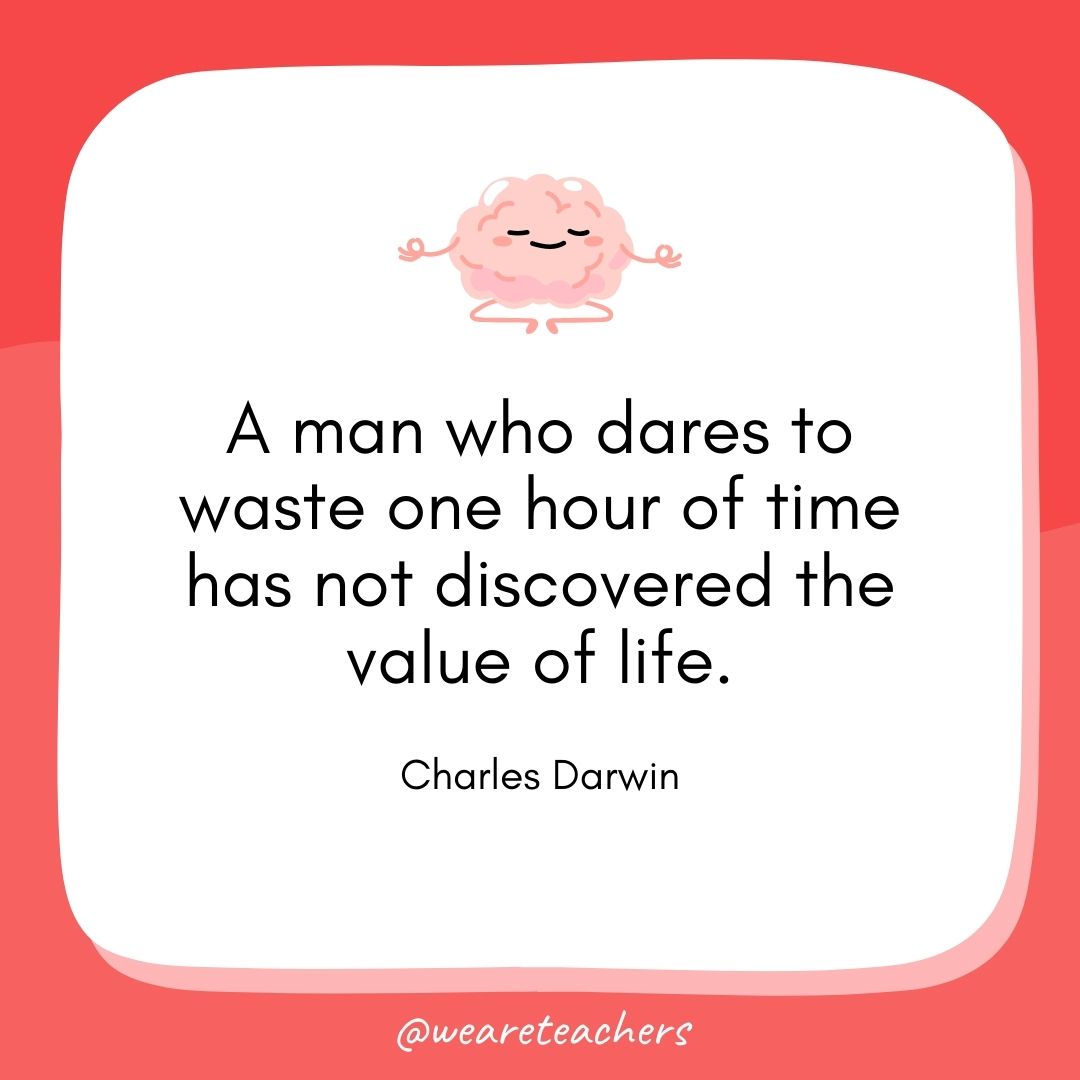
94. You must live in the present, launch yourself on every wave, find your eternity in each moment. — Henry David Thoreau
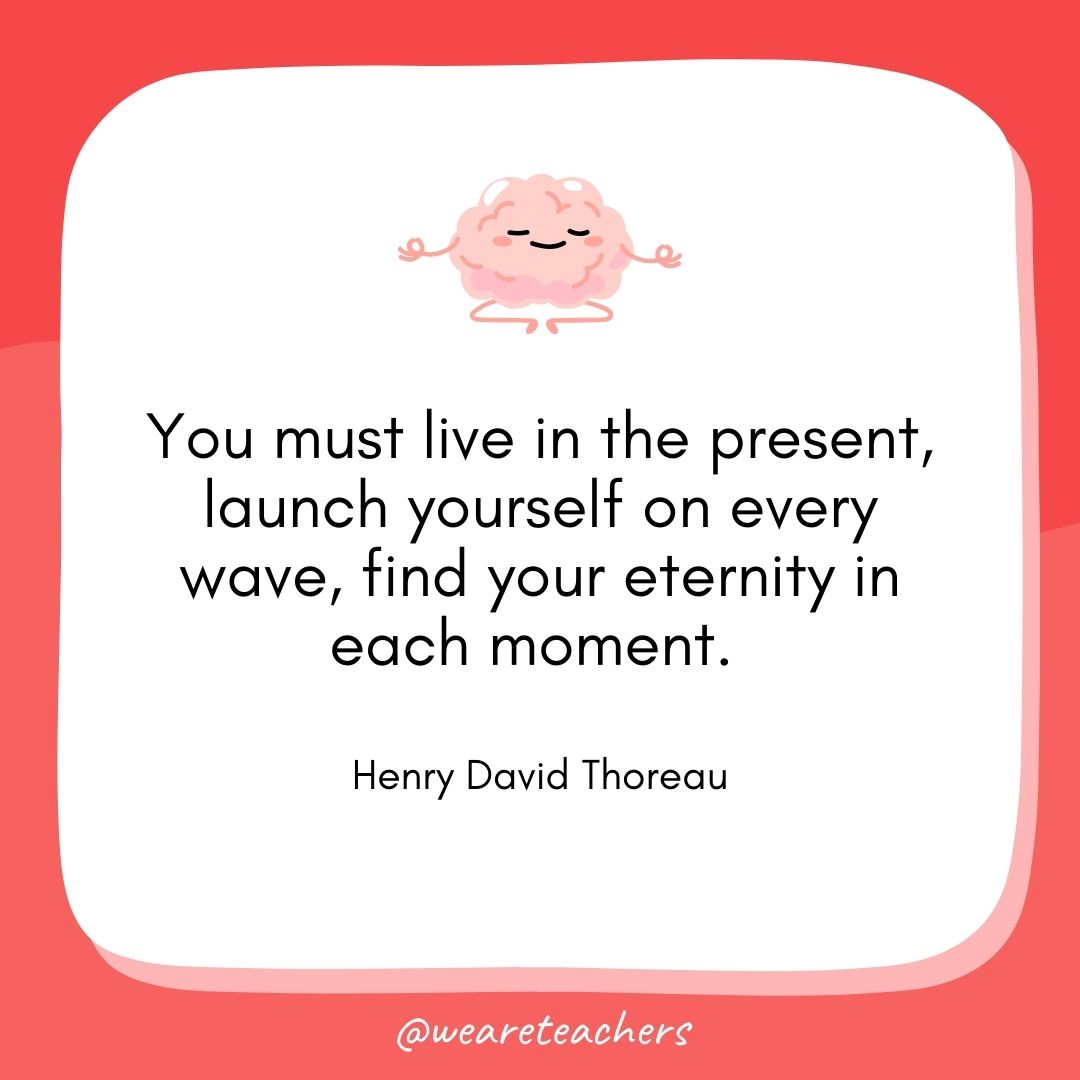
95. Lord, make us mindful of the little things that grow and blossom in these days to make the world beautiful for us. — W.E.B. Du Bois
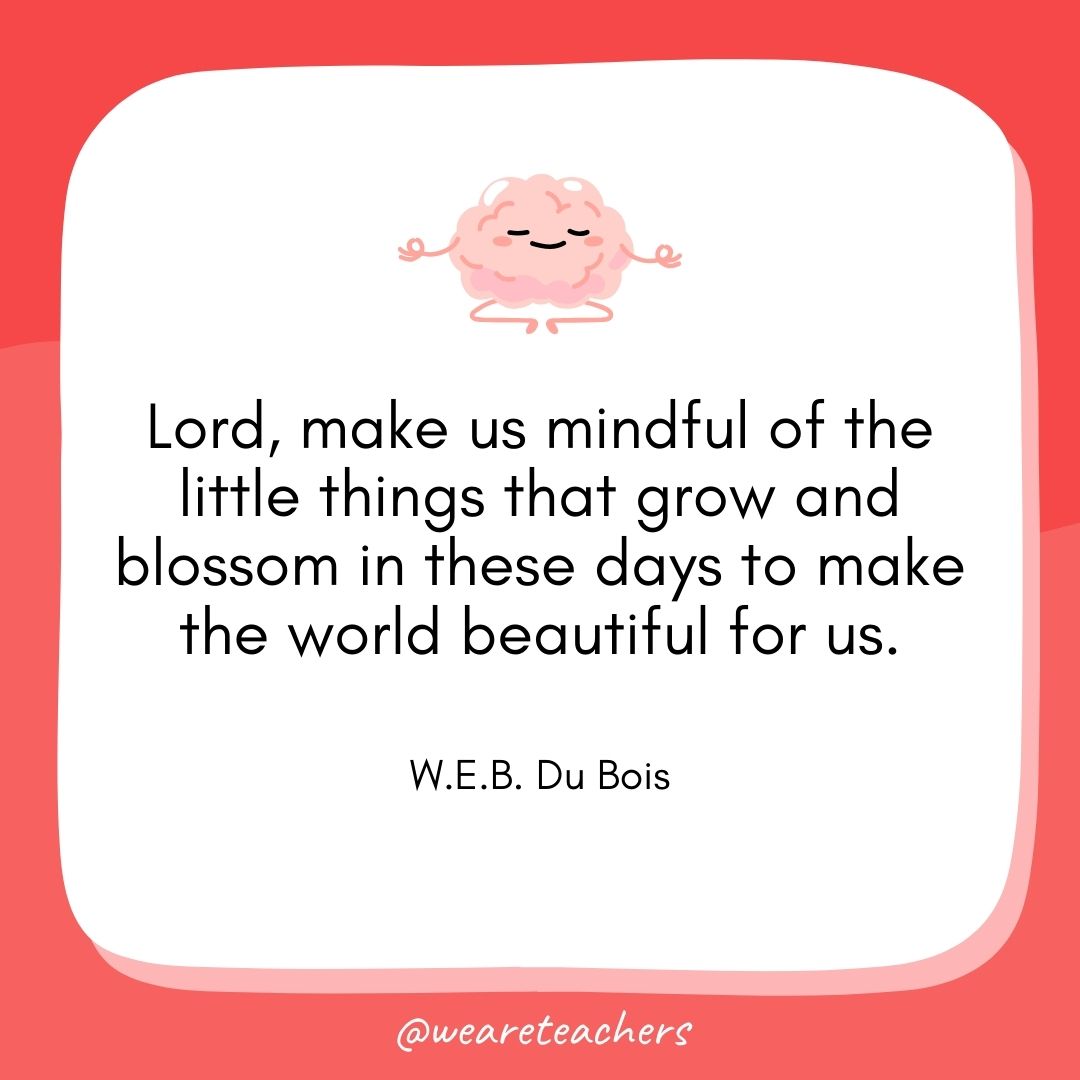
96. I am determined to practice deep listening. I am determined to practice loving speech. — Nhat Hanh
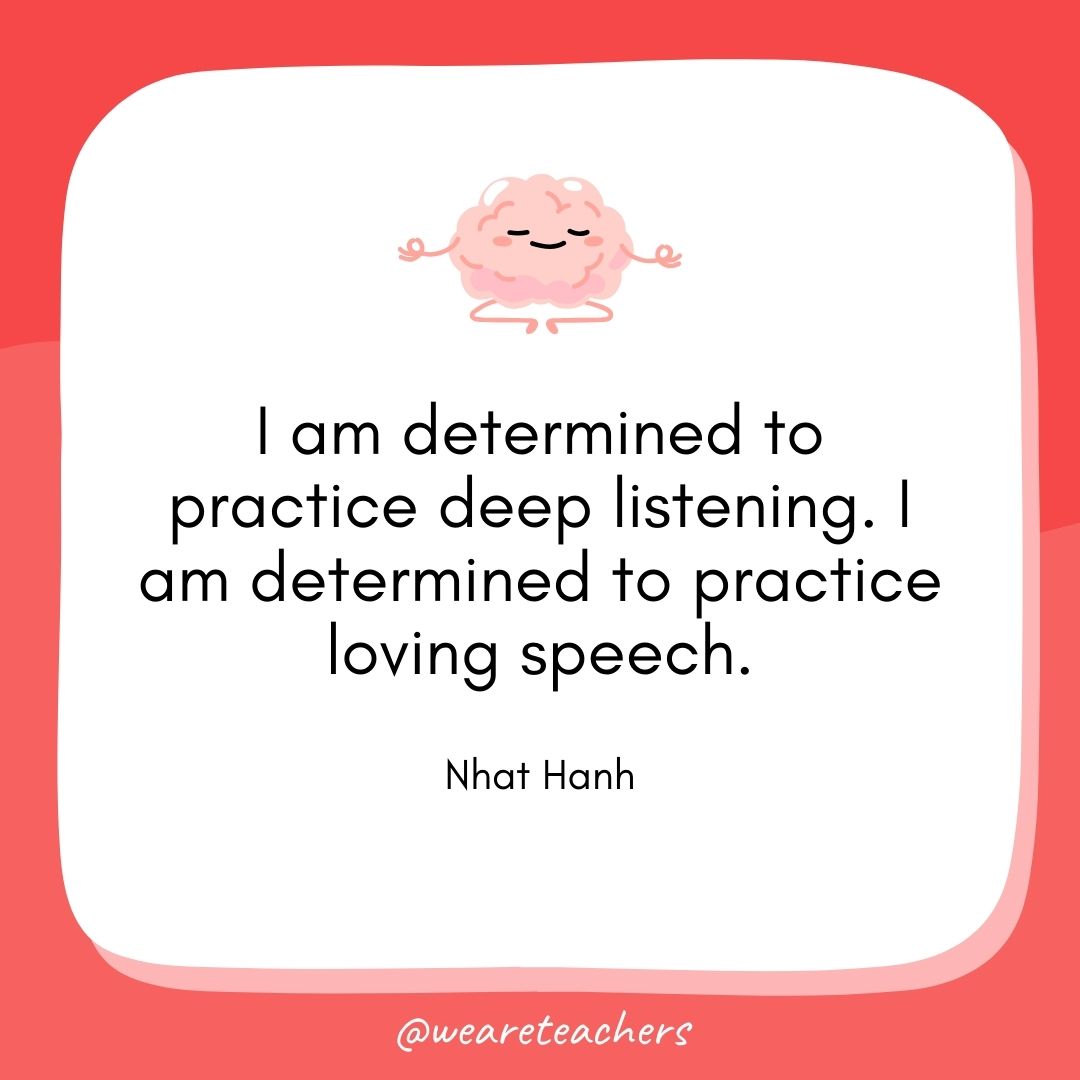
97. The things that matter most in our lives are not fantastic or grand. They are the moments when we touch one another. — Jack Kornfield
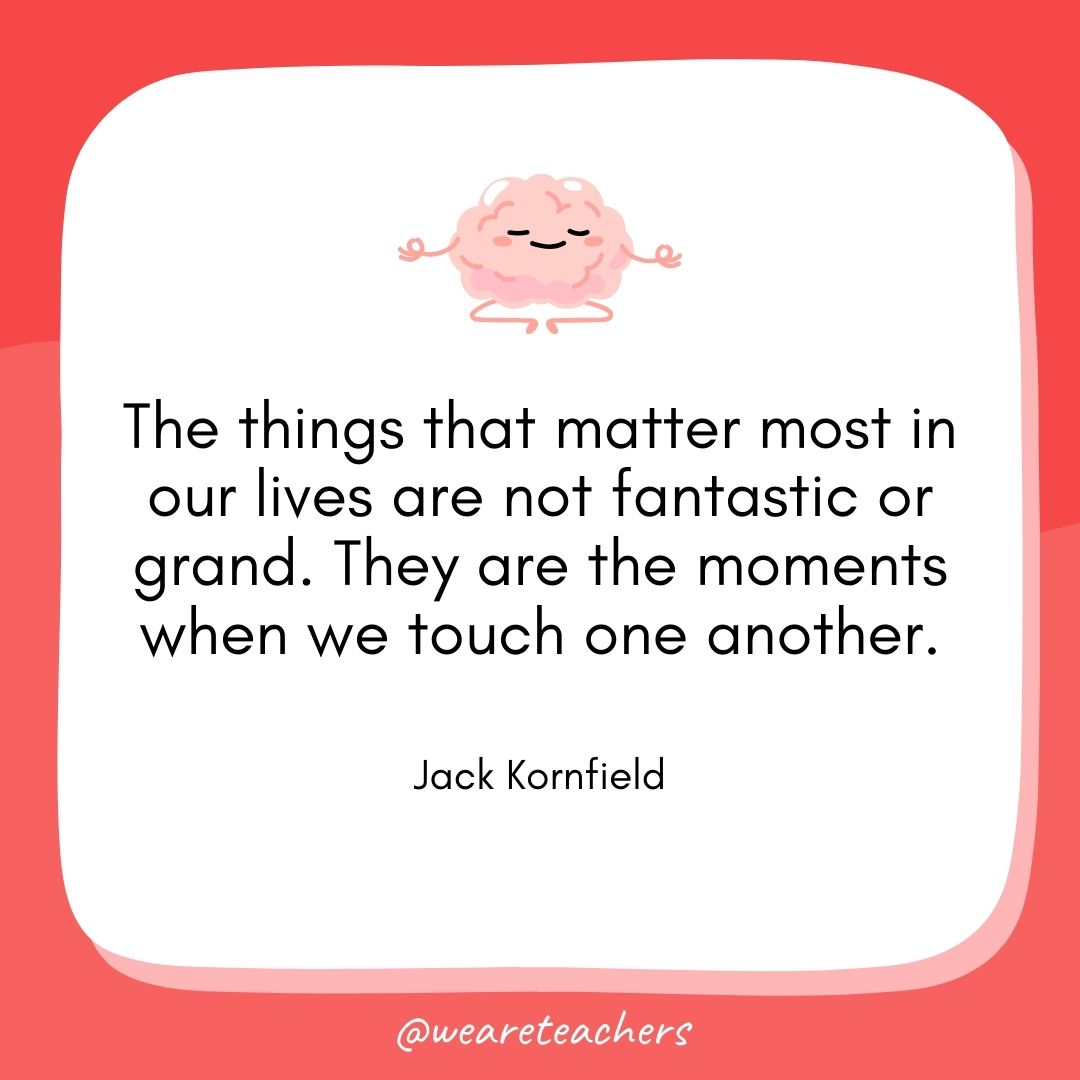
98. When we relax about imperfection, we no longer lose our life moments in the pursuit of being different and in the fear of what is wrong. — Tara Brach
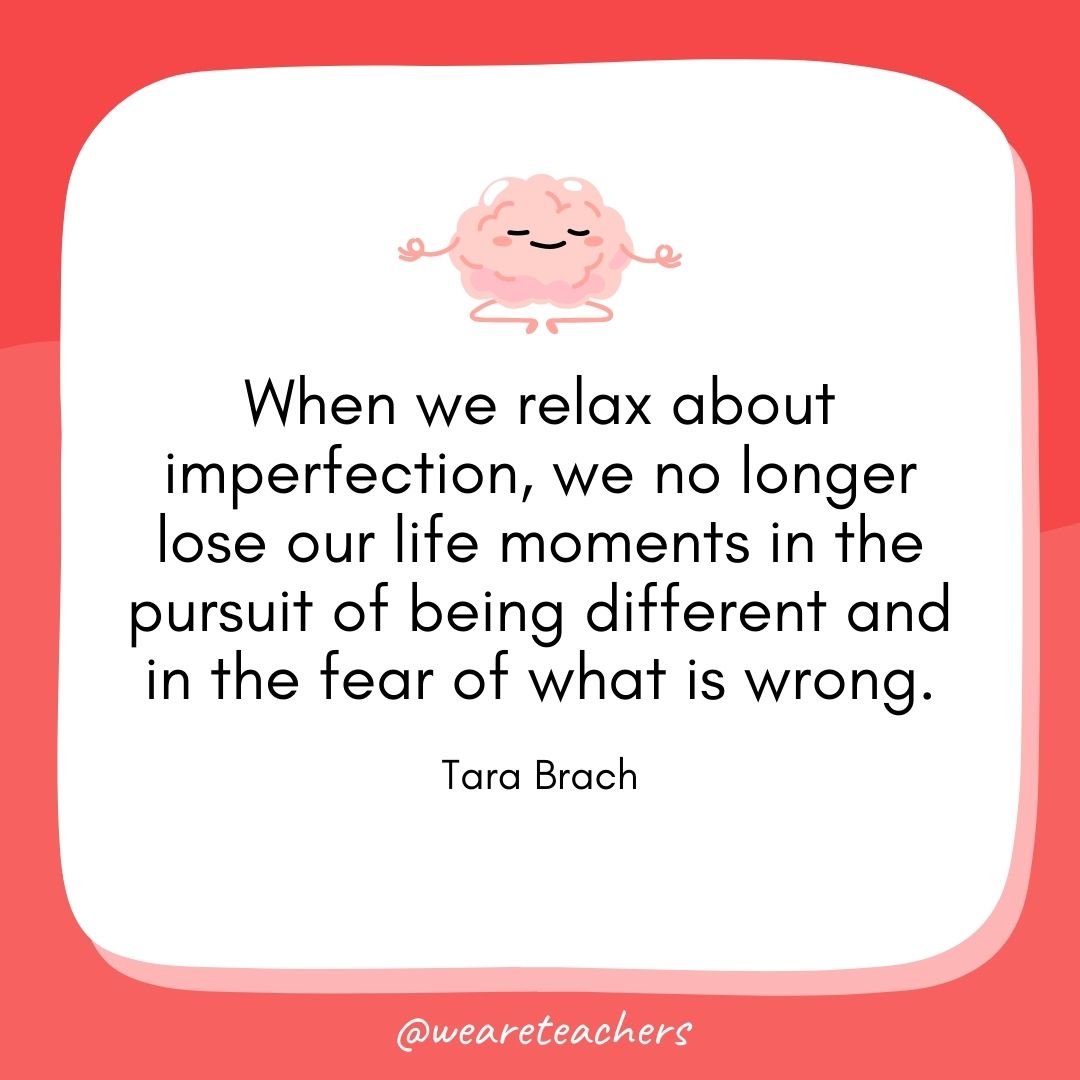
99. Compassion grows in us when we know how the energy of love is available all around us. — Sharon Salzberg
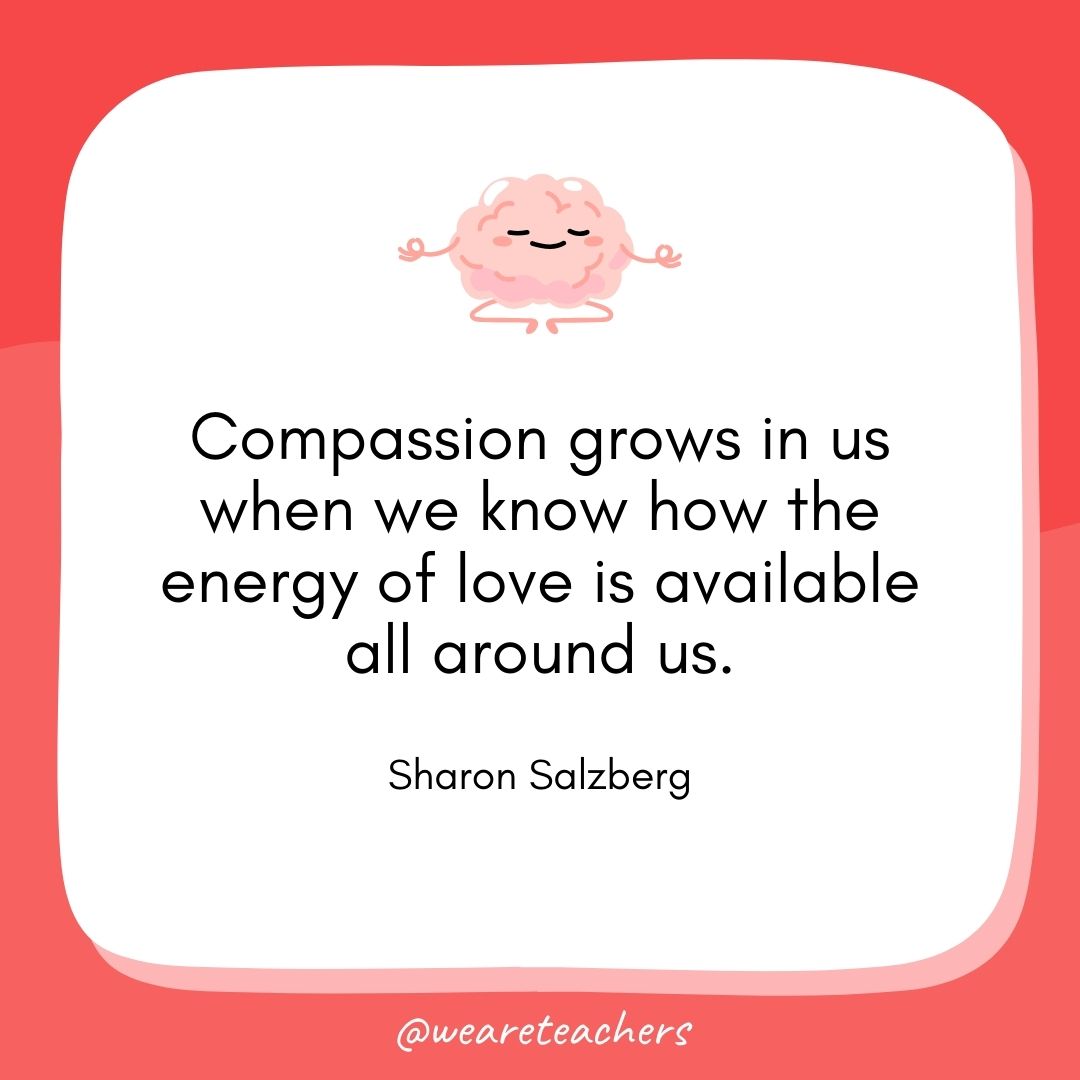
100. Reconciliation is a deep practice that we can do with our listening and our mindful speech. To reconcile means to bring peace and happiness to nations, people, and members of our family. … In order to reconcile, you have to possess the art of deep listening. — Nhat Hanh

101. By removing that which is petty and self-seeking, we bring forth all that is glorious and mindful of the whole. — Eknath Easwaran
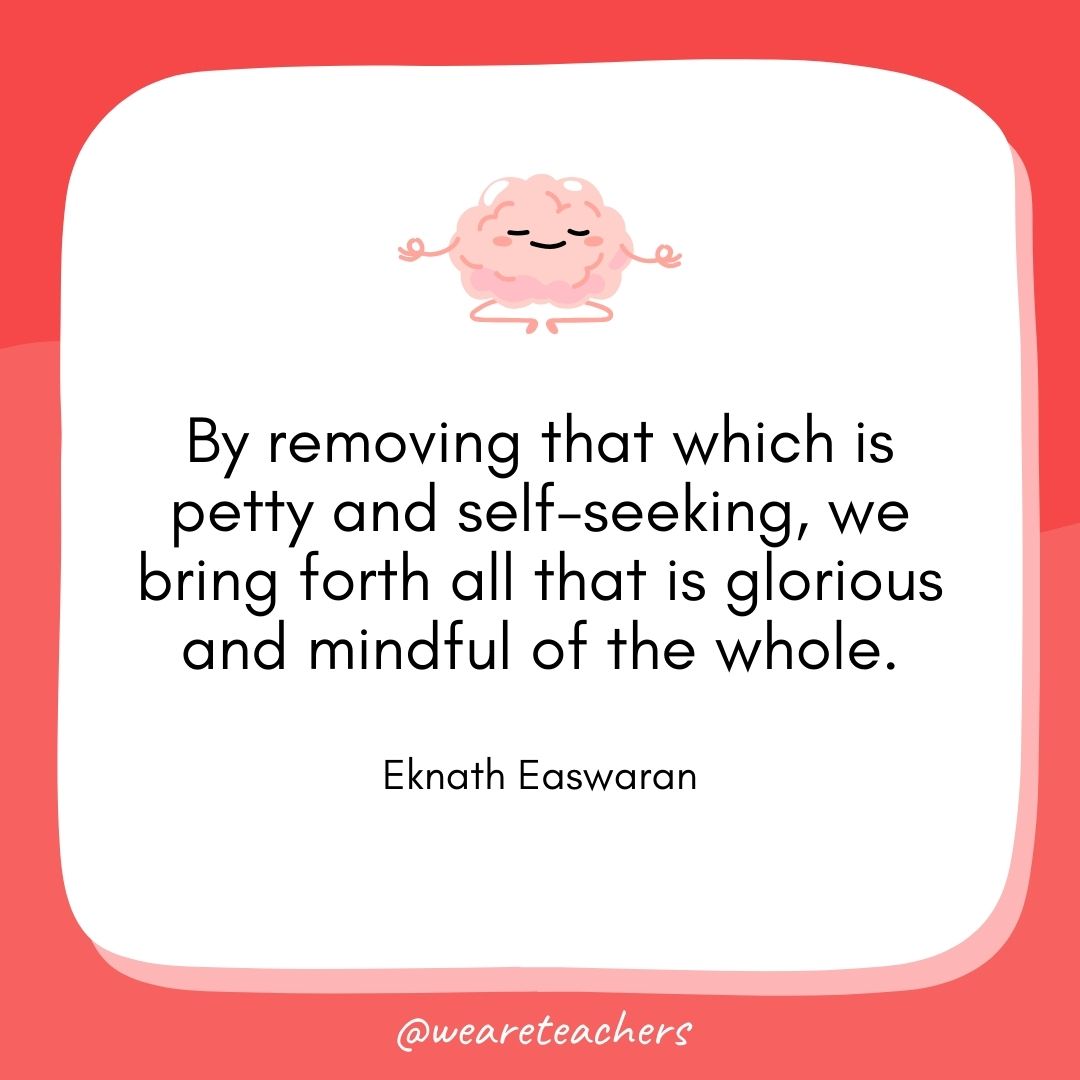
102. When we see the secret beauty of anyone, including ourselves, we see past our judgment and fear into the core of who we truly are—not an entrapped self but the radiance of goodness. — Tara Brach
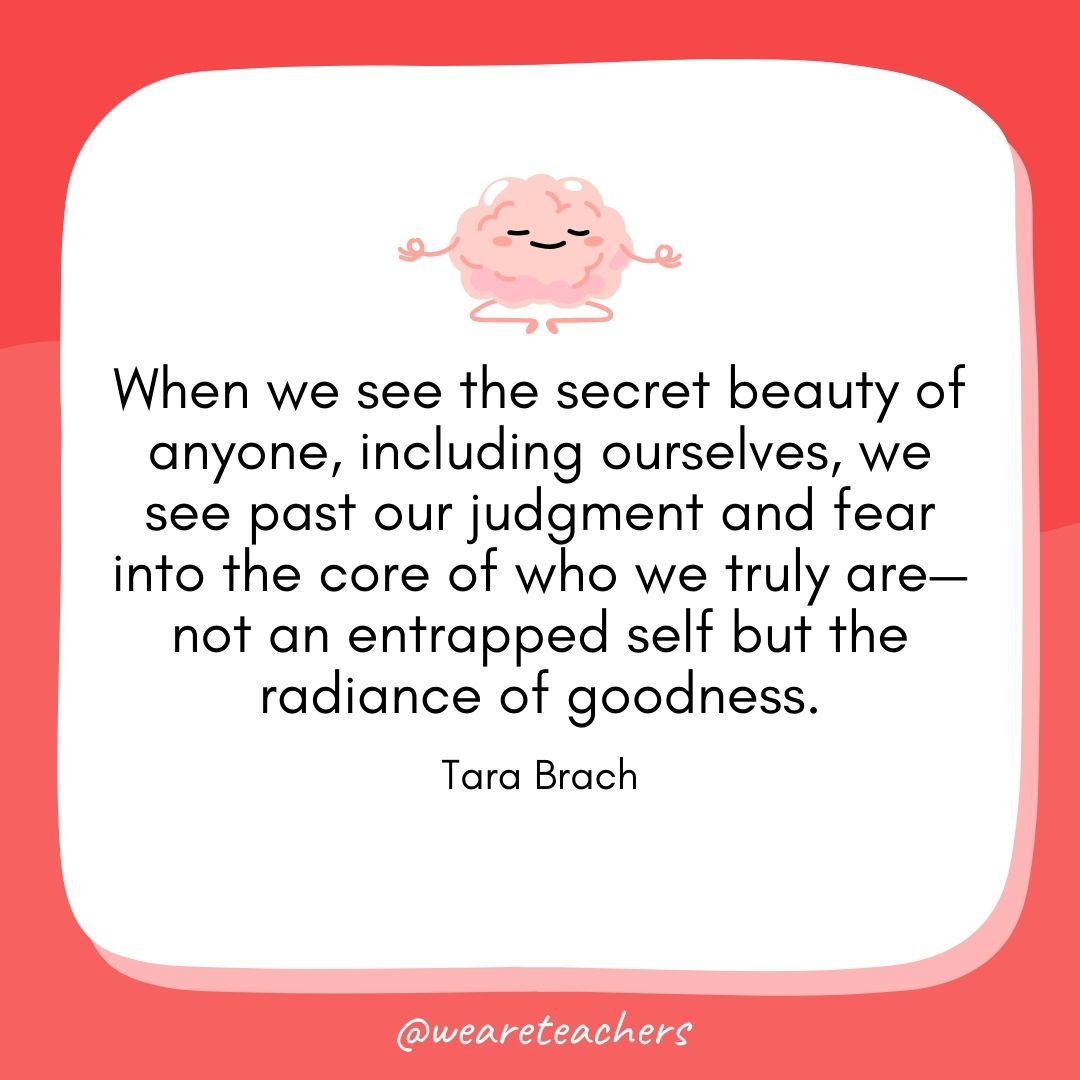
103. Restore your attention or bring it to a new level by dramatically slowing down whatever you’re doing. — Sharon Salzberg
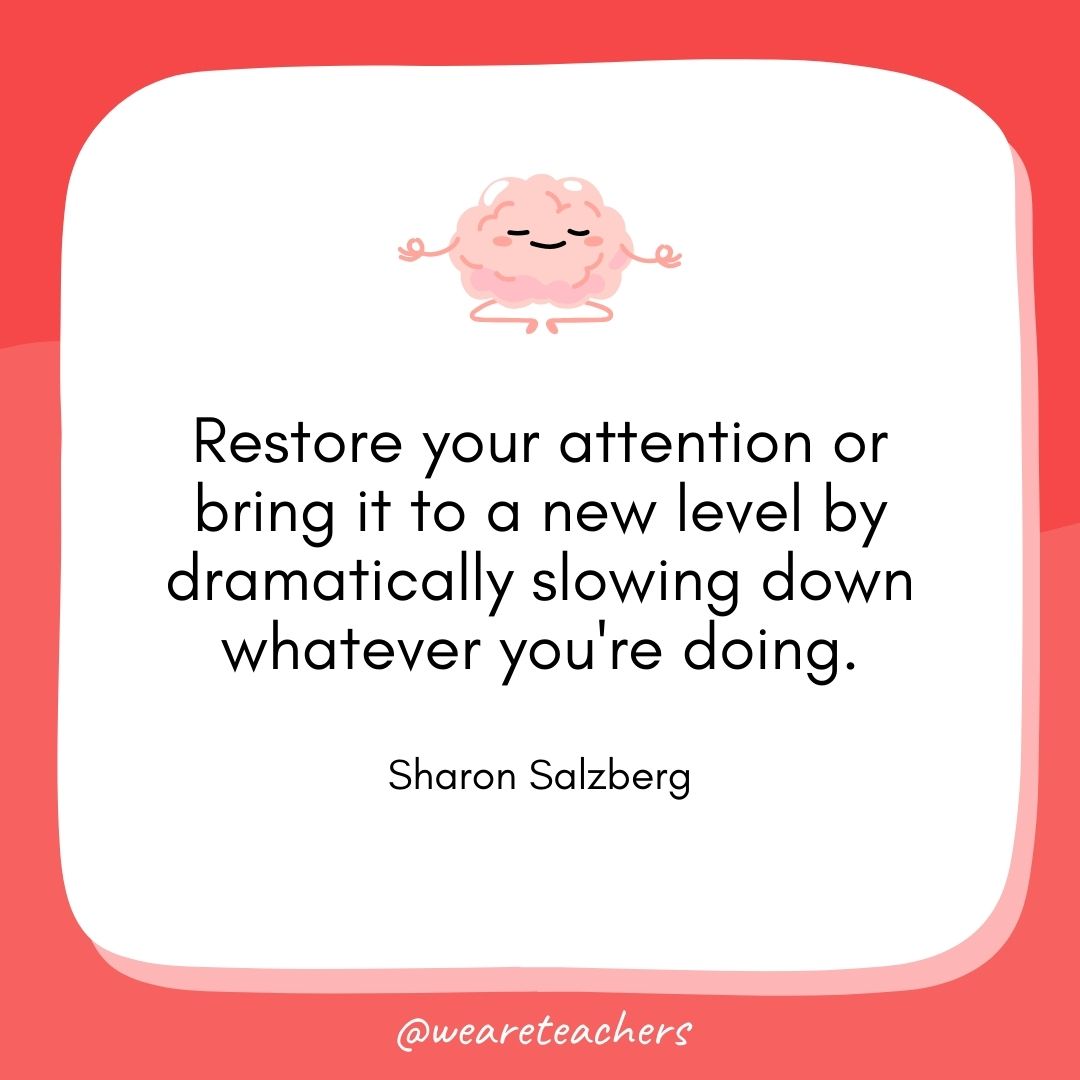
104. What is most important is to find peace and to share it with others. To have peace, you can begin by walking peacefully. Everything depends on your steps. — Nhat Hanh
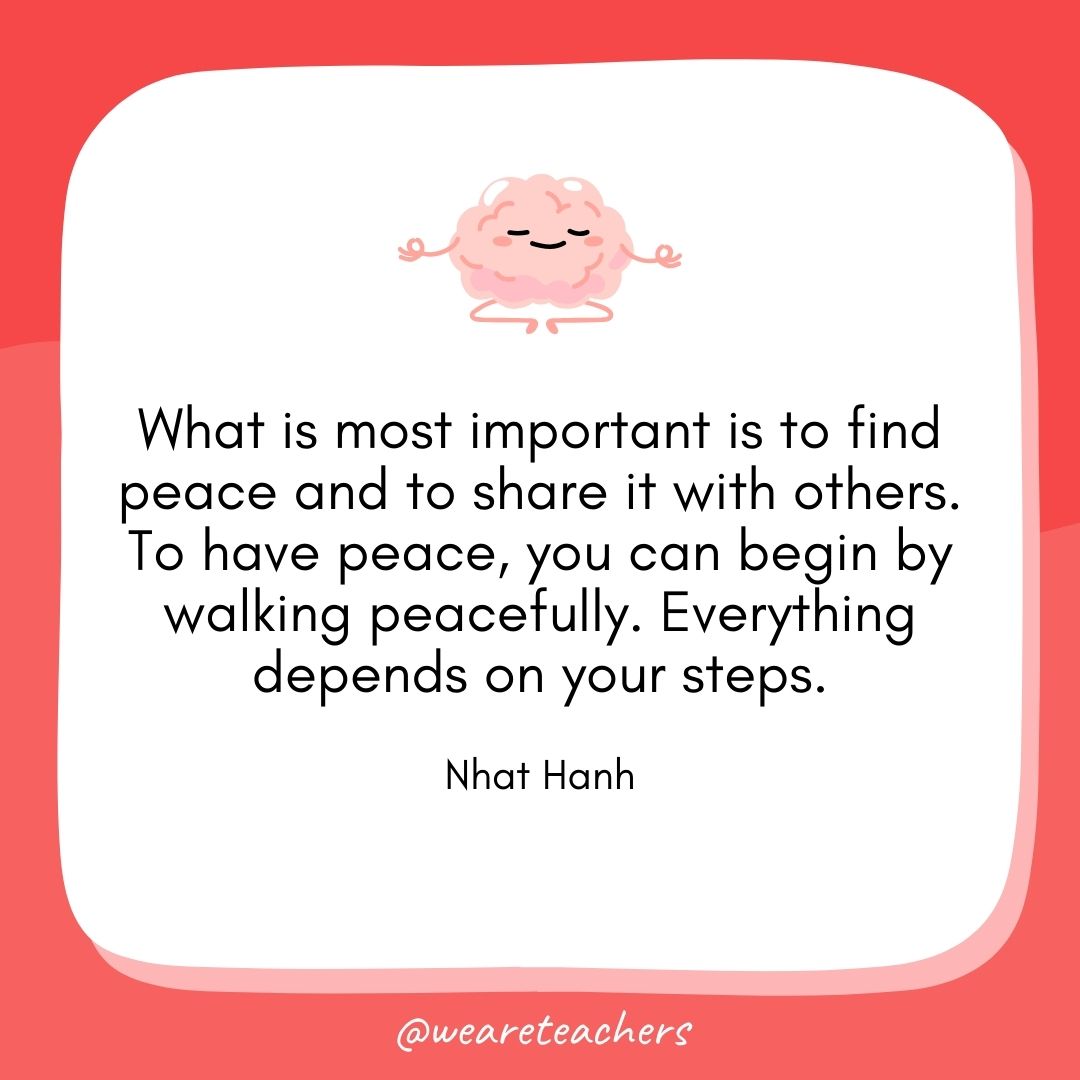
105. Only in the reality of the present can we love, can we awaken, can we find peace and understanding and connection with ourselves and the world. — Jack Kornfield

106. What lies behind us and what lies before us are but tiny matters compared to what lies within us. — Henry S. Haskins

107. When we put down ideas of what life should be like, we are free to wholeheartedly say yes to our life as it is. — Tara Brach
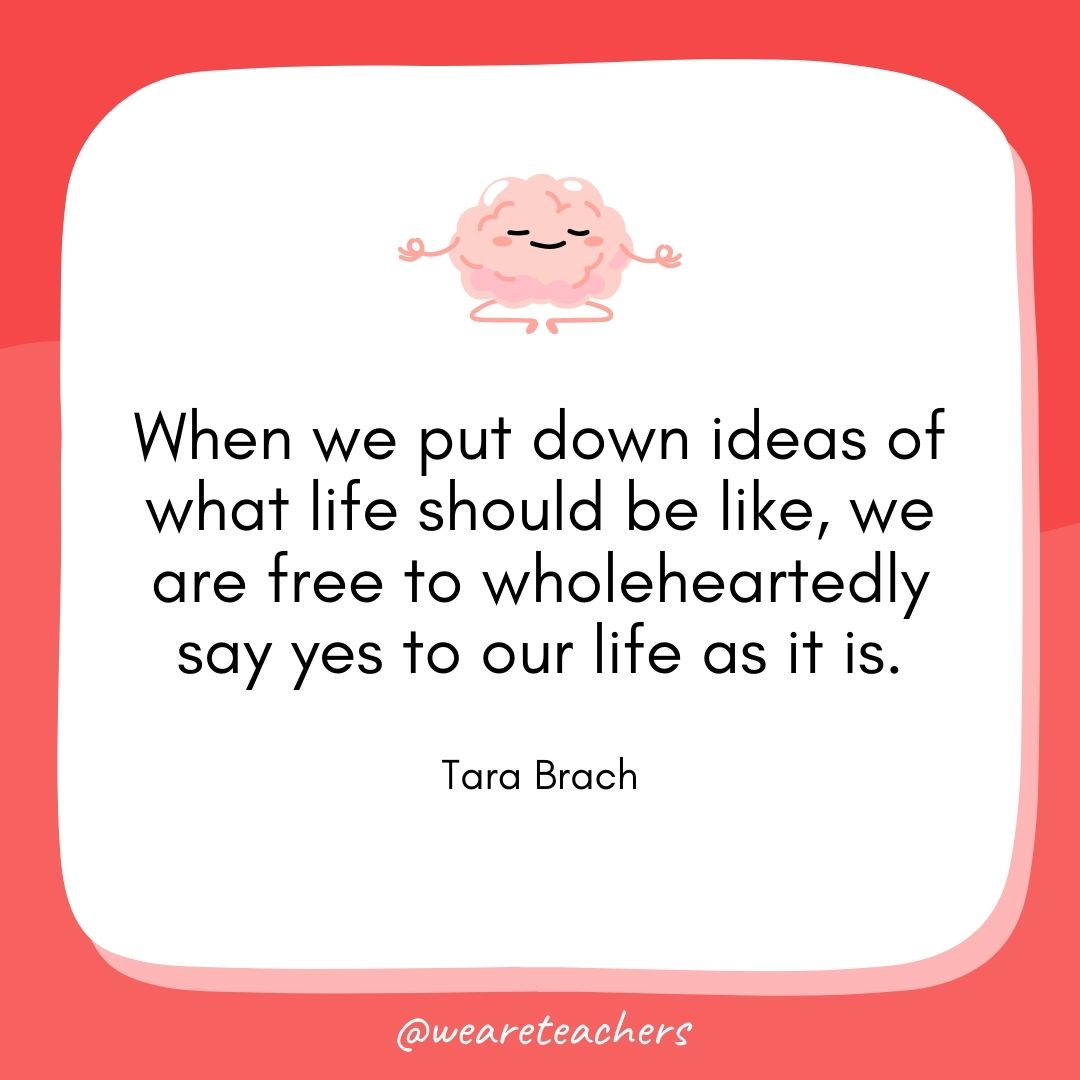
108. The moment you wake up, right away, you can smile. … You are aware that a new day is beginning, that life is offering you twenty-four brand-new hours to live, and that that’s the most precious of gifts. — Nhat Hanh
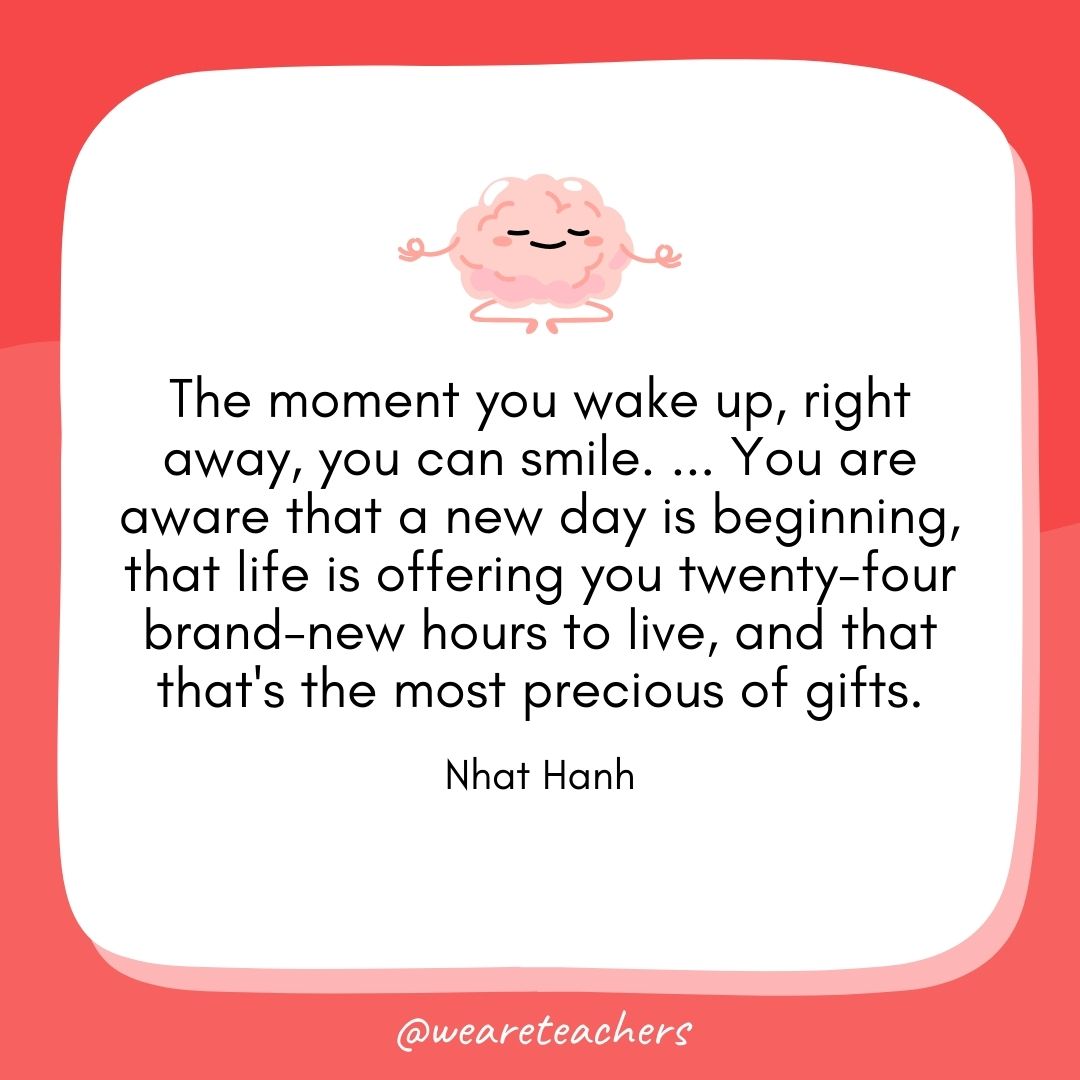
109. In those moments when we realize how much we cannot control, we can learn to let go. — Sharon Salzberg
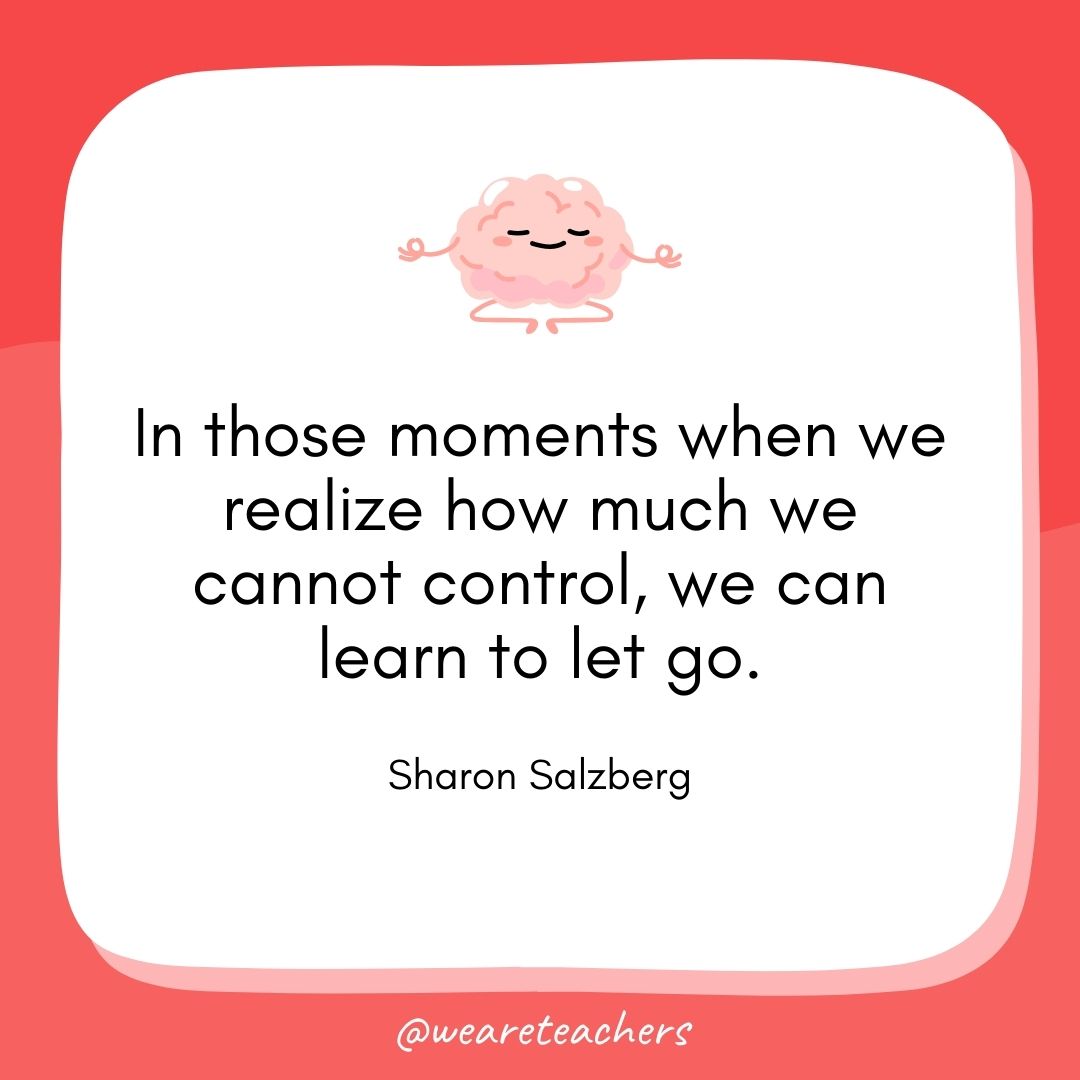
110. Come back to square one, just the minimum bare bones. Relaxing with the present moment, relaxing with hopelessness, relaxing with death, not resisting the fact that things end, that things pass, that things have no lasting substance, that everything is changing all the time—that is the basic message. — Pema Chödrön
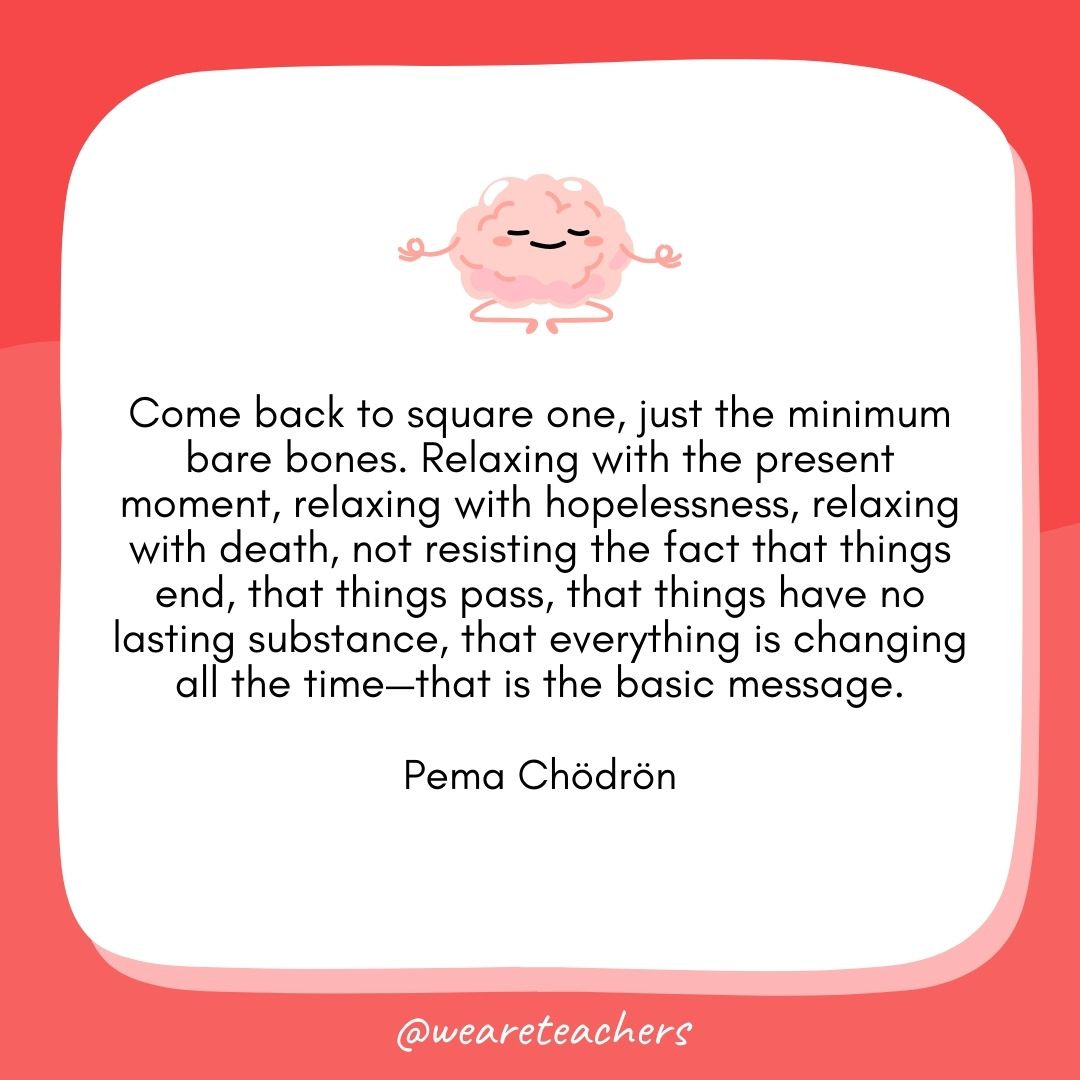
Did we miss your favorite mindfulness quotes? Let us know in the We Are Teachers HELPLINE group on Facebook!
Plus, if you loved these mindfulness quotes, check out 63 Simple Mindfulness Activities for Kids!
